

Indigo Star
Indigo star position + schiffsdaten.

Indigo Star © Facebook Indigo Star
Indigo Star Schiffsdaten
Indigo Star aktuelle Position
Die jacht indigo star: eleganz auf hoher see.
Die Jacht Indigo Star verkörpert Luxus und Raffinesse auf den Weltmeeren. Mit ihrem einzigartigen Design und exquisiten Details setzt sie Maßstäbe für anspruchsvolle Seereisen. Erfahren Sie mehr über dieses maritime Meisterwerk.
Design und Ausstattung
Die Indigo Star ist ein wahres Kunstwerk der Ingenieurskunst und Designästhetik. Ihre schlanken Linien und das hochglanzpolierte Äußere ziehen die Blicke auf sich, während das Interieur eine Oase der Entspannung und des Komforts bietet. Jeder Raum ist mit feinsten Materialien und handgefertigten Details ausgestattet, die höchste Standards erfüllen.
Technische Spezifikationen
Mit einer Länge von 38 Metern bietet die Indigo Star nicht nur Platz für exquisite Unterhaltungsbereiche, sondern auch für eine beeindruckende Auswahl an Wassersportausrüstung. Modernste Technologie sorgt für eine reibungslose Fahrt, während leistungsstarke Motoren Geschwindigkeit und Stabilität gewährleisten.
Innenausstattung und Komfort
Der Innenraum der Indigo Star vereint zeitlose Eleganz mit modernem Komfort. Großzügige Schlafzimmer mit en-suite Badezimmern, ein geräumiges Wohnzimmer und ein formeller Essbereich bieten den Gästen eine luxuriöse Wohnatmosphäre. Jedes Detail wurde sorgfältig kuratiert, um den Aufenthalt an Bord unvergesslich zu machen.
Die Jacht Indigo Star verkörpert den Höhepunkt des Luxus und der Eleganz auf hoher See. Mit ihrem außergewöhnlichen Design, ihrer erstklassigen Ausstattung und einem unvergleichlichen Service bietet sie ihren Gästen eine Erfahrung, die jeden Anspruch übertrifft. Ob für einen erholsamen Familienurlaub oder eine luxuriöse Feier auf See, die Indigo Star setzt neue Maßstäbe für maritime Exzellenz.
Was Kostet die Yacht der Geissens zur Miete?
Auf der Webseite „indigostar.de“ kann man die Yacht, während der Hauptsaison für 85.000 € zzgl. TVA + APA für eine Woche Buchen. Für Charter Anfragen können sie auf der Internetseite eine Anfrage senden.
Indigo Star Video

Oktoberfest auf hoher See: Das bayerische AIDA Special für 2025 steht fest
12. September 2024

Baufortschritt der Mein Schiff Relax
11. September 2024

Star Clippers setzt für 2025 und 2026 die Segel
6. September 2024

Hallo Deutschland: TV-Filmteam an Bord des Flaggschiffs von nicko cruises

Plantours: Mit 160 neuen Fluss-Kreuzfahrten in die Saison 2025
2. September 2024
Neueste Beiträge

Südamerika per Kreuzfahrt: Entdecke die Vielfalt eines Kontinents

Warum Ponant für eine Kreuzfahrt wählen?
23. August 2024

Australien und Neuseeland: Eine Kreuzfahrt durch die Wunder der Südhalbkugel
19. August 2024
Unsere Empfehlung
Letzte Aktualisierung am 19.09.2024 / Affiliate Links / Bilder von der Amazon Product Advertising API
Das größte Kreuzfahrtschiff der Welt

NEUE KREUZFAHRTSCHIFFE
- Disney Treasure
- MSC Euribia
- MSC Seascape
- MSC Virtuosa
- MSC Seashore
- Odyssey of the Seas
- Celebrity Apex
- MSC Grandiosa
- Costa Smeralda
Anlauflisten 2024
Kreuzfahrtschiffe in Hamburg
Kreuzfahrtschiffe in Kiel
Kreuzfahrtschiffe in Warnemünde
- Kreuzfahrtblog
- Kreuzfahrt-News
essay on importance of social science
Top 10 business schools in australia.
- ClearPath Institute and LCWU Forge Partnership to Enhance Oral Health
- FCCU Hosts Annual Faculty Retreat on AI and Campus Culture
- Human Appeal Brings Light to Lahore’s Most Vulnerable
12 Highest Paying College Majors in 2024
- HBS Delegation Engages with COAS at GHQ
- Columbia Removes Suspension of Gaza Protesters
- How to Secure a Scholarship in UK?
- Islamic Relief Pakistan Awards Scholarships to UAJK Students
- CEJ-IBA and Bank Alfalah Launch Scholarships

The Importance of Social Sciences in Our Society
- by Academia Mag
- March 29, 2024
- 5 months ago

Have you ever thought about the importance of social sciences in our society? In the intricate fabric of human society, the threads of social sciences form the very essence of understanding, interpreting, and shaping our collective narrative. From the dynamics of interpersonal relationships to the complexities of global governance, social sciences illuminate the paths of our past, present, and future. In this article, we have discussed the importance of social sciences in our society. In this article, we delve into the significance of social sciences in untangling the mysteries of society and fostering meaningful progress.
Understanding Human Behavior
At the heart of social sciences lies the study of human behavior and interaction. Through disciplines such as psychology, sociology, anthropology, and economics, we gain invaluable insights into the motivations, aspirations, and intricacies of individuals and communities. Understanding why people think, feel, and act the way they do is essential for fostering empathy, resolving conflicts, and promoting social unity.
Informing Policy and Governance
Social sciences serve as beacons of enlightenment for policymakers and governance structures. By analyzing social trends, cultural norms, and economic patterns, researchers in these fields offer evidence-based recommendations for addressing societal challenges and advancing the common good. Whether it’s crafting fair healthcare policies, designing sustainable urban environments, or reducing the impacts of climate change, social sciences provide the compass for navigating the complex territory of public decision-making.
Promoting Cultural Awareness and Diversity
In an increasingly interconnected world, cultural diversity is both a source of enrichment and a challenge to be understood. Social sciences play a pivotal role in fostering cultural awareness, celebrating diversity, and challenging stereotypes. Through the lenses of anthropology and cultural studies, we explore the richness of human traditions, languages, and belief systems, fostering mutual respect and cross-cultural understanding.
Advancing Social Justice and Equity
The pursuit of social justice and equity lies at the core of many social sciences disciplines. By shining a spotlight on issues of inequality, discrimination, and marginalization, researchers and activists work tirelessly to advocate for change and challenge systemic injustices. From the civil rights movement to contemporary struggles for gender equality, social sciences provide the intellectual framework for organizing collective action and driving meaningful societal transformation.
Forecasting Trends and Shaping the Future
In a world characterized by rapid change and uncertainty, social sciences offer invaluable tools for anticipating future trends and shaping strategic responses. Whether it’s predicting demographic shifts, forecasting economic developments, or understanding the impacts of technological innovation, researchers in social sciences provide invaluable foresight for individuals, organizations, and policymakers alike.
The complexities of the modern world and the importance of social sciences in our society cannot be overstated. From unlocking the mysteries of human behavior to informing policy decisions, promoting cultural understanding, advancing social justice, and shaping the contours of our shared future, social sciences serve as the bedrock of a more enlightened and inclusive society. By investing in research, education, and public engagement in these critical fields, we can empower ourselves to confront the challenges of the time with wisdom, compassion, and precaution.
Well, we hope this article helped you learn and understand the importance of social sciences in our society. What are your thoughts and views on the importance of social sciences in our society? Share your thoughts and views on the importance of social sciences in our society with us in the comments section below!
Other than the Importance of Social Sciences in Our Society,you can also read The Importance of Literature in Modern Society
Share this:, discover more from academia magazine.
Subscribe to get the latest posts sent to your email.
Type your email…
Share This Post:
Iba students walk out of coca-cola recruitment drive, gcu seminar amplifies student voices for palestine and kashmir.
There are no reviews yet.
Be the first to review “The Importance of Social Sciences in Our Society” Cancel reply
Your email address will not be published.
Recommendation:
Notify me of follow-up comments by email.
Notify me of new posts by email.
Related Post

Are Graphic Designers Losing Their Jobs Due to

Top 10 Medical Colleges in Canada

Why is teaching students about democracy important?

Subscribe now to keep reading and get access to the full archive.
Continue reading
Home — Essay Samples — Sociology — Social Science — Importance of Social Science in Our Daily Life
Importance of Social Science in Our Daily Life
- Categories: Social Science
About this sample

Words: 672 |
Published: Sep 7, 2023
Words: 672 | Page: 1 | 4 min read

Cite this Essay
Let us write you an essay from scratch
- 450+ experts on 30 subjects ready to help
- Custom essay delivered in as few as 3 hours
Get high-quality help

Verified writer
- Expert in: Sociology

+ 120 experts online
By clicking “Check Writers’ Offers”, you agree to our terms of service and privacy policy . We’ll occasionally send you promo and account related email
No need to pay just yet!
Related Essays
1 pages / 519 words
3 pages / 1166 words
4 pages / 1745 words
2 pages / 1097 words
Remember! This is just a sample.
You can get your custom paper by one of our expert writers.
121 writers online
Still can’t find what you need?
Browse our vast selection of original essay samples, each expertly formatted and styled
Related Essays on Social Science
The political landscape of the United States has evolved significantly over the past few decades. Among the most notable shifts is the emergence of a new generation of left-leaning individuals who are more vocal, more radical, [...]
Science is often perceived as a systematic enterprise that builds and organizes knowledge in the form of testable explanations and predictions about the universe. For many, it is a discipline confined to laboratories and [...]
Nordstrom is a well-known American luxury department store chain that was founded in 1901 by John W. Nordstrom and Carl F. Wallin. Over the years, Nordstrom has established itself as a leading retailer in the fashion industry, [...]
Penelope Eckert and Sally McConnell-Ginet's essay, "Learning to Be..." delves into the complex and multifaceted nature of gender identity and its development. The authors explore the ways in which individuals learn to perform [...]
In her essay “Visual Pleasure and Narrative Cinema”, Laura Mulvey argues that a movie audience derives pleasure from the artform by identifying themselves in the characters on screen (Mulvey, 3). Like cinema, the theatre [...]
John Boorman's epic movie Deliverance has long been portrayed as the ultimate 'macho' movie; a rite of passage that separates the 'men from the boys', glorifying strength and physical prowess over ethics and decency. However [...]
Related Topics
By clicking “Send”, you agree to our Terms of service and Privacy statement . We will occasionally send you account related emails.
Where do you want us to send this sample?
By clicking “Continue”, you agree to our terms of service and privacy policy.
Be careful. This essay is not unique
This essay was donated by a student and is likely to have been used and submitted before
Download this Sample
Free samples may contain mistakes and not unique parts
Sorry, we could not paraphrase this essay. Our professional writers can rewrite it and get you a unique paper.
Please check your inbox.
We can write you a custom essay that will follow your exact instructions and meet the deadlines. Let's fix your grades together!
Get Your Personalized Essay in 3 Hours or Less!
We use cookies to personalyze your web-site experience. By continuing we’ll assume you board with our cookie policy .
- Instructions Followed To The Letter
- Deadlines Met At Every Stage
- Unique And Plagiarism Free
Home > Blog > Tips for Online Students > Why Is Social Studies Important? 8 Reasons To Study
Tips for Online Students , Tips for Students
Why Is Social Studies Important? 8 Reasons To Study
Updated: August 15, 2024
Published: May 23, 2020

Social studies. We all have to take it, and teachers have to teach it. But why? What aspects of social studies make it so important that it is always included? Social studies is a discipline that includes humanities such as geography, history, and political science. Why is social studies important? Let’s explore why.
“The primary purpose of social studies is to help young people make informed and reasoned decisions for the public good as citizens of a culturally diverse, democratic society in an interdependent world.”
– National Council for Social Studies
What Is Social Studies?
Social studies, often called social sciences, is a field that explores human behavior, relationships, resources, and institutions. It’s an interdisciplinary subject combining geography, anthropology, economics , history , sociology , political science , and civics to offer a comprehensive understanding of society.
Social studies goes beyond memorizing historical dates or political theories. It promotes critical thinking and cultural awareness and prepares students to be informed, active citizens. By studying social studies, you learn to analyze complex issues, understand diverse perspectives, and develop skills for effective civic participation.
The goal of social studies education is to instill values like justice, equality, and respect for diversity. It encourages students to think critically about their role in society and the impact of their actions, nurturing individuals who can contribute positively to their communities and the broader world.
Photo by NeONBRAND on Unsplash
8 reasons why social studies is important for students.
Students learn skills through social studies that help them succeed in further education as well as life. Here are all the amazing ways learning social studies benefits kids and society together:
1. Better Reading And Learning
Social studies is one area in education where content integration is key. Students are given reading material that corresponds with the current learning topics. Giving reading materials in context helps students become better readers. They also become better learners because they are asked to use analysis, critical thinking , and writing to show understanding.
2. Citizen Responsibilities And Values
How can we expect young people to contribute positively to society, engage in discourse, and thrive in a democratic society if they are not exposed to the topics and aspects of history and life that made society the way it is? Students need an understanding of history, political science, culture, and all humanities to be able to understand why it is important to be a good citizen.
3. Cultural Understanding
Students should be exposed to cultures far beyond what they experience personally every day. Not every student has the opportunity to interact with other cultures on a daily basis. We need students to learn about, understand, and appreciate cultural differences if we expect them to have meaningful interactions with people of all backgrounds in the future.
4. Economic Education
Economics is a crucial part of social studies, whether studied on its own, or as a part of history, anthropology, or political science. By learning economics, young people understand how their financial decisions have an impact on their future, as well as the future of society.
Photo by Element5 Digital on Unsplash
5. critical thinking.
Critical thinking is a part of social studies — students are taught to evaluate others’ decisions and make connections between influences and circumstances. Young people get the opportunity to learn from others’ mistakes through social sciences.
6. Real-World Understanding
Studying social sciences gives students an understanding of the real world around them. Students learn about places, cultures, and events around the world, what conspired to make them the way they are, and can make inferences about how the rest of the world works.
7. Political Skills
From social studies classes, students learn about government, political ideas, country economy and resources, and more. Students gain political skills by analyzing and evaluating existing systems and imaging the future of the place in which they live.
8. Respect History
History is what made the world the way it is, and it is essential that people study it in order to have an appreciation for and understanding of the way the world works. Learning about history is what makes it possible to learn from the past and plan for the future.
Photo by Hal Gatewood on Unsplash
Qualities of purposeful social studies.
For social studies to be truly effective, it should embody certain key qualities. These attributes ensure that the subject educates, engages, and inspires you. Here are the essential qualities of purposeful social studies:
- Meaningful: Social studies should address relevant topics that resonate with students’ lives and interests, making the subject more engaging and impactful.
- Integrative: This discipline should connect various subjects and real-world experiences, showing how historical events, current affairs, and cultural practices interlink.
- Value-Based: Emphasizes core democratic values such as opportunity, equality , justice, and freedom of speech, helping students understand and appreciate their societal roles.
- Challenging: Encourages critical thinking and in-depth analysis of social issues, prompting students to question, evaluate, and form their own informed opinions.
- Active: Engages students with interactive activities like debates, discussions, and simulations, making learning dynamic and helping them apply their knowledge to real-world situations.
Bottom Line
Social studies is vital to understanding our world and our place in it. By studying history, geography, economics, and political science, we learn how societies function and evolve. This knowledge helps us appreciate cultural diversity, engage responsibly in our communities, and develop critical thinking skills essential for navigating life’s challenges.
Through social studies, we learn to make informed decisions, understand the complexities of global issues, and see the connections between our actions and the broader world. It equips us to contribute positively to society and fosters a sense of empathy and civic responsibility. As we continue to value and explore social studies, we become better equipped to address the challenges of today and build a more informed, cohesive, and just world for tomorrow.
For those interested in furthering their education in social studies, University of the People offers accessible, tuition-free programs designed to help you make a meaningful impact in your community and beyond.
What is social studies?
Social studies is an academic discipline that explores human society and social relationships. It encompasses various fields, such as history, geography, political science, economics, sociology, and anthropology, to comprehensively understand how societies function and interact.
Why is social studies important in the school curriculum?
Social studies is crucial in the school curriculum because it helps students understand the world around them. By teaching them about history, culture, economics, and politics, social studies prepares them to become informed, responsible citizens. This knowledge fosters critical thinking, cultural awareness, and civic engagement.
How does social studies benefit students?
Social studies benefit students by developing their analytical and critical thinking skills. They enhance their understanding and evaluation of information, making informed decisions, and appreciating different cultures and perspectives. They also help them understand their role in society and the importance of civic participation.
What are the key topics covered in social studies?
Key topics in social studies include history, geography, economics, political science, sociology, and anthropology. These subjects cover many areas, such as historical events, cultural practices, economic systems, political structures, and social interactions, providing a well-rounded understanding of society.
How can studying social studies influence future career paths?
Studying social studies can open doors to various career paths, such as education, public policy, law, international relations, social work, and journalism. The skills and knowledge gained from social studies, including critical thinking, research, and communication, are highly valued in many professions.
In this article
At UoPeople, our blog writers are thinkers, researchers, and experts dedicated to curating articles relevant to our mission: making higher education accessible to everyone. Read More
Why is Sociology Important? The Cornerstone of the Social Sciences
Editorial note.
Thank you to our generous sponsors, Sociologists for Women in Society , Center for Equity Education , Azama Development Foundation , and Sociological Practice & Public Sociology (SPPS) – American Sociological Association (ASA) for helping us make Applied Worldwide’s 2023 “Why is Sociology Important?” student essay competition a success!
This sociology essay was written by Hassana Idris, a 4th year student in home economics at Ahmadu Bello University, Zaria in Nigeria and earned a 3rd place prize in the competition.
Why is Sociology Important? The Cornerstone of the Social Sciences, Hassana Idris
Throughout history, humanity has always lived in societies, but prior to the emergence of sociology, the study of society lacked a scientific foundation. Sociology introduced a systematic approach to understanding social relationships, focusing on their social nature. It investigates how relationships form systems and adapt to change, employing scientific methods like objectivity, observation, and empiricism. Auguste Comte, credited as the discipline’s founder, once referred to sociology as the “religion of humanity.”
Sociology, though relatively young among the social sciences, is a multifaceted and broad field within the humanities. It examines various aspects of human behavior and society, encompassing topics such as family, crime, culture, religion, race, and conflict. In its analysis, sociology employs both macro and micro-level approaches to understand human behavior and society. It applies scientific methodologies, including objectivity, observation, empiricism, and others, to study these subjects comprehensively.
Sociology offers a wide array of theories, including social conflict theory, functionalism, and symbolic interactionism, each providing unique insights into society. It boasts a rich history of scholars like Auguste Comte, Karl Marx, Emile Durkheim, Max Weber, and many more.
Sociology’s holistic, empirical, and interconnected approach to societal issues has elevated its significance, making it the preferred approach across the social sciences. As Anthony Giddings noted, sociology guides individuals in understanding themselves, their abilities, talents, and limitations. It helps them adapt to their environment by providing knowledge about society, social groups, institutions, and their functions.
One of the most significant sociological theories, as highlighted by Crossman, is functionalism. It views society as a complex system where parts work together to promote unity and stability. Social structures, such as family, community, and religious practices, shape our lives and provide structure to our daily routines.
In contrast, conflict theory, as articulated by Chafetz in 1997, challenges functionalism. It posits that societies and organizations are structured to benefit a privileged elite, leading to social hierarchies and power imbalances. Major social structures, laws, and traditions are designed to support those in power, perpetuating inequalities.
Society is an intricate phenomenon with countless complexities. Understanding and solving its myriad problems would be impossible without sociology’s support. Sociology’s systematic investigation is essential for effective social planning and finding efficient means to achieve agreed-upon goals. Knowledge about society is a prerequisite for implementing social policies. The contemporary world faces numerous challenges, and sociology’s scientific approach is essential for studying and solving social problems.
Sociology has enriched human culture by providing a scientific understanding of social phenomena. It encourages rational thinking, objectivity, critical analysis, and empathy. By comparing societies and groups beyond one’s own existence, sociology broadens one’s perspective, promoting tolerance and unity while urging individuals to overcome personal biases, ambitions, and class prejudices.
While physical sciences have brought nations closer, social sciences have lagged behind in addressing political divisions and conflicts. Sociology offers insights into the underlying causes of tensions and conflicts, contributing to better citizenship and community problem-solving. It enhances our understanding of society, our place within it, and the pursuit of social adequacy.
Many consider sociology the cornerstone of the social sciences, making it a key study for addressing present-day challenges. Sociology has a universal appeal due to its relevance to a wide range of critical issues. Just as economics guides us in acquiring material possessions, sociology guides us in becoming the individuals we aspire to be. It’s a popular subject in education, included in fields such as engineering and agriculture. Without sociology, the training and knowledge of individuals aspiring to hold high positions in their country’s administrative setup would be incomplete.
The family, as a fundamental human organization, faces its own set of challenges. Sociologists and social reformers grapple with issues like the appropriate age for marriage, divorce procedures, and the dynamics of marital relationships. Sociology offers a fresh perspective on various aspects of life, from relationships and work to crime and social mobility. It encompasses a wide range of topics, offering diverse career opportunities in fields like social service, criminal justice, community outreach, ministry, social activism, higher education administration, urban planning, and more.
In summary, sociology distinguishes itself by using theoretical frameworks and empirical research methods to study social life, change, structure, and the causes and consequences of human behavior across diverse social contexts. As a social science, sociology equips individuals for a variety of careers, providing the foundational knowledge needed to comprehend social issues, including inequality and criminology, in various social and work settings. It prepares individuals to navigate the challenges and opportunities encountered in their pursuit of a fulfilling life.
Meet our 2023 Global Student Essay Competition Sponsors!
Azama Development Foundation is a Non-governmental organization that actively works towards the development of youths and women to be self-reliant and productive. Our mission is to transform the lives of youths and women from all over Africa to be self-reliant and productive actively contributing to national economy, education and development, thereby eradicating poverty, illiteracy and lack of enlightenment in the region.
You Might Also Like
Using sociology for social change: applied sociology, hate is a virus: anti-asian racism during covid-19, the social impacts of coronavirus on families in nigeria, creating world peace: sociology is the first step, why is sociology important 4 reasons to lean on sociology, the importance of sociology and its intersection with history.

1 What are the social sciences?
Learning Objectives for this Chapter
After reading this Chapter, you should be able to:
- understand what the social sciences are, including some fundamental concepts and values,
- understand and apply the concept of ‘phronesis’ to thinking about the purpose and value of the social sciences.
History and philosophy of the social sciences
Some of the earliest written and spoken accounts of human action, values, and the structure of society can be found in Ancient Greek, Islamic, Chinese and indigenous cultures. For example, Ibn Khaldoun , a 14th-century North African philosopher, is considered a pioneer in the field of social sciences. He wrote the book Muqaddimah , which is regarded as the first comprehensive work in the social sciences. It charts an attempt to create a universal history based on studying and explaining the economic, social, and political factors that shape society and discussed the cyclical rise and fall of civilisations. Moreover, indigenous peoples across the world have contributed in various and significant ways to the development of scientific knowledge and practices (e.g., see this recent article by Indigenous scholar, Jesse Popp – How Indigenous knowledge advances modern science and technology ). Indeed, contemporary social science has much to learn from indigenous knowledges and methodologies (e.g., Quinn 2022 ), as well as much reconciling to do in terms of its treatment of indigenous peoples the world over (see Coburn, Moreton-Robinson, Sefa Dei, and Stewart-Harawira, 2013 ).
Nevertheless, the dominant Western European narrative of the achievements of the enlightenment still tends to overlook and discredit much of this knowledge. Additionally, male thinkers have tended to dominate within the Western social sciences, while women have historically been excluded from academic institutions and their perspectives largely omitted from social science history and texts. Therefore, much of the history of the social sciences represent a predominantly white, masculine viewpoint. That is not to say that the concepts and theories developed by these male social scientists should be outright discredited. Nevertheless, in engaging with them we must understand this context; they are not the only voices, nor necessarily the most important. Indeed, it is crucial therefore that the history of the social sciences is continually re-examined through a critical lens, to identify gaps within social scientific knowledge bases and allow space for critical revisions that broaden existing concepts and theories beyond an exclusively masculine, Western-centric perspective. We seek to adopt such an approach throughout this book. However, to critique and question Western social scientific perspectives, we must first understand them.
Social sciences in the Western world
The study of the social sciences, as developed in the Western world, can be said to emerge from the Age of Enlightenment in the late 17th Century. Beginning with René Descartes (1596-1650), both the natural and social sciences developed from the concept of the rational, thinking individual. These early Enlightenment thinkers argued that human beings use reason to understand the world, rather than only referring to religion. Other thinkers around this time such as Jean-Jacques Rousseau (1712-1778), M. de Voltaire (1694-1778) and Denis Diderot (1713-1784), began to develop different methodologies to scientifically explain processes in the body, the structure of society, and the limits of human knowledge. It was during this period that the social sciences grew out of moral philosophy, which asks ‘how people ought to live’, and political philosophy, which asks ‘what form societies ought to take’. Rather than only focusing on descriptive scientific questions about ‘how things are’, the social sciences also sought answers to normative questions about ‘how things could be’. This is one of the central differences between the natural sciences and the social sciences. This era of Enlightenment marked an important turning point in history that gave way to further developments in both the natural and social sciences.
Immanuel Kant (1724-1804) is often regarded as one of the most influential philosophers for the development of the social sciences. In his work, Kant develops an epistemology that accounts for the objective validity of knowledge, due to the capacities of the human mind. In other words, how can we as individual people come to know facts about the world that are true for all of us. Social scientists, such as Émile Durkheim (1858-1917) and Max Weber (1864-1920) critically developed the work of Kant to explain social relations between individuals.
Émile Durkheim prioritised the validity of social facts over the values themselves, continuing the tradition of ‘ positivism ‘ (an ontological position that we discuss later in this Chapter). Durkheim argued that there is a distinction between social facts and individual facts. Rather than viewing the structure of the human mind as the basis for knowledge like Kant, Durkheim argued that it is society itself that forms the basis for the social experience of individuals. Social facts should therefore, “be treated as natural objects and can be classified, compared and explained according to the logic of any natural science” (Rose, 1981: 19). Durkheim developed his methodology using analogies to the natural sciences. For example, he borrowed concepts from biology to understand society as a living organism.
TRIGGER WARNING
The following section contains content which may be triggering for certain people. It focuses on the sociology of suicide, including discussion of self-harm and different forms of suicide as it exists within society.
Durkheim and Suicide
Emile Durkheim’s 1879 text ‘Suicide: a Study in Sociology’ is a foundational work for the study of social facts. Durkheim explores the phenomenon of suicide across different time periods, nationalities, religions, genders, and economic groups. Durkheim argues that the problem of suicide can not be explained through purely biological, psychological or environmental means. Suicide must, he concludes, “necessarily depend upon social causes and be in itself a collective phenomenon” (Durkheim 1897: 97). It was and continues to be a work of great impact that demonstrates that, what most would consider an individual act is actually enmeshed in social factors.
In his text, Durkheim identifies some of the different forms suicide can take within society, four of which we discuss below.
Egoistic Suicide
Egoistic suicide is caused by what Durkheim terms “excessive individuation” (Durkheim 1897: 175). A lack of integration within a particular community or society at large leads human beings to feel isolated and disconnected from others. Durkheim argues that “suicide increases with knowledge”(Durkheim 1897: 123). This is not to say that a particular human being kills themselves because of their knowledge; rather it is because of the decline of organised religion that human beings desire knowledge outside of religion. It is thus, for Durkheim the weakening organisation of religion that detaches people from their (religious) community, increasing social isolation. According to Durkheim, the capacity of religion to prevent suicide does not result from a stricter prohibition of self-harm. Religion has the power to prevent someone from committing suicide because it is a community, or a ‘society’ in Durkheim’s words. The collective values of religion increases social integration and is just one example of the importance of community in decreasing rates of suicide. Isolation of individuals, for Durkheim, is a fundamental cause of suicide: “The bond attaching man [sic] to life relaxes because that attaching him [sic] to society is itself slack” (Durkheim 1897: 173).
Altruistic Suicide
Durkheim notes another kind of suicide that stems from “insufficient individuation” (Durkheim 1897: 173). This occurs in social situations where an individual identifies so strongly with their beliefs of a group that they are willing to sacrifice themselves for what they perceive to be the greater good. Examples of altruistic suicide include suicidal sacrifice in certain cultures to honour their particular God, soldiers who go to war and die in honour of their country, or the ancient tradition of Hara-kiri in Japan. As such, Durkheim notes that some people have even refused to consider altruistic suicide a form of self-destruction, because it resembles “some categories of action which we are used to honouring with our respect and even admiration”(Durkheim 1897: 199).
Anomic Suicide
The third kind of suicide Durkheim identifies is termed anomic suicide. This type is the result of the activity of human beings “lacking regulation”, and “the consequent sufferings” that are felt from this situation (Durkheim 1897: 219). Durkheim notes the similarities between egoistic and anomic suicide, however he notes an important distinction: “In egoistic suicide it is deficient in truly collective activity, thus depriving the latter of object and meaning. In anomic suicide, society’s influence is lacking in the basically individual passions, thus leaving them without a check-rein” (Durkheim 1897: 219).
Fatalistic Suicide
There is a fourth type of suicide for Durkheim, one that has more historical meaning than current relevance. Fatalistic suicide is opposed to anomic, and is the result of “excessive regulation, that of persons with futures pitilessly blocked and passions violently choked by oppressive discipline” (Durkheim 1897: 239). These regulations occur during moments of crises, including economic and social upheaval, that destabilise the individual’s sense of meaning. It is the impact of external factors onto the individual, where meaning is thrown to the wind for the individual, that characterises fatalistic suicide.
Durkheim’s sociological study of suicide was a groundbreaking work for social sciences. His methodology, multivariate analysis, provided a way to understand numerous interrelated factors and how they relate to a particular social fact. His findings, particularly the higher suicide rates of Protestants, compared to Jewish and Catholic people, was correlated to the higher rates to individualised consciousness and the lower social control. This study, despite criticisms of the generalisations drawn from the results, has had a remarkable impact on sociology and remains a seminal text for those interested in the social sciences.
Max Weber was also influenced by the work of Kant. Unlike Durkheim, Weber “transformed the paradigm of validity and values into a sociology by giving values priority over validity” (Rose, 1981: 19). Culture is thus understood as a value that structures our understanding of the world. According to Weber, values cannot be spoken about in terms of their truth content. The separation between values and validity means that values can only be discussed in terms of faith rather than scientific reason. For Weber, only when a culture’s underpinning values are defined can facts about the social world be understood.
The philosophy of G.W.F. Hegel (1770-1831) also greatly shaped the development of the social sciences. As argued by Herbert Marcuse (1941: 251-257), Hegel instigated the shift from abstract philosophy to theories of society. According to Hegel, human beings are not restricted to the pre-existing social order and can understand and change the social world. Our natural ability to reason allows human beings to create theories about our world that are universal and true.
Karl Marx (1818-1883), often regarded as the founder of conflict theory, was deeply influenced by the philosophy of Hegel. For example, Hegel emphasises that labour and alienation are essential characteristics of human experience, and Marx applies this idea more concretely to a material analysis of society, dividing human history along the lines of the forces of production. In other words, Marx understood that labour was divided in capitalist society according to two classes that developed society through a perpetual state of conflict: the working class, or ‘ proletariat’ , and the class of ownership, or ‘ bourgeoisie’ (we talk more about Marx’s conflict theory in Chapter 3).
Overall, the social sciences have a long and complex history, influenced by many different philosophical perspectives. As alluded to earlier, however, any account of the historical beginnings of the social sciences must be understood to be embedded within dominant systems of power, including for example colonisation, patriarchy, and capitalism. Indeed, any history of the social sciences is already situated within a narrative, or ‘discourse’. Maintaining a critical lens will allow for a deeper understanding of the genesis of the social sciences, as well as the important ability to question social scientific approaches, understandings, findings, and methods. It is this disposition that we seek to cultivate throughout this book. After all, as Marx famously wrote, “The philosophers have only interpreted the world, in various ways. The point, however, is to change it.”
Defining Key Terms
Descriptive : A descriptive claim or question seeks to explain how things work, what causes them to work that way, and how things relate to one another.
Normative : A normative claim or question seeks to explain how things ought to work, why they should work a certain way, and what should change for things to work differently.
Labour : For Marx, labour is the natural capacity of human beings to work and create things. Under capitalism, labour primarily produces profits for the ruling class. (Please note, we return to the notion of labour in later chapters, and explore other understandings and definitions of this term.)
Alienation : Workers, separated from the products of their labour and replaceable in the production process, become separated or ‘alienated’ from their creative human essence. (Please also see Chapter 3 for a further explanation of the concept of alienation under Marxism.)
What are the social sciences?
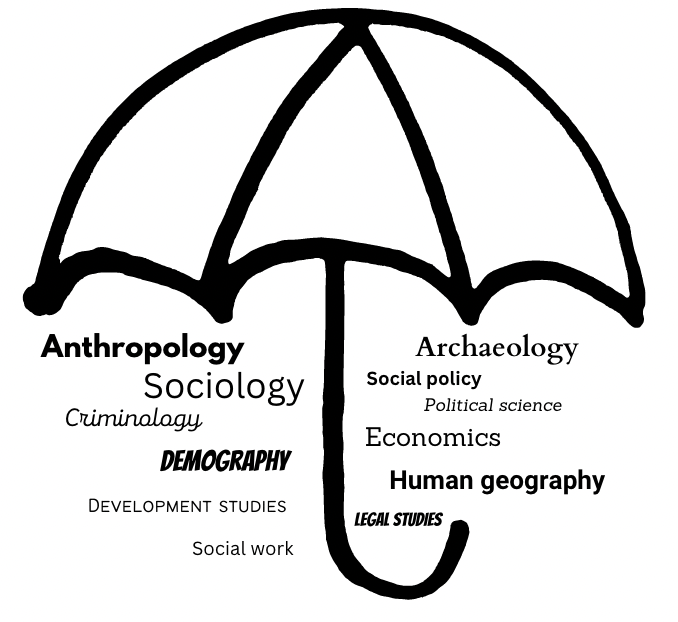
The social sciences are a ‘broad church’, including lots of different disciplinary and sub-disciplinary areas. These include, for example, sociology, anthropology, criminology, archaeology, social policy, human geography, and many more. At their core, they apply the ‘scientific method’ to the analysis of people, societies, power, and social change.
Before we move on, let’s touch briefly on what we mean by the scientific method . At its core, the scientific method is essentially a series of steps that scientists take in order to build and test scientific knowledge. These steps include:
- Observation : Scientists observe the world around them, in order to better understand it.
- Question : Scientists ask ‘research questions’ about how the world works.
- Hypothesis: Scientists come up with ideas or theories about how they think the world works, which they then seek to test through their research.
- Experiment: In experimental research, scientists use a specific experimental design (which includes a control and experimental group) to test hypotheses. This is not always possible or desirable in the social sciences, so social scientists tend to rely on a broader array of methods to collect data that can help them test their hypotheses about the social world.
- Analysis: Scientists use various different approaches to analyse the data they collect; the approach to analysis depends on the kind of data collected, and what questions are being asked of the data.
- Conclusions: Scientists develop conclusions, based on the results of their analyses. They consider how these either reinforce or further develop existing knowledge and understandings, as well as what there is left to find out (the latter of which informs future research endeavours).
Over time, social scientists have developed their own ontological and epistemological leanings, which in many ways represent a departure from the typical positivist approaches of the natural sciences. While the natural sciences tend to assume there are objective ‘truths’ waiting to be discovered through, for instance, sensory experience (seeing, looking), social scientists tend to understand truth as being socially constructed. Thus, social scientists tend to adopt interpretivist and constructivist approaches to understanding the world, seeing knowledge as being co-constructed, rooted in context, and an important source/expression of power.
Consolidate your learning: ‘Introduction to the social sciences’ video
To consolidate your understanding of the social sciences, watch the following short video – Introduction to the social sciences (YouTube, 8:34) .
Flyvbjerg (2001) referred to the ‘science wars’, by which he meant the ongoing battle between the natural and social sciences. Often in public and political discourse, the natural sciences are seen as being more ‘scientific’ and a source of ‘stronger’ or ‘more objective’ knowledge than the social sciences. However, the reality is that both have equally important but different things to offer. As Flyvbjerg (2001: 3) argued:
…the social sciences are strongest where the natural sciences are weakest: just as the social sciences have not contributed much to explanatory and predictive theory, neither have the natural sciences contributed to the reflexive analysis and discussion of values and interests…
As Flyvbjerg (2001) sees it, social scientists should not try to replicate the natural sciences but should instead embrace their ability to take a different ontological and epistemological outlook, which enables deep, reflexive, and contextualised analysis about people and societies as a point of departure for values-based action . He called this ‘phronetic social science’ (which we elaborate on later in the Chapter).
Defining key terms
‘Ontology’: Ontology is the study of reality and being. When we refer to ‘ontology’, we are not just talking about people’s views of the world, but also their lived experience and actual being in the world, as well as their beliefs and claims about the nature of their existence. Some key questions are ‘what and who exists in the world?’ and ‘what are the relationships between them’?
‘Epistemology’ : Epistemology concerns the origin and nature of knowledge, including how knowledge claims are built and made. Some key questions are ‘what is knowledge?’ and ‘how is knowledge acquired’?
Positivism: Positivism is an ontology that assumes there is an objective ‘truth’ waiting to be discovered. Positivism involves, therefore, the search for a universal/generalisable ‘truth’.
Constructivism: Constructivism is an ontology that assumes that there are multiple ‘truths’ that are subjective and socially constructed. Truths are not, therefore, universal but are instead rooted in social, historical, and geographical context. These ‘truths’ are also bound up with power. For instance, those who hold power get to say what is ‘true’ and what isn’t.
In addition to the above, Argentine-Canadian philosopher Mario Bunge ‘s (2003: 285ff) glossary of key terms includes a range of ontological concepts used in the social sciences that are useful to think with:
“Definitions of Twelve Ontological Concepts
- Ontology: The philosophical study of being and becoming.
- Realism (ontological): The thesis that the world outside the student exists on its own.
- Phenomenalism (ontological): The philosophical view that there are only phenomena (appearances to someone).
- Constructivism (ontological): The view that the world is a human (individual or social) construction.
- Dialectics: The ontological doctrine, due to Hegel and adopted by Marx and his followers, according to which every item is at once the unity and struggle of opposites.
- Materialism: The family of naturalist ontologies according to which all existents are material.
- Naturalism: The family of ontologies that assert that all existents are natural-hence none are supernatural.
- Idealism. The family of ontologies according to which ideas pre-exist and dominate everything else.
- Subjectivism. The family of philosophies according to which everything is in a subject’s mind (subjective idealism).
- Holism: The family of doctrines according to which all things come in unanalyzable wholes.
- Individualism: The view that the universe is an aggregate of separate individuals: that wholes and emergence are illusory.
- Systemism (ontological): The view that everything is either a system or a component of some system.”
Source: Bunge, M. (2003). E mergence and Convergence: Qualitative Novelty and the Unity of Knowledge . University of Toronto Press. Pp. 285ff
Reflection exercise
Take a few moments to think about what you have read above. Then, write a short (~100 word) reflection explaining:
- primary ways in which the natural and social sciences differ, and
- some things that the social sciences offer that the natural sciences cannot.
Why study the social sciences?
In their 2019 publication, Carré asked, ‘what are the social sciences for’? In response, they propose a framework for thinking about the different approaches and contributions of social science research, which encompasses three continuums: 1) return on investment versus intrinsic value; 2) citizen (societal) relevance versus academic relevance; and 3) applied research versus basic research (see the Figure below, adapted from Carré [2019: 23]).
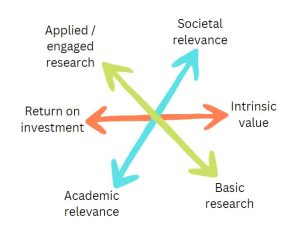
While Carré (2019) argues that social scientists move along these continuums, he also suggests that there is good justification for finding middle grounds between the extremes. For instance, while applied research will tend to focus on and find solutions for specific social issues (e.g. youth crime), ‘basic’ research tends to adopt a more high-level theoretical approach to shaping how we understand the world, which can lead to longer-term substantive change (such as changing the way we think about and understand youth crime). As Carré (2019: 22) explains: “either research is conducted to directly solve pressing social issues, or it takes a full step back from the social word, in order to reflect about it without directly meddling [and] being involved in its events and discussions.” However, both are incredibly useful for moving knowledge forward and making crucial contributions. Similarly, they can have important symbiotic relationships; applied research might be informed and guided by the knowledge created through basic research, and conversely, applied research studies might be meta-analysed (a type of combined analysis) to inform broader theoretical development that is often the purview of basic research.
A central question raised by Carré (2019) is, what should social science ‘give back’ to the society that supports it? Take a piece of paper and write down some responses to this, based on your own views and beliefs.
According to Flyvbjerg (2001), and as also covered by Schram (2012), the concept of ‘phronetic social science’ can help bring social scientists back to the central value of the social sciences, rather than seeing them try to emulate the natural sciences and their search for universal and generalisable theories and truths. Instead, phronetic social science recognises that ‘truth’ is dependent on context, is in constant flux, and is bound up with power. This is not to say that we live in a ‘post-truth’ world where anything goes, but merely that we need to interrogate how knowledge and truth are created and how societies and social structures can play a role in this. Famous sociologist, Michel Foucault (1926-1984) referred to this as a ‘politics of truth’: something we’ll continue to discuss in greater detail over coming chapters.
‘Phronetic’ social science
Phronetic social science draws on the concept of phronesis, a term coined by Aristotle (384-322 BC) to refer to practical wisdom that arises from experience. Thus, phronetic social science “is designed not to substitute for, but instead to supplement, practice wisdom and to do so in ways that can improve society” (Schram 2012: 16). In terms of improving society, phronetic social science is then also concerned with praxis, or the practical application of knowledge to the betterment of society. Finally, phronetic social science is not attached to particular methods (e.g. quantitative versus qualitative), instead being “open to relying on a diversity of data collection methods in order to best inform attempts to promote change related to the issues being studied” (Schram 2012: 20).
Schram (2012: 18-19) presents four justifications for phronetic social science as follows:
- “Given the dynamic nature of human interaction in the social world, social inquiry is best practiced when it does not seek general laws of action that can be used to predict courses of action, but instead offer a critical assessment of values, norms and structures of power and dominance. Social inquiry is better when it is linked to questions of the good life, that is, to questions of what we ought to do.
- While the social world is dynamic, social research is best seen as dialogical. Social inquiry is not a species of theoretical reason but of practical reason. Practical reason stays within a horizon of involvements in social life. For Flyvbjerg, this entails a context-dependent view of social inquiry that rests on the capacity for judgement. Understanding can never be grasped analytically; it is a holistic character. Understanding also has intrinsic subjective elements requiring researchers to forgo a disinterested position of detachment and enter into dialogue with those they study.
- As the study of dynamic social life, dialogical social inquiry is best practiced when we give up traditional notions of objectivity and truth and put aside the fact-value distinction. Instead, we should emphasise a contextual notion of truth that is pluralistic and culture-bound, further necessitating involvement with those we study.
- Dialogical social inquiry into a dynamic and changing social world provides a basis for emphasising that interpretation is itself a practice of power, one that if conducted publicly and in ways that engage the public can also challenge power and inform efforts to promote social change.”
This concept of phronetic social science is a helpful means of understanding how the social sciences differ to the natural sciences, and can add value in different ways. However, it doesn’t tell us how to do social science, or how to be social scientists. What tools, for instance, might we use to undertake the sort of dialogical social inquiry that Schram refers to above? And how might we start ‘thinking’ like social scientists? We turn to these questions in the chapter that follows.
‘Phronesis’: Described by Aristotle as ‘practical wisdom’, and juxtaposed with techn é (‘know how’ of practice) and epistem é (abstract and universal knowledge).
‘Dialogical’: Exploring the meaning of things and creating knowledge through dialogue/conversation.
‘Quantitative’ : A term used to describe research methods that typically involve measurement and counting of phenomena, regularly involving numerical data.
‘Qualitative’: A term used to describe research methods that typically involve understanding and interpretation of lived experiences (how people think, feel, act), regularly involving textual data.
Think about the concept of phronetic social science. Write a short paragraph (~30-40 words) to explain it in your own words. Then read back over the content in this chapter content to check your understanding.
Resources to support further learning
Relevant readings:
- Gorton, W. ‘ The Philosophy of Social Science .’
- Flyvbjerg, B. 2001. ‘The science wars: a way out.’ In. Flyvbjerg, B. Making social science matter, chapter 1. Cambridge University Press: Cambridge.
- Carré, D. 2019. ‘ Social sciences, what for? On the manifold directions for social research .’ In. Valsiner, J. (Ed.) Social philosophy of science for the social sciences, pp. 13-29. Springer: Cham.
- Schram, S. 2012. ‘Phronetic social science: an idea whose time has come.’ In Flyvbjerg, B., Landman, T. and Schram, S. (Eds.) Real social science: applied phronesis. Cambridge University Press: Cambridge.
- Bunge, M. (2003). E mergence and Convergence: Qualitative Novelty and the Unity of Knowledge . University of Toronto Press.
Other resources:
- Video: Soomo, ‘An animated introduction to social science’ (YouTube, 4:35) .
- Video: ‘Introduction to the social sciences’ (YouTube, 8:34) .
- Podcast: Theory and Philosophy Podcast, ‘Bent Flyvbjerg – Making Social Science Matter’ (YouTube, 44:06) . (Note, discussion of phronesis starts at 7:51)
- Video: ‘Importance of social science with Professor Cary Cooper’ (YouTube, 4:13) .
Introduction to the Social Sciences Copyright © 2023 by The University of Queensland is licensed under a Creative Commons Attribution 4.0 International License , except where otherwise noted.
Share This Book

Perspectives on social sciences (1): What are the social sciences and why do they matter?
- Guest Feature
Professor Sir Cary L. Cooper CBE FAcSS and Professor Jonathan Michie FAcSS
Social scientists analyse and describe how society functions and develops. This includes understanding the behaviour of those who make up society – individuals, families and communities; companies and other organisations; governments and regulators. It also includes considering – and predicting and influencing – the results of those behaviours, from armed conflicts and forced migration, to the climate crisis and the relation between humanity and nature.
Within the social sciences, economists focus on the ‘wealth of nations’ – and how this is generated and distributed.[2] Political scientists are concerned with ideas of power, justice, liberty and representation – and how these ideas get translated into policies that are then implemented at national and other levels. Legal scholars analyse the rules by which rights are either asserted or protected, and the processes through which people and organisations are governed. Organisational psychologists consider how people behave with one another, and how this changes individual and organisational behaviours, and how this will impact productivity and the health and wellbeing of employees. Sociologists and social anthropologists are interested in groups, communities and cultures in society and between different cultures. Geographers are concerned with geospatial differences and the interactions between people, places and environments. Of course, these disciplines also work together – and collaborate both within the social sciences and beyond.
For example, dealing with the COVID-19 crisis relies on medical sciences to treat patients and develop vaccines. Vitally important also is to understand the nature of globalisation, how to deal with risk, the approach of governments, the socio-economic, demographic and ethnic-related vulnerabilities and where those people are located, the reaction of companies and the use of patents, the behaviour of people during and after a lockdown, and so forth.
The national and global recovery from the crisis will depend crucially on how governments and other regulators can influence individuals, firms, consumers and investors; on how health, educational and other organisations learn, adapt and develop; on how social capital and the third sector can be maintained; and how lessons can be learned from these various aspects of societal behaviour to inform policy development and implementation in the future.
Similarly with the climate crisis. Climate science is vital. So too is an understanding of consumer psychology and behaviour, management decision making and corporate goals, legislative and regulatory debates, policy development and its impacts, and the longer term role of education. All the climate science in the world will not change anything unless we get societal understanding, behaviour change, and policy action. The social sciences provides research that helps us to motivate individual, organisational and political change – incentivising people to use less fossil fuels or buy more environment-friendly cars or use different modes of transport, and regulating and legislating to change corporate purpose and societal outcomes.
In short, to understand today’s world requires the social sciences. As does effective intervention to shape our future.
The social sciences are continually developing and advancing. As Albert Einstein is reputed to have said, “We cannot solve our problems with the same thinking we used when we created them”. Thinking across the social sciences are brought together in an Academy of Social Sciences book, Why the Social Sciences Matter, which analyses a range of problems facing society, and considers possible solutions.[3]
Happiness and wellbeing; inequalities of income, wealth and power; migration and cultural change; globalisation and regional economic development; sustainability and governance – social science is the process of analysing and understanding such matters, which enables appropriate policies and practices to be crafted and followed.
The need for evidence-based policy
Understanding the impact of laws and regulations is itself the subject of social science. Thus, policies that may have been developed in response to breakthroughs in medical or climate science will require an understanding of the social sciences to be well crafted and effective. That is why it is wholly misguided to think that a country should focus on the ‘STEM’ subjects (of science, technology, engineering and mathematics) at the expense of the social sciences; both working together so often offer the better solutions. To understand those topics requires an understanding of the societies in which they operate. Furthermore, public policy must be evidence based, and social science is necessary to gather, analyse, understand and present that evidence. And to draw conclusions for more effective policy development in the future.
As a former President of the British Science Association put it: “There is a growing realisation that much of social science relies heavily on the backing of natural science, and much of natural science only makes sense in the context of social science.”[4]
The great challenges facing society today needs a strong social sciences community to analyse, educate, and advise. Our future depends upon it. Fortunately, the UK is at the forefront of social science research and scholarship. But to retain that strength requires continued investment and support.
[1] We are grateful to Rita Gardner, CEO of the Academy of Social Sciences for inviting us to write this piece and for helpful comments. [2] An Inquiry into the Nature and Causes of the Wealth of Nations by Adam Smith was published in 1776. [3] ‘This volume … illuminates why a social scientific understanding gives us a grasp on a topic that would not be provided by those working in the fields of science, humanities or the arts; in other words, this book makes plain what is distinctive and thus invaluable about a social science perspective”, Jonathan Michie and Cary L. Cooper (eds)(2015), Why the Social Sciences Matter , Palgrave Macmillan. [4] In ‘ That’s interesting, science is exciting ‘, Anne McLaren, president of the British Association, invites young and old to come to Loughborough to join in the fun’, Independent, 5th September 1994.
About the authors
Professor Sir Cary Cooper, CBE FAcSS, 50th Anniversary Professor of Organizational Psychology & Health, Alliance Manchester Business School, University of Manchester. Academy of Social Sciences Chair, 2009-2015
Professor Jonathan Michie FAcSS, Professor of Innovation and Knowledge Exchange, and President of Kellogg College, University of Oxford
The Perspectives on Social Science series invites personal views from eminent Academy Fellows on the nature of social sciences and their relevance to our contemporary world.
We use cookies on our website. Some of them are essential, while others help us to improve this website and your experience.
- External Media
Accept all cookies
Accept only necessary cookies
Set cookies individually
Cookie details Privacy policy Legal notice
Here you will find an overview of all cookies used. You can give your consent to entire categories or view more information to select only certain cookies.
Accept all cookies Save settings Accept only necessary cookies
Essential cookies enable basic features and are necessary for the website to function properly.
Show cookie information Hide cookie information
| Name | |
|---|---|
| Provider | Academy of Social Sciences, |
| Purpose | Saves the settings selected in the cookie box. |
| Privacy policy | |
| Host(s) | acss.org.uk |
| Cookie name(s) | borlabs-cookie |
| Cookie term(s) | 1 year |
Content from video platforms and social media platforms is blocked by default. If cookies from external media are accepted, access to this content no longer requires manual consent.
| Cookie status | |
|---|---|
| Name | |
| Provider | Google Ireland Limited, Gordon House, Barrow Street, Dublin 4, Ireland |
| Purpose | Enables YouTube content. |
| Privacy policy | |
| Host(s) | google.com |
| Cookie name(s) | NID |
| Cookie term(s) | 6 months |
Statistics cookies collect information anonymously. This information helps us understand how our visitors use our website.
| Cookie status | |
|---|---|
| Name | |
| Provider | Academy of Social Sciences |
| Purpose | Enables website analytics. Generates statistical data about how visitors use the website. |
| Privacy policy | |
| Host(s) | acss.org.uk |
| Cookie name(s) | _pk_*.* |
| Cookie term(s) | 13 months |
Privacy policy Legal notice
Communication

What is a Social Science Essay?

[Ed. – We present this article, adapted from a chapter of Good Essay Writing: A Social Sciences Guide , as a resource for Academic Writing Month.]
There are different types of social science essay, and essays of different lengths require slightly different approaches (these will be addressed later). However, all social science essays share a basic structure which is common to many academic subject areas. At its simplest, a social science essay looks something like this:
Title | Every essay should begin with the title written out in full. In some cases this will simply be the set question or statement for discussion.
Introduction | The introduction tells the reader what the essay is about.
Main section | The main section, or ‘body’, of the essay develops the key points of the argument in a ‘logical progression’. It uses evidence from research studies (empirical evidence) and theoretical arguments to support these points.
Conclusion | The conclusion reassesses the arguments presented in the main section in order to make a final statement in answer to the question.
List of references | This lists full details of the publications referred to in the text.

What is distinctive about a social science essay?
As you are no doubt aware, essay writing is a common feature of undergraduate study in many different subjects. What, then, is distinctive about essay writing in the social sciences? There are particular features that characterize social science essays and that relate to what is called the epistemological underpinning of work in this area (that is, to ideas about what constitutes valid social scientific knowledge and where this comes from). Among the most important of these characteristics are:
• the requirement that you support arguments with evidence, particularly evidence that is the product of systematic and rigorous research;
• the use of theory to build explanations about how the social world works.
Evidence is important in social scientific writing because it is used to support or query beliefs, propositions or hypotheses about the social world. Let’s take an example. A social scientist may ask: ‘Does prison work?’ This forms an initial question, but one that is too vague to explore as it stands. (This question might be about whether prison ‘works’ for offenders, in terms of providing rehabilitation, or re-education; or it might be about whether it ‘works’ for victims of crime who may wish to see retribution – or any number of other issues.) To answer the question in mind, the social scientist will need to formulate a more specific claim, one that can be systematically and rigorously explored. Such a claim could be formulated in the following terms:

‘Imprisonment reduces the likelihood of subsequent reoffending’. This claim can now be subjected to systematic research. In other words, the social scientist will gather evidence for and against this claim, evidence that she or he will seek to interpret or evaluate. This process of evaluation will tend to support or refute the original claim, but it may be inconclusive, and/or it may generate further questions. Together, these processes of enquiry can be described as forming a ‘circuit of social scientific knowledge’. This circuit can be represented as in this figure.
Undergraduates may sometimes be asked to conduct their own small-scale research, for instance a small number of interviews, or some content analysis. However, the focus of social science study at undergraduate level, and particularly in the first two years of study, will be largely on the research of others. Generally, in preparing for writing your essays, the expectation will be that you will identify and evaluate evidence from existing research findings. However, the principle holds good: in writing social science essays you will need to find evidence for and against any claim, and you will need to evaluate that evidence.
Theory is important in social scientific writing because the theoretical orientation of the social scientist will tend to inform the types of question she or he asks, the specific claims tested, the ways in which evidence is identified and gathered, and the manner in which this evidence is interpreted and evaluated. In other words, the theoretical orientation of the social scientist is liable to impact upon the forms of knowledge she or he will produce.
Take, for example, the research question we asked above: ‘Does prison work?’ A pragmatic, policy-oriented social scientist may seek to answer this question by formulating a specific claim of the sort we identified, ‘Imprisonment reduces the likelihood of reoffending’. She or he may then gather evidence of reoffending rates among matched groups of convicted criminals, comparing those who were imprisoned with those who were given an alternative punishment such as forms of community service. Evidence that imprisonment did not produce significantly lower rates of reoffending than punishment in the community may then be interpreted as suggesting that prison does not work, or that it works only up to a point. However, another social scientist might look at the same research findings and come to a different conclusion, perhaps that the apparent failure of prison to reduce reoffending demonstrates that its primary purpose lies elsewhere. Indeed, more ‘critically’ oriented social scientists (for example, those informed by Marxism or the work of Michel Foucault) have sought to argue that the growth of prisons in the nineteenth century was part of wider social attempts to ‘discipline’, in particular, the working class.

The issue here is not whether these more ‘critical’ arguments are right or wrong but that a social scientist’s theoretical orientation will inform how she or he evaluates the available evidence. In fact, it is likely that a ‘critical’ social scientist of this sort would even have formulated a different research ‘claim’. For example, rather than seeking to test the claim, ‘Imprisonment reduces the likelihood of reoffending’, the critical social scientist might have sought to test the proposition, ‘Prisons are part of wider social strategies that aim to produce “disciplined” subjects’. The point for you to take away from this discussion is, then, that the theories we use shape the forms of social scientific knowledge we produce (see Figure 2).
There is considerable debate within the social sciences about the exact relationship between theory and evidence. To simplify somewhat, some social scientists tend to argue that evidence can be used to support or invalidate the claims investigated by research and thereby produce theoretical accounts of the social world that are more or less accurate. Other social scientists will tend to argue that our theoretical orientations (and the value judgements and taken-for-granted assumptions that they contain) shape the processes of social scientific enquiry itself, such that we can never claim to produce a straightforwardly ‘accurate’ account of the social world. Instead, they suggest that social scientific knowledge is always produced from a particular standpoint and will inevitably reflect its assumptions.
What you need to grasp is that essay writing in the social sciences is distinguished by its emphasis on: the use of researched evidence to support arguments and on theory as central to the process by which we build accounts of social worlds. Your own writing will need to engage with both elements.
Common errors in essays
Having identified what distinguishes a social science essay we can return to the more practical task of how to write one. This process is elaborated in the chapters that follow, but before getting into the details of this, we should think about what commonly goes wrong in essay writing.
Perhaps the most common mistakes in essay writing, all of which can have an impact on your marks, are:
• failure to answer the question;
• failure to write using your own words;
• poor use of social scientific skills (such as handling theory and evidence);
• poor structure;
• poor grammar, punctuation and spelling; and
• failure to observe the word limit (where this is specified).
Failing to answer the question sounds easy enough to avoid, but you might be surprised how easy it is to write a good answer to the wrong question. Most obviously, there is always the risk of misreading the question. However, it is frequently the case that questions will ‘index’ a wider debate and will want you to review and engage with this. Thus, you need to avoid the danger of understanding the question but failing to connect it to the debate and the body of literature to which the question refers. Equally, particularly on more advanced undergraduate courses, you are likely to be asked to work from an increasing range of sources. The dangers here include failing to select the most relevant material and failing to organize the material you have selected in a way that best fits the question. Therefore, make sure that you take time to read the question properly to ensure that you understand what is being asked. Next, think carefully about whether there is a debate that ‘lies behind’ the question. Then be sure to identify the material that addresses the question most fully.
Writing in your own words is crucial because this is the best way in which you can come to understand a topic, and the only way of demonstrating this understanding to your tutor. The important point to remember is that if you do plagiarize, your essay risks receiving a fail grade, and if you plagiarize repeatedly you risk further sanctions. You must therefore always put arguments in your own words except when you are quoting someone directly (in which case you must use the appropriate referencing conventions). The positive side of what might seem like a draconian rule is that you will remember better what you have put in your own words. This ensures that you will have the fullest possible understanding of your course. If there is an end-of-course exam, such an understanding will be a real asset.
Social science essays also need to demonstrate an effective use of social scientific skills. Perhaps the most obvious of these skills is the ability to deploy theory and evidence in an appropriate manner (as you saw in the previous section, this is what distinguishes social scientific essay writing). However, particularly as you move on to more advanced undergraduate courses, you should also keep in mind the need to demonstrate such things as confidence in handling social scientific concepts and vocabulary; an awareness of major debates, approaches and figures in your field; the ability to evaluate competing arguments; and an awareness of potential uncertainty, ambiguity and the limits of knowledge in your subject. These are important because they indicate your ability to work creatively with the tools of the social scientist’s trade.
An effective structure is important and pragmatic because it helps the person who marks your essay to understand what is going on. By contrast, a list of unconnected ideas and examples is likely to confuse, and will certainly fail to impress. The simplest way to avoid this is to follow the kind of essay writing conventions briefly outlined above and discussed in later chapters of this guide. Chapter 8, on the main body of the essay, is particularly relevant here, but you will also need to keep in mind the importance of a well-written introduction and conclusion to an effectively structured argument.
The ability to spell, punctuate and use grammar correctly is, generally speaking, something you are expected to have mastered prior to embarking on a degree-level course. This is really a matter of effective communication. While it is the content of your essay that will win you the most marks, you need to be able spell, punctuate and use grammar effectively in order to communicate what you have to say. Major problems in this area will inevitably hold down your marks, so if this is an issue in your work, it will be a good idea to seek further help.
Finally, observing the word limit is important – and, as you probably realize, more difficult than it sounds. The simplest advice is always to check whether there is a word limit and what this is, and then to be ruthless with yourself, focusing only on the material that is most pertinent to the question. If you find that you have written more words than is allowed, you will need to check for irrelevant discussions, examples, or even wordy sentence construction. Too few words may indicate that you haven’t provided the depth of discussion required, or that you have omitted essential points or evidence.
In the light of the above, we can identify four golden rules for effective social scientific essay writing.
Rule 1: Answer the question that is asked.
Rule 2: Write your answer in your own words.
Rule 3: Think about the content of your essay, being sure to demonstrate good social scientific skills.
Rule 4: Think about the structure of your essay, being sure to demonstrate good writing skills, and observing any word limit.
Why an essay is not a report, newspaper article or an exam answer
This section has mainly focused on what is distinctive about a social science essay, but there is something distinctive about essays in general that is worth keeping in mind. Many students come from professional backgrounds where report writing is a common form of communication. For other students a main source of information is newspapers or online websites. These are all legitimate forms of writing that serve useful purposes – but, apart from some of the content on academic websites, they just aren’t essays. There are exam conventions that make exam writing – even ‘essay style’ exams – different from essay writing.
In part, this is to do with ‘academic register’ or ‘voice’. Part of what you will develop as you become a stronger essay writer is a ‘voice’ that is your own, but that conforms to the conventions of academic practice. For social scientists, as we have noted above, this practice includes the use of evidence to support an argument and providing references that show where your ideas and evidence have come from. It also includes the ability to write with some confidence, using the vernacular – or language – of your subject area. Different forms of writing serve different purposes. The main purpose of academic writing is to develop and share knowledge and understanding. In some academic journals this can take the form of boisterous debate, with different academics fully and carefully defending, or arguing for, one position or another. For students of social science, however, there may be less at stake, but essays should nevertheless demonstrate knowledge and understanding of a particular issue or area. Conforming to some basic conventions around how to present ideas and arguments, helps us more easily to compare those ideas, just as conforming to the rules of a game makes it easier for one sports team to play against another: if one team is playing cricket and the other baseball, we will find there are similarities (both use bats, have innings, make runs), but there will also be lots of awkward differences. In the end, neither the players nor the spectators are likely to find it a very edifying experience. The following looks at other forms of serious writing that you may be familiar with, but that just aren’t cricket.
Report writing
Reports take a variety of forms, but typically involve: an up-front ‘executive summary’, a series of discussions, usually with numbered headings and subheadings. They are also likely to include ‘bullet points’ that capture an idea or argument in a succinct way. Professional reports may include evidence, arguments, recommendations and references. You may already have spotted some of the similarities with essays – and the crucial differences. Let’s begin with the similarities. Reports and essays both involve discussion, the use of evidence to support (or refute) a claim or argument, and a list of references. Both will have an introductory section, a main body and a conclusion. However, the differences are important. With the exception of very long essays (dissertations and the like), essays do not generally have numbered headings and subheadings. Nor do they have bullet points. They also don’t have executive summaries. And, with some notable exceptions (such as essays around areas of social policy perhaps), social science essays don’t usually require you to produce policy recommendations. The differences are significant, and are as much about style as they are about substance.
Journalistic writing
For many students, journalistic styles of writing are most familiar. Catchy headlines (or ‘titles’) are appealing, and newspapers’ to-the-point presentation may make for easier reading. News stories, however, follow a different set of requirements to essays – a different set of ‘golden rules’. In general, newspaper and website news articles foreground the ‘who, what, where, when and why’ of a story in the first paragraph. The most important information is despatched immediately, with the assumption that all readers will read the headline, most readers will read the first paragraph, and dwindling numbers will read the remainder of the article. Everyday newspaper articles often finish with a ‘whimper’ for this reason, and there may be no attempt to summarize findings or provide a conclusion at the end – that’s not the role of news journalists. (Though there is quite a different set of rules for ‘Op Ed’ or opinion pieces.) Student essays, by contrast, should be structured to be read from beginning to end. The introduction should serve to ‘outline’ or ‘signpost’ the main body of the essay, rather than cover everything in one fell swoop; the main body should proceed with a clear, coherent and logical argument that builds throughout; and the essay should end with a conclusion that ties the essay together.
Exam writing
Again, exam writing has similarities and differences with essay writing. Perhaps the main differences are these: under exam conditions, it is understood that you are writing at speed and that you may not communicate as effectively as in a planned essay; you will generally not be expected to provide references (though you may be expected to link clearly authors and ideas). Longer exam answers will need to include a short introduction and a conclusion, while short answers may omit these. Indeed, very short answers may not resemble essays at all as they may focus on factual knowledge or very brief points of comparison.
Peter Redman and Wendy Maples
Peter Redman is a senior lecturer in sociology at The Open University. With Stephen Frosh and Wendy Hollway, he edit the Palgrave book series, Studies in the Psychosocial and is a former editor of the journal, Psychoanalysis, Culture & Society . Academic consultant Wendy Maples is a research assistant in anthropology at the University of Sussex. Together they co-authored Good Essay Writing: A Social Sciences Guide (Sage, 2017) now in its fifth edition.
Related Articles

Where Did We Get the Phrase ‘Publish or Perish’?

Deadline Nears for Comment on Republican Revamp Proposal for NIH

Sixth Edition of ‘The Evidence’: We Need a New Approach to Preventing Sexual Violence

Stop Buying Cobras: Halting the Rise of Fake Academic Papers

Developing AFIRE – Platform Connects Research Funders with Innovative Experiments
The Accelerator For Innovation and Research Funding Experimentation (AFIRE) is a new tool dedicated to boosting and revitalizing the design, synthesis, and implementation of experiments through innovation and research funding.

Let’s Return to Retractions Being Corrective, Not Punitive
The retraction of academic papers often functions as an indictment against a researcher’s reputation. Tim Kersjes argues that for retractions to function as an effective corrective to the scholarly record, they need shed this punitive reputation.

Uncovering ‘Sneaked References’ in an Article’s Metadata
The authors describe how by chance they learned how some actors have added extra references, invisible in the text but present in the articles’ metadata, when those unscrupulous actors submitted the articles to scientific databases.
This site uses Akismet to reduce spam. Learn how your comment data is processed .
American Political Science Association Annual Meeting
Icisss 2024: international conference on interdisciplinary social sciences studies.
- Societal Impact of Social Sciences, Humanities, and Arts 2024
CSPC 2024: 16th Canadian Science Policy Conference

Customize your experience
Select your preferred categories.
- Announcements
- Business and Management INK
Higher Education Reform
Open access, recent appointments, research ethics, interdisciplinarity, international debate.
- Academic Funding
Public Engagement
- Recognition
Presentations
Sage research methods, science & social science, social science bites, the data bulletin.

New Fellowship for Community-Led Development Research of Latin America and the Caribbean Now Open
Thanks to a collaboration between the Inter-American Foundation (IAF) and the Social Science Research Council (SSRC), applications are now being accepted for […]

Social, Behavioral Scientists Eligible to Apply for NSF S-STEM Grants
Solicitations are now being sought for the National Science Foundation’s Scholarships in Science, Technology, Engineering, and Mathematics program, and in an unheralded […]

With COVID and Climate Change Showing Social Science’s Value, Why Cut it Now?
What are the three biggest challenges Australia faces in the next five to ten years? What role will the social sciences play in resolving these challenges? The Academy of the Social Sciences in Australia asked these questions in a discussion paper earlier this year. The backdrop to this review is cuts to social science disciplines around the country, with teaching taking priority over research.

Felice Levine to Leave AERA in 2025
Social psychologist Felice Levine, who has served as executive director of the American Educational Research Association for more than 22 years, will step down in 2025.

Karine Morin Takes Helm of Canada’s Federation for the Humanities and Social Sciences
Karine Morin, whose experience in the policy world spans health and health research, the physical sciences and equity, diversity, and inclusion, has been named the new president and CEO of Canada’s Federation for the Humanities and Social Sciences

Nominations Open for 2025 Sage-CASBS Award
The award recognizes achievement in the social and behavioral sciences that advances understanding of pressing social issues. Deadline: September 16, 2024.

New Podcast Series Applies Social Science to Social Justice Issues
Sage (the parent of Social Science Space) and the Surviving Society podcast have launched a collaborative podcast series, Social Science for Social […]

Big Think Podcast Series Launched by Canadian Federation of Humanities and Social Sciences
The Canadian Federation of Humanities and Social Sciences has launched the Big Thinking Podcast, a show series that features leading researchers in the humanities and social sciences in conversation about the most important and interesting issues of our time.

The We Society Explores Intersectionality and Single Motherhood
In a recently released episode of The We Society podcast, Ann Phoenix, a psychologist at University College London’s Institute of Education, spoke […]

In this month’s installment of The Evidence newsletter, journalist Josephine Lethbridge explores recent research into sexual violence prevention programs and interviews experts […]

Fifth Edition of ‘The Evidence’: Do Peacebuilding Practices Exclude Women?
The June 2024 installment of The Evidence newsletter puts post-war conflict resolution practices under the microscope – taking a closer look at how women are adversely affected by these peacebuilding exercises.

Fourth Edition of ‘The Evidence’: Do Women Make Better Doctors?
In this issue of The Evidence newsletter, journalist Josephine Lethbridge examines why women doctors see better outcomes in their patients’ health.

A Social Scientist Looks at the Irish Border and Its Future
‘What Do We Know and What Should We Do About the Irish Border?’ is a new book from Katy Hayward that applies social science to the existing issues and what they portend.

Brexit and the Decline of Academic Internationalism in the UK
Brexit seems likely to extend the hostility of the UK immigration system to scholars from European Union countries — unless a significant change of migration politics and prevalent public attitudes towards immigration politics took place in the UK. There are no indications that the latter will happen anytime soon.

Brexit and the Crisis of Academic Cosmopolitanism
A new report from the Royal Society about the effects on Brexit on science in the United Kingdom has our peripatetic Daniel Nehring mulling the changes that will occur in higher education and academic productivity.

The Co-Creation Edge in Marketing Education
In this article, co-authors Maria Petrescu, John T. Gironda, Anjala S. Krishen, Adina Dudau, J. Ricky Fergurson, Steven A. Stewart, Philip Kitchen, and Monica Fine reflect on the inspiration behind […]

Book Review: Exploring, Understanding, and Managing Organizational Paradoxes
In this article, V Kalyani provides brief insights into her recently published book review, entitled “Book Review: Organizational Paradox,” published in Management Communication […]

Enhancing Cultural Intelligence in Organizations: A Strategic Approach
In this blog post, co-authors Alexey Semenov and Arilova Randrianasolo reflect on their interest in the intersection between organization and cultural intelligence. This […]

The origin of the phrase “publish or perish” has been intriguing since this question was first raised by Eugene Garfield in 1996. Vladimir Moskovkinl talks about the evolution of the meaning of this phrase and shows the earliest use known at this point.

National Academies Seeks Experts to Assess 2020 U.S. Census
The National Academies’ Committee on National Statistics seeks nominations for members of an ad hoc consensus study panel — sponsored by the U.S. Census Bureau — to review and evaluate the quality of the 2020 Census.

Will the 2020 Census Be the Last of Its Kind?
Could the 2020 iteration of the United States Census, the constitutionally mandated count of everyone present in the nation, be the last of its kind?

Will We See A More Private, But Less Useful, Census?
Census data can be pretty sensitive – it’s not just how many people live in a neighborhood, a town, a state or […]

It is estimated that all journals, irrespective of discipline, experience a steeply rising number of fake paper submissions. Currently, the rate is about 2 percent. That may sound small. But, given the large and growing amount of scholarly publications it means that a lot of fake papers are published. Each of these can seriously damage patients, society or nature when applied in practice.

Free Online Course Reveals The Art of ChatGPT Interactions
You’ve likely heard the hype around artificial intelligence, or AI, but do you find ChatGPT genuinely useful in your professional life? A free course offered by Sage Campus could change all th

Paper Opening Science to the New Statistics Proves Its Import a Decade Later
An article in the journal Psychological Science, “The New Statistics: Why and How” by La Trobe University’s Geoff Cumming, has proved remarkably popular in the years since and is the third-most cited paper published in a Sage journal in 2013.

The International Conference on Interdisciplinary Social Science Studies is an annual conference that aims to bring together researchers, professionals, and academics to […]

Join political science experts and scholars at the 120th APSA Annual Meeting & Exhibition to address the latest scholarship in political science. […]

Bootcamp: Critical Thinking and Global Democracy
Information literacy is at the heart of fostering critical thinking skills, which are essential for questioning the status quo and developing informed […]

Exploring ‘Lost Person Behavior’ and the Science of Search and Rescue
What is the best strategy for finding someone missing in the wilderness? It’s complicated, but the method known as ‘Lost Person Behavior’ seems to offers some hope.

New Opportunity to Support Government Evaluation of Public Participation and Community Engagement Now Open
The President’s Management Agenda Learning Agenda: Public Participation & Community Engagement Evidence Challenge is dedicated to forming a strategic, evidence-based plan that federal agencies and external researchers can use to solve big problems.

AI Upskilling Can and Should Empower Business School Faculty
If schools provide the proper support and resources, they will help educators move from anxiety to empowerment when integrating AI into the classroom.

Reflections of a Former Student Body President: ‘Student Government is a Thankless Job’
Christopher Everett, outgoing student body president at the University of North Carolina, reflects on the role of student governance in the modern, and conflicted, university

Universities Should Reimagine Governance Along Co-Operative Lines
Instead of adhering to a corporate model based on individual achievement, the authors argue that universities need to shift towards co-operative governance that fosters collaborative approaches to teaching and research

A Milestone Dataset on the Road to Self-Driving Cars Proves Highly Popular
The idea of an autonomous vehicle – i.e., a self-driving car – isn’t particularly new. Leonardo da Vinci had some ideas he […]

Why Social Science? Because It Can Help Contribute to AI That Benefits Society
Social sciences can also inform the design and creation of ethical frameworks and guidelines for AI development and for deployment into systems. Social scientists can contribute expertise: on data quality, equity, and reliability; on how bias manifests in AI algorithms and decision-making processes; on how AI technologies impact marginalized communities and exacerbate existing inequities; and on topics such as fairness, transparency, privacy, and accountability.

The Public’s Statistics Should Serve, Well, the Public
Paul Allin sets out why the UK’s Royal Statistical Society is launching a new campaign for public statistics.

Philosophy Has Been – and Should Be – Integral to AI
Philosophy has been instrumental to AI since its inception, and should still be an important contributor as artificial intelligence evolves..
- Infrastructure

Republican legislators in the U.S. House of Representatives, arguing that “the American people’s trust in the National Institute of Health has been broken,” have released a blueprint for reforming the agency.

New SSRC Project Aims to Develop AI Principles for Private Sector
The new AI Disclosures Project seeks to create structures that both recognize the commercial enticements of AI while ensuring that issues of safety and equity are front and center in the decisions private actors make about AI deployment.

The Israel/Palestinian Crisis and International Relations Theory
The October 7, 2024, attack by Hamas on Israel, and the subsequent massive Israeli military response, have once again plunged the Middle […]

A Cautionary Tale: Flawed Electoral Science Can Harm Democracy
As political polarization deepens across advanced democracies, disputes over election fraud allegations have become commonplace. And analysis by academic researchers and other experts into alleged fraud can have substantial influence.

Civilisation – and Some Discontents
The TV series Civilisation shows us many beautiful images and links them with a compelling narrative. But it is a narrative of its time and place.

Philip Rubin: FABBS’ Accidental Essential Man Linking Research and Policy
As he stands down from a two-year stint as the president of the Federation of Associations in Behavioral & Brain Sciences, or FABBS, Social Science Space took the opportunity to download a fraction of the experiences of cognitive psychologist Philip Rubin, especially his experiences connecting science and policy.

Why, and How, We Must Contest ‘Development’
Why is contestation a better starting point for studying and researching development than ‘everyone wants the same thing’?

The Long Arm of Criminality
David Canter considers the daily reminders of details of our actions that have been caused by criminality.

Video Interview: Analyzing, Understanding, and Interpreting Qualitative Research from Interviews
Qualitative data analysis is a way of creating insight and empathy. Strategies for data analysis and interpretation are tools for meaning-making and […]

Video Interview: Exploring Visual Research with Gillian Rose
Sometimes a book jumps off my shelf and comes to life. Visual research is easier said than done. It seems simple, in […]

A Behavioral Scientist’s Take on the Dangers of Self-Censorship in Science
The word censorship might bring to mind authoritarian regimes, book-banning, and restrictions on a free press, but Cory Clark, a behavioral scientist at […]

NSF Looks Headed for a Half-Billion Dollar Haircut
Funding for the U.S. National Science Foundation would fall by a half billion dollars in this fiscal year if a proposed budget the House of Representatives’ Appropriations Committee takes effect – the first cut to the agency’s budget in several years.

Digital Transformation Needs Organizational Talent and Leadership Skills to Be Successful
Who drives digital change – the people of the technology? Katharina Gilli explains how her co-authors worked to address that question.

Six Principles for Scientists Seeking Hiring, Promotion, and Tenure
The negative consequences of relying too heavily on metrics to assess research quality are well known, potentially fostering practices harmful to scientific research such as p-hacking, salami science, or selective reporting. To address this systemic problem, Florian Naudet, and collegues present six principles for assessing scientists for hiring, promotion, and tenure.

Book Review: The Oxford Handbook of Creative Industries
Candace Jones, Mark Lorenzen, Jonathan Sapsed , eds.: The Oxford Handbook of Creative Industries. Oxford: Oxford University Press, 2015. 576 pp. $170.00, […]

Artificial Intelligence and the Social and Behavioral Sciences
Intelligence would generally be reckoned as the province of the social and behavioral sciences, so why is artificial intelligence so often relegated […]

Pandemic Nemesis: Illich reconsidered
An unexpected element of post-pandemic reflections has been the revival of interest in the work of Ivan Illich, a significant public intellectual […]

How ‘Dad Jokes’ Help Children Learn How To Handle Embarrassment
Yes, dad jokes can be fun. They play an important role in how we interact with our kids. But dad jokes may also help prepare them to handle embarrassment later in life.

Canadian Librarians Suggest Secondary Publishing Rights to Improve Public Access to Research
The Canadian Federation of Library Associations recently proposed providing secondary publishing rights to academic authors in Canada.

Webinar: How Can Public Access Advance Equity and Learning?
The U.S. National Science Foundation and the American Association for the Advancement of Science have teamed up present a 90-minute online session examining how to balance public access to federally funded research results with an equitable publishing environment.

Open Access in the Humanities and Social Sciences in Canada: A Conversation
Five organizations representing knowledge networks, research libraries, and publishing platforms joined the Federation of Humanities and Social Sciences to review the present and the future of open access — in policy and in practice – in Canada

A Former Student Reflects on How Daniel Kahneman Changed Our Understanding of Human Nature
Daniel Read argues that one way the late Daniel Kahneman stood apart from other researchers is that his work was driven by a desire not merely to contribute to a research field, but to create new fields.

The Added Value of Latinx and Black Teachers
As the U.S. Congress debates the reauthorization of the Higher Education Act, a new paper in Policy Insights from the Behavioral and Brain Sciences urges lawmakers to focus on provisions aimed at increasing the numbers of black and Latinx teachers.
A Collection: Behavioral Science Insights on Addressing COVID’s Collateral Effects
To help in decisions surrounding the effects and aftermath of the COVID-19 pandemic, the the journal ‘Policy Insights from the Behavioral and Brain Sciences’ offers this collection of articles as a free resource.
Susan Fiske Connects Policy and Research in Print
Psychologist Susan Fiske was the founding editor of the journal Policy Insights from the Behavioral and Brain Sciences. In trying to reach a lay audience with research findings that matter, she counsels stepping a bit outside your academic comfort zone.

Mixed Methods As A Tool To Research Self-Reported Outcomes From Diverse Treatments Among People With Multiple Sclerosis

What does heritage mean to you?

Personal Information Management Strategies in Higher Education

Working Alongside Artificial Intelligence Key Focus at Critical Thinking Bootcamp 2022
SAGE Publishing — the parent of Social Science Space – will hold its Third Annual Critical Thinking Bootcamp on August 9. Leaning more and register here

Watch the Forum: A Turning Point for International Climate Policy
On May 13, the American Academy of Political and Social Science hosted an online seminar, co-sponsored by SAGE Publishing, that featured presentations […]

Event: Living, Working, Dying: Demographic Insights into COVID-19
On Friday, April 23rd, join the Population Association of America and the Association of Population Centers for a virtual congressional briefing. The […]

The Decameron Revisited – Pandemic as Farce
After viewing the the televised version of the The Decameron, our Robert Dingwall asks what the farce set during the Black Death says about a more recent pandemic.
Public Policy

Economist Kaye Husbands Fealing to Lead NSF’s Social Science Directorate
Kaye Husbands Fealing, an economist who has done pioneering work in the “science of broadening participation,” has been named the new leader of the U.S. National Science Foundation’s Directorate for Social, Behavioral and Economic Sciences.

Jane M. Simoni Named New Head of OBSSR
Clinical psychologist Jane M. Simoni has been named to head the U.S. National Institutes of Health’s Office of Behavioral and Social Sciences Research

Canada’s Federation For Humanities and Social Sciences Welcomes New Board Members
Annie Pilote, dean of the faculty of graduate and postdoctoral studies at the Université Laval, was named chair of the Federation for the Humanities and Social Sciences at its 2023 virtual annual meeting last month. Members also elected Debra Thompson as a new director on the board.

Public Interest Attorney Bryan Stevenson to Receive 2024 Moynihan Prize
Public interest attorney Bryan Stevenson, the founder and executive director of the Alabama-based Equal Justice Initiative, will receive the 2024 Daniel Patrick Moynihan Prize from the American Academy of Political and Social Science.

National Academies Looks at How to Reduce Racial Inequality In Criminal Justice System
To address racial and ethnic inequalities in the U.S. criminal justice system, the National Academies of Sciences, Engineering and Medicine just released “Reducing Racial Inequality in Crime and Justice: Science, Practice and Policy.”

Survey Examines Global Status Of Political Science Profession
The ECPR-IPSA World of Political Science Survey 2023 assesses political science scholar’s viewpoints on the global status of the discipline and the challenges it faces, specifically targeting the phenomena of cancel culture, self-censorship and threats to academic freedom of expression.

Report: Latest Academic Freedom Index Sees Global Declines
The latest update of the global Academic Freedom Index finds improvements in only five countries

Analyzing the Impact: Social Media and Mental Health
The social and behavioral sciences supply evidence-based research that enables us to make sense of the shifting online landscape pertaining to mental health. We’ll explore three freely accessible articles (listed below) that give us a fuller picture on how TikTok, Instagram, Snapchat, and online forums affect mental health.

The Risks Of Using Research-Based Evidence In Policymaking
With research-based evidence increasingly being seen in policy, we should acknowledge that there are risks that the research or ‘evidence’ used isn’t suitable or can be accidentally misused for a variety of reasons.

- Surveys Provide Insight Into Three Factors That Encourage Open Data and Science
Over a 10-year period Carol Tenopir of DataONE and her team conducted a global survey of scientists, managers and government workers involved in broad environmental science activities about their willingness to share data and their opinion of the resources available to do so (Tenopir et al., 2011, 2015, 2018, 2020). Comparing the responses over that time shows a general increase in the willingness to share data (and thus engage in Open Science).

Megan Stevenson on Why Interventions in the Criminal Justice System Don’t Work
Megan Stevenson’s work finds little success in applying reforms derived from certain types of social science research on criminal justice.

How Social Science Can Hurt Those It Loves
David Canter rues the way psychologists and other social scientists too often emasculate important questions by forcing them into the straitjacket of limited scientific methods.

Maintaining Anonymity In Double-Blind Peer Review During The Age of Artificial Intelligence
The double-blind review process, adopted by many publishers and funding agencies, plays a vital role in maintaining fairness and unbiasedness by concealing the identities of authors and reviewers. However, in the era of artificial intelligence (AI) and big data, a pressing question arises: can an author’s identity be deduced even from an anonymized paper (in cases where the authors do not advertise their submitted article on social media)?

Hype Terms In Research: Words Exaggerating Results Undermine Findings
The claim that academics hype their research is not news. The use of subjective or emotive words that glamorize, publicize, embellish or exaggerate results and promote the merits of studies has been noted for some time and has drawn criticism from researchers themselves. Some argue hyping practices have reached a level where objectivity has been replaced by sensationalism and manufactured excitement. By exaggerating the importance of findings, writers are seen to undermine the impartiality of science, fuel skepticism and alienate readers.

Five Steps to Protect – and to Hear – Research Participants
Jasper Knight identifies five key issues that underlie working with human subjects in research and which transcend institutional or disciplinary differences.

Using Video Data Analysis in the 21st Century
In 2011, anti-government protests and uprisings erupted in Northern Africa and the Middle East in what is often called the “Arab Spring.” […]

Exploring Hybrid Ethnography with Liz Przybylski
Dr. Liz Przybylski was thinking ahead when she wrote Hybrid Ethnography: Online, Offline, and In Between. They unwittingly predicted that we would […]

Iris Berent on the Innate in Human Nature
How much of our understanding of the world comes built-in? More than you’d expect. That’s the conclusion that Iris Berent, a professor of psychology at Northeastern University and head of the Language and Mind Lab there, has come to after years of research

Rob Ford on Immigration
Opinions on immigration are not set in stone, suggests Rob Ford – but they may be set in generations. Zeroing in on the experience of the United Kingdom since the end of World War II, Ford – a political scientist at the University of Manchester – explains how this generation’s ‘other’ becomes the next generation’s ‘neighbor.’

Responsible Management Education Week 2024: Sage Asks ‘What Does It Mean to You?’
Sage used the opportunity of Responsible Business Management week 2024 to ask its authors, editors, and contacts what responsible management education means to them.

Tejendra Pherali on Education and Conflict
Tejendra Pherali, a professor of education, conflict and peace at University College London, researches the intersection of education and conflict around the world.

Immigration Court’s Active Backlog Surpasses One Million
In the first post from a series of bulletins on public data that social and behavioral scientists might be interested in, Gary Price links to an analysis from the Transactional Records Access Clearinghouse.

Webinar Discusses Promoting Your Article
The next in SAGE Publishing’s How to Get Published webinar series focuses on promoting your writing after publication. The free webinar is set for November 16 at 4 p.m. BT/11 a.m. ET/8 a.m. PT.


Webinar Examines Open Access and Author Rights
The next in SAGE Publishing’s How to Get Published webinar series honors International Open Access Week (October 24-30). The free webinar is […]

Ping, Read, Reply, Repeat: Research-Based Tips About Breaking Bad Email Habits
At a time when there are so many concerns being raised about always-on work cultures and our right to disconnect, email is the bane of many of our working lives.

AI Database Created Specifically to Support Social Science Research
A new database houses more 250 different useful artificial intelligence applications that can help change the way researchers conduct social science research.

New Tool Promotes Responsible Hiring, Promotion, and Tenure in Research Institutions
Modern-day approaches to understanding the quality of research and the careers of researchers are often outdated and filled with inequalities. These approaches […]

Watch The Lecture: The ‘E’ In Science Stands For Equity
According to the National Science Foundation, the percentage of American adults with a great deal of trust in the scientific community dropped […]

Watch a Social Scientist Reflect on the Russian Invasion of Ukraine
“It’s very hard,” explains Sir Lawrence Freedman, “to motivate people when they’re going backwards.”

Dispatches from Social and Behavioral Scientists on COVID
Has the ongoing COVID-19 pandemic impacted how social and behavioral scientists view and conduct research? If so, how exactly? And what are […]

Contemporary Politics Focus of March Webinar Series
This March, the Sage Politics team launches its first Politics Webinar Week. These webinars are free to access and will be delivered by contemporary politics experts —drawn from Sage’s team of authors and editors— who range from practitioners to instructors.

New Thought Leadership Webinar Series Opens with Regional Looks at Research Impact
Research impact will be the focus of a new webinar series from Epigeum, which provides online courses for universities and colleges. The […]
- Impact metrics
- Early Career
- In Memorium
- Curated-Collection Page Links
- Science communication
- A Black History Addendum to the American Music Industry
- Melissa Kearney on Marriage and Children
Subscribe to our mailing list
Get the latest news from the social and behavioral science community delivered straight to your inbox.
Thanks! Please check your inbox or spam folder to confirm your subscription.

Why the Social Sciences Matter
- © 2015
- Jonathan Michie (President) 0 ,
- Cary L. Cooper (Distinguished Professor of Organizational Psychology and Health) 1
Kellogg College, University of Oxford, UK
You can also search for this editor in PubMed Google Scholar
Lancaster University, UK
- Supported by the Academy of Social Sciences
- Champions the importance of the social sciences in our continued understanding of the world
- Contains contributions from leading social scientists at the cutting-edge of their respective fields
- Advocates the pursuit of evidence-based policy through systematic scholarly investigation
17k Accesses
57 Citations
1 Altmetric
This is a preview of subscription content, log in via an institution to check access.
Access this book
Subscribe and save.
- Get 10 units per month
- Download Article/Chapter or eBook
- 1 Unit = 1 Article or 1 Chapter
- Cancel anytime
- Available as EPUB and PDF
- Read on any device
- Instant download
- Own it forever
- Compact, lightweight edition
- Dispatched in 3 to 5 business days
- Free shipping worldwide - see info
- Durable hardcover edition
Tax calculation will be finalised at checkout
Other ways to access
Licence this eBook for your library
Institutional subscriptions
About this book
Similar content being viewed by others.

The Order of Social Sciences: Sociology in Dialogue with Neighbouring Disciplines

Part III Object and Methods of the Social Sciences

Sociology for Whom, once More
- agriculture
- climate change
- unemployment
Table of contents (12 chapters)
Front matter, introduction.
- Jonathan Michie, Cary L. Cooper
Social Science, Parenting and Child Development
- Pasco Fearon, Chloe Campbell, Lynne Murray
Health and Wellbeing
- James Campbell Quick, Robert J. Gatchel, Cary L. Cooper
Climate Change and Society
Waste, resource recovery and labour: recycling economies in the eu.
- Nicky Gregson, Mike Crang
Poverty and Inequality
The economy, financial stability and sustainable growth.
Jonathan Michie
What Can the Social Sciences Bring to an Understanding of Food Security?
- Camilla Toulmin
Numbers and Questions: The Contribution of Social Science to Understanding the Family, Marriage and Divorce
- Mavis Maclean, Ceridwen Roberts
Crime, Policing and Compliance with the Law
Understanding the arab spring.
- Stuart Croft, Oz Hassan
International Migration
- Cathy McIlwaine
Back Matter
"This book powerfully demonstrates that if some of the planet's most urgent problems are to be solved, then the social sciences are not just necessary but are in fact indispensable. Humanity today needs high-quality social science more than ever - this book brilliantly shows why and how this is so." - David Inglis, University of Exeter, UK
"Eminent social scientists Professors Jonathan Michie and Cary Cooper have drawn together a distinguished group of world experts who document the enormous contributions that the social sciences can offer us all for a healthy, sustainable and peaceful future." - Julian Barling, Queen's School of Business, Canada
"While numbers are at the center of great natural science that can launch rockets, human hearts are the pulse of great social science. Private trouble and personal suffering spill over into the public domain, addressed in the collective ills of this volume. Our great hope is that we can solve these problems that we have created. The solutions lie within this volume and the social sciences." - James Campbell Quick, University of Texas at Arlington, US
'This excellent and thought-provoking book deserves to be widely read by policy-makers as well as by students and others who think about our futures. The book makes great contributions to society.' - Greg Bamber, Monash University, Australia
Editors and Affiliations
Cary L. Cooper
About the editors
Bibliographic information.
Book Title : Why the Social Sciences Matter
Editors : Jonathan Michie, Cary L. Cooper
DOI : https://doi.org/10.1057/9781137269928
Publisher : Palgrave Macmillan London
eBook Packages : Palgrave Social Sciences Collection , Social Sciences (R0)
Copyright Information : The Editor(s) (if applicable) and The Author(s) 2015
Hardcover ISBN : 978-1-137-26990-4 Published: 09 January 2015
Softcover ISBN : 978-1-137-26991-1 Published: 09 January 2015
eBook ISBN : 978-1-137-26992-8 Published: 08 January 2015
Edition Number : 1
Number of Pages : X, 197
Topics : Crime and Society , Economic Policy , Migration , Environmental Sociology , Family , Sociology of Family, Youth and Aging
- Publish with us
Policies and ethics
- Find a journal
- Track your research
- Search Search Please fill out this field.
What Is Social Science?
- How It Works
Social Science in Schools
The bottom line, social science: what it is and the 5 major branches.
Daniel Liberto is a journalist with over 10 years of experience working with publications such as the Financial Times, The Independent, and Investors Chronicle.
:max_bytes(150000):strip_icc():format(webp)/daniel_liberto-5bfc2715c9e77c0051432901.jpg)
Erika Rasure is globally-recognized as a leading consumer economics subject matter expert, researcher, and educator. She is a financial therapist and transformational coach, with a special interest in helping women learn how to invest.
:max_bytes(150000):strip_icc():format(webp)/CSP_ER9-ErikaR.-dce5c7e19ef04426804e6b611fb1b1b4.jpg)
Investopedia / Mira Norian
Social science is the study of how people interact with one another. The branches of social science include anthropology, economics, political science, psychology, and sociology.
Social scientists study how societies work, exploring everything from the triggers of economic growth and the causes of unemployment to what makes people happy. Their findings inform public policies, education programs, urban design, marketing strategies, and many other endeavors.
Key Takeaways
- Social science involves academic disciplines that focus on how individuals behave within society.
- It attempts to explain how society works, exploring everything from the triggers of economic growth and causes of unemployment to what makes people happy.
- Social science is a relatively new field of scientific study that rose to prominence in the 20th century.
- Typical careers in social science include working as an advertiser, economist, psychologist, teacher, manager, and social worker.
- Social scientists generally rely more heavily on interpretation and qualitative research methodologies than those in the natural sciences do.
Understanding Social Science
Social science as a field of study is separate from the natural sciences, which covers topics such as physics, biology, and chemistry.
Social science examines the relationships between individuals and societies as well as the development and operation of societies, rather than focusing on the physical world. The academic disciplines involved in the social sciences rely more heavily on interpretation and qualitative research methodologies than do the natural sciences.
There are many fields within social science. The five main ones are anthropology, economics, political science, psychology, and sociology, although some people also include history, criminology, and geography.
Branches of Social Science
Opinions vary on which branches of study are included under social science. However, most observers agree that the following five fields fall into the category:
- Anthropology
- Political science
- Social psychology
History is also sometimes regarded as a branch of social science, although many historians often consider the subject to share closer links to the humanities. Both humanities and social science study human beings. What separates them is the technique applied: Humanities are viewed as more philosophical and less scientific. Law, too, has some ties to social science, as does geography.
Anthropology, the study of the origin and development of human societies and cultures, has been a focal point for centuries. The field gained importance in Europe's Age of Enlightenment, which flourished in the 17th and 18th centuries. During that period, there was a pronounced focus on advancing society and knowledge, and understanding human behavior was seen as a key to achieving that goal.
The history of economic thought goes back all the way to ancient Greek philosophers such as Plato, Aristotle, and Xenophon. Their works laid the foundation of nearly all social science, economics included.
As travel became easier in the 15th to 18th centuries, and more nations were able to partake in international trade, the economic system of mercantilism grew. The economic actions of many nations were suddenly motivated by the belief that a country should maximize exports and minimize imports.
This predominating school of thought was challenged by writers such as Adam Smith , commonly known as the father of modern economics. Smith’s ideas, along with those of Rousseau and John Locke , promoted the idea of a self-regulating economy and introduced the concept of what is known as classical economics . Smith’s book The Wealth of Nations is still studied today and admired by many politicians.
Two other important economists who have shaped the way we think of economics are Karl Marx and John Maynard Keynes . Marx famously challenged capitalism as an appropriate economic model by placing an emphasis on the labor theory of value . While Marx’s ideas are by no means widely endorsed by most of today’s politicians, his critique of capitalism has had a huge impact on many thinkers.
The Keynesian school of economics , meanwhile, is very popular among today’s economists. Keynesian economics is considered a demand-side macroeconomic theory that focuses on changes in the economy over the short run. It was the first to separate the study of economic behavior and markets based on individual incentives from the study of broad national economic aggregate variables and constructs.
Political Science
The origins of political science can be traced back to ancient Greece. Back then, the philosopher Plato wrote various dialogues about politics, justice, and what constitutes good government.
Plato’s early contributions would gradually take on a more scientific approach, led by thinkers including Aristotle, Thomas Hobbes, Marx, and Max Weber. Centuries of research into politics helped to boost democracy and assist politicians in making popular policy choices and get voted into power.
Psychology is one of the fastest growing fields of social science. It began as a medical field of study in the late 1800s and grew popular in the Western world throughout the 20th century, thanks in part to the work of Sigmund Freud.
According to the U.S. Centers for Disease Control and Prevention (CDC), 20.3% of adults had received some form of mental health treatment in 2020. Although many still use psychiatric medicine to treat their mental health issues, more people in recent years are seeking alternative treatments, such as mindfulness training and yoga in addition to traditional talk therapy.
Neuroscience, drug treatments, and a growing variety of approaches to psychotherapy are adding to the options for psychological treatment. Research on animal learning, social psychology, and economic psychology are other branches of the field.
Sociology as a science developed in Europe in the mid-1800s, a period of rapid social change. Political revolutions and the Industrial Revolution drastically altered how many people lived, which wasn't always for the better. This prompted early sociologists to wonder how to maintain stability when so much in life was shifting so fast.
The first sociology course in the U.S. was taught at Yale University by 1875. In the years that followed, other colleges added sociology to the curriculum and the subject arrived in high schools in 1911.
In the United States, education in the social sciences begins in elementary school and progresses throughout middle and high school. There is an emphasis on aspects of core social sciences such as economics and political science. At the collegiate level, more specialized disciplines are offered.
Nowadays, colleges and universities offer numerous social science programs. For example, the University of California, Berkeley has 15 academic departments categorized as social sciences. They are:
- African American studies
- Cognitive science
- Ethnic studies
- Gender and women’s studies
- Global studies
- Linguistics
- Political economy
Master’s degree and Ph.D. programs at colleges and universities offer opportunities for deeper specialization.
Economists and social workers are among the most sought-after employees in the U.S., according to the U.S. Bureau of Labor Statistics (BLS).
Social Science Careers
Typical careers in social science include working as an advertiser, psychologist, teacher, lawyer, manager, social worker, and economist .
The subject matter of social science—human behavior, relationships, attitudes, and how these things have changed over time—is useful information for any successful business to possess. The concepts of social science, such as demography, political science, and sociology, are frequently applied in many different business contexts.
For example, advertising and marketing professionals often use theories of human behavior from these fields to more efficiently market their products to consumers.
Economists and Social Workers
Naturally, the field of economics is key to the business sector. Many industries use economic analysis and quantitative methods to study and forecast business, sales, and other market trends.
In fact, economists are some of the most sought-after workers in the U.S., especially behavioral economists , who use psychology to analyze and predict the economic decision-making processes of individuals and institutions.
According to the U.S. Bureau of Labor Statistics (BLS) , the projected change in employment for economists from 2022 to 2032 is 6%, about the same as the average 3% projection for all occupations. Social workers, too, are expected to see a similar level of demand, with the BLS predicting employment in this particular field to grow by 7% from 2022 to 2032.
Social Science Wages
The BLS also reports that those with a social science degree generally command higher salaries than their peers with other types of degrees but it can depend heavily on the field of employment they enter into.
According to BLS research, the median wage for a social worker was $58,380 in May 2023 while the median pay for an economist was $115,730 at that time.
History of Social Science
The origins of social science can be traced back to the ancient Greeks. The lives they led, as well as their early studies of human nature, the state, and mortality, helped to shape Western civilization.
Social science as an academic field of study developed out of the aforementioned Age of Enlightenment (or Age of Reason). Smith, Voltaire, Jean-Jacques Rousseau, Denis Diderot, Immanuel Kant, and David Hume were among the major intellectuals at the time who laid the foundation for the study of social science in the Western world.
Individuals began to take a more disciplined approach to quantifying their observations of society. Over time, similar aspects of society, such as linguistics and psychology, were separated into unique fields of study.
Why Is Social Science Important?
The social sciences are important because they help people understand how to analyze not only their own behavior but also the behavior and motivations of their peers. The social sciences also give us a better understanding of how to create more inclusive and effective societal institutions.
How Do You Become a Social Scientist?
Typically, the path to obtaining a career in the social sciences begins by getting a four-year university degree in one of the social science subjects. If you’re interested in pursuing a career in social work or psychology, these careers often require additional schooling, certificates, and licenses.
Which Jobs Can You Get With a Social Science Degree?
A degree in the social sciences can help land you a job as an economist, psychologist, or survey researcher, as well as open up opportunities in sectors such as law, government, politics, and academia.
Social science helps us to gain knowledge of ourselves, our peers, and the society in which we live. Human behavior is important, and having a decent grasp of it should, in theory, lead to greater efficiencies and quality of life for everyone.
University of South Florida, Digital Commons. “ Social Science Research: Principles, Methods, and Practices ,” Pages 10-11.
University of South Florida, Digital Commons. “ Social Science Research: Principles, Methods, and Practices ,” Page 14.
Thomas Hylland Eriksen and Finn Sivert Nielsen, via Google Books. “ A History of Anthropology ,” Pages 11–19. Pluto Press, 2013.
International Monetary Fund. “ What Is Keynesian Economics? ”
Washington State University, Open Text WSU. “ History of Psychology .”
U.S. Centers for Disease Control and Prevention. “ Mental Health Treatment Among Adults: United States, 2020 .”
OpenStax. “ Introduction to Sociology 3e: 1.2 The History of Sociology .”
Yale University. “ Welcome to the Yale Sociology Department .”
Michael DeCesare, via JSTOR. “ The High School Sociology Teacher .” Teaching Sociology, vol. 33, no. 4, October 2005, pp. 345–354.
UC Berkeley. " Berkeley Letters & Science: Berkeley Social Sciences .”
U.S. Bureau of Labor Statistics. “ Occupational Outlook Handbook: Economists: Job Outlook .”
U.S. Bureau of Labor Statistics. “ Occupational Outlook Handbook: Social Workers: Job Outlook .”
U.S. Bureau of Labor Statistics. " Economists ."
U.S. Bureau of Labor Statistics. " Social Workers ."
Lynn McDonald, via Google Books. “ The Early Origins of the Social Sciences ,” Chapter 2. McGill-Queen’s University Press, 1993.
Encyclopædia Britannica. “ Social Science .”
:max_bytes(150000):strip_icc():format(webp)/political-economy-2754ddb2f0cb4adeb91eb67b7849c8ab.jpg)
- Terms of Service
- Editorial Policy
- Privacy Policy
- Entertainment
- Environment
- Information Science and Technology
- Social Issues
Home Essay Samples Psychology Human Behavior
The Importance Of Social Science And Its Branches
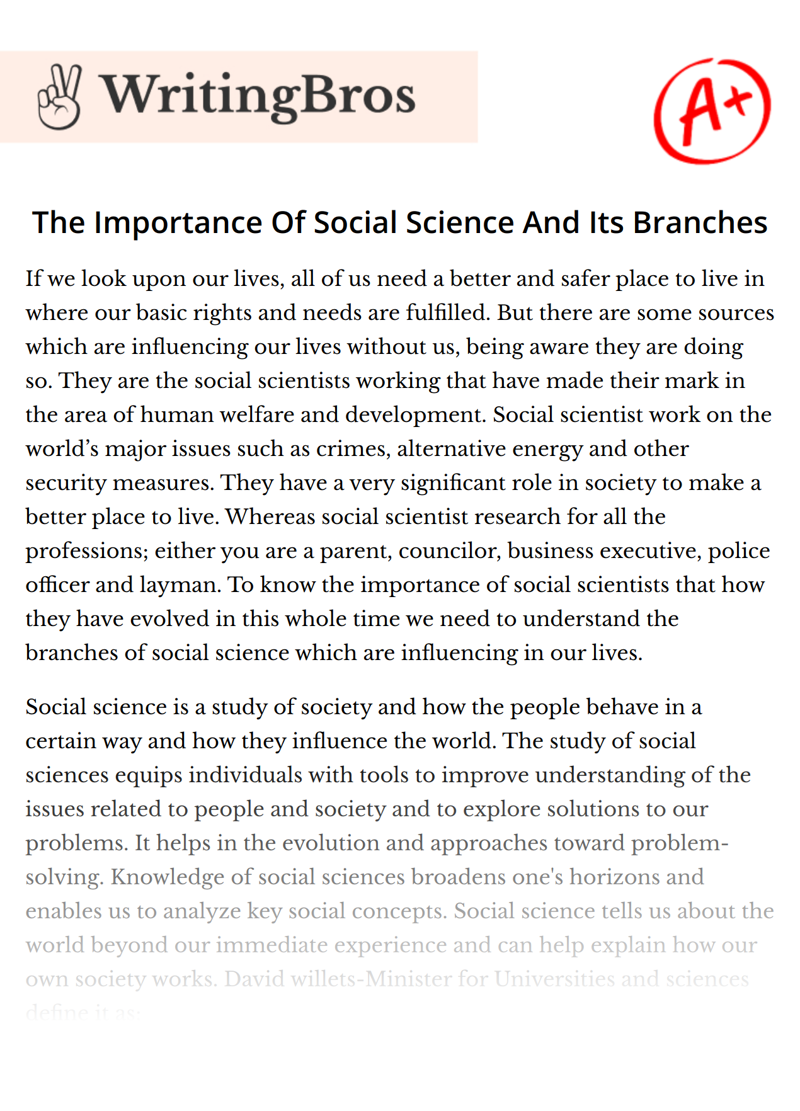
*minimum deadline
To export a reference to this article please select a referencing style below

- Psychotherapy
- Milgram Experiment
- Child Development
- Teaching Philosophy
- Short Term Memory
- Cognitive Behavioral Therapy
Need writing help?
You can always rely on us no matter what type of paper you need
*No hidden charges
100% Unique Essays
Absolutely Confidential
Money Back Guarantee
By clicking “Send Essay”, you agree to our Terms of service and Privacy statement. We will occasionally send you account related emails
You can also get a UNIQUE essay on this or any other topic
Thank you! We’ll contact you as soon as possible.

- Our Leadership
- Our Curriculum
- Robotics Lab
- Co-Scholastic
- Pragyanam PEP
- Parent Engagement
- Parent Education
- Parent Login
- News and Events
- Awards & Achievements
- Photo Gallery
- Video Gallery
- Disclosures

Empowering Minds: The Role of Social Science in School Student Development
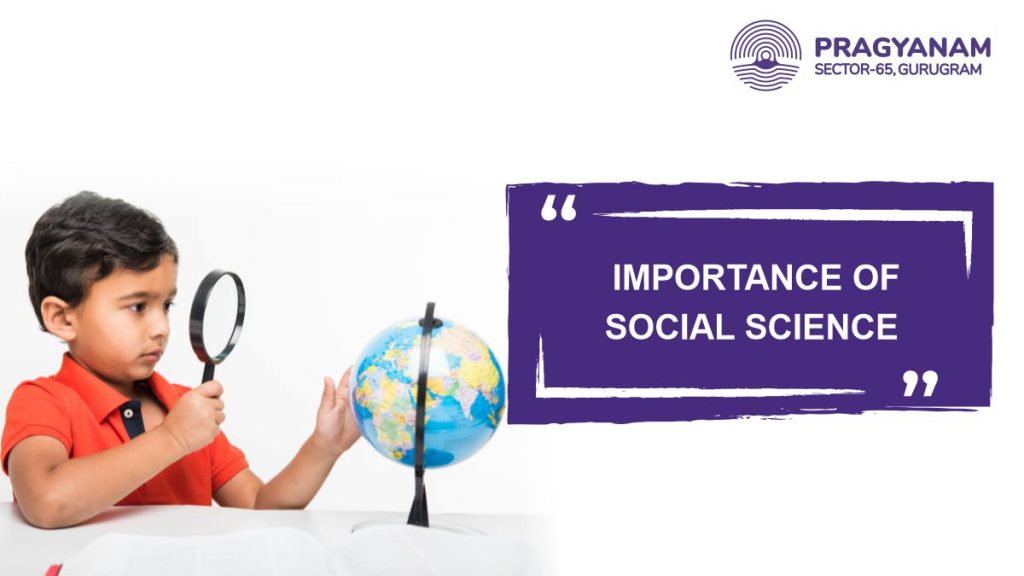
Social Science is a crucial subject that forms an integral part of the school curriculum. It encompasses various disciplines such as history, geography, economics, sociology, and political science, providing valuable insights into the functioning of society, culture, and human behavior. In today’s rapidly changing world, it is essential for school students to develop a strong foundation in social science as it equips them with the knowledge and skills necessary to navigate the complexities of modern society.
In this blog post, we will delve into the importance of social science for school students and explore how it enhances their understanding of the world around them. We will also discuss the role of Pragyanam, an innovative CBSE School , in teaching social science and empowering students with critical thinking, problem-solving abilities, and a global perspective. So, let’s embark on this enlightening journey and discover why social science is a subject of utmost significance for school students.
Table of Contents
What is Social Science?
Social Science is an interdisciplinary subject that studies human society and its various aspects. It explores the relationships between individuals, communities, and institutions and encompasses multiple topics such as history, geography, economics, sociology, and political science. By studying social science, students develop a deeper understanding of how societies function, how individuals interact, and the impact of social, economic, and political factors on human behavior.
The Importance of Social Science in The School Curriculum
Social science plays a crucial role in the school curriculum as they equip students with essential knowledge and skills relevant to their academic success and personal and professional growth. Here are some key reasons why social science is important for school students:
Developing Critical Thinking Skills: It encourages students to analyze and evaluate information from multiple perspectives, fostering critical thinking skills. By studying historical events, analyzing economic trends, and examining social structures, students learn to think critically, question assumptions, and develop independent thought.
F ostering Cultural Awareness and Understanding: It exposes students to various cultures, traditions, and global issues, promoting cultural awareness and understanding. By studying different societies and their histories, students develop empathy and respect for diverse perspectives, fostering a sense of global citizenship.
Enhancing Civic Engagement: Social science is instrumental in shaping students into active and engaged citizens. By studying political systems, government structures, and civic responsibilities, students develop the knowledge and skills necessary to participate in democratic processes, make informed decisions, and contribute to their communities.
Topics covered in social science classes
Social science classes cover many topics, providing students with a comprehensive understanding of society and the world. Some of the common topics covered in social studies classes include:
History: Students study the past to understand how it has shaped the present. They learn about significant historical events, explore different civilizations, and analyze the impact of historical figures on society.
Geography: Geography helps students understand the Earth’s physical features, climate, and human-environment interactions. They learn about different regions, their cultures, and the world’s interconnectedness.
Economics: Economics introduces students to basic economic concepts, such as supply and demand, market structures, and personal finance. It helps them understand the principles of trade, money management, and the role of government in the economy.
Sociology: Sociology focuses on the study of human society, social interactions, and social institutions. Students learn about social norms, cultural practices, and the impact of social structures on individuals and communities.
Political Science: Political science explores different forms of government, political ideologies, and the functioning of political systems. It helps students understand the rights and responsibilities of citizens and the importance of active participation in democracy.
Benefits of taking social science courses
Taking social studies courses offers numerous benefits for students. Here are some of the key advantages:
Enhanced Analytical Skills: Social studies courses require students to analyze and interpret complex information, improving their analytical and critical thinking skills. They learn to evaluate different perspectives, synthesize information, and make informed judgments.
Improved Communication Skills: Social studies courses often involve class discussions, debates, and research projects, enhancing students’ communication and presentation skills. They learn to express their ideas effectively, listen actively, and articulate their thoughts coherently.
Increased Cultural Competence: By studying different cultures, societies, and historical events, students develop cultural competence and sensitivity. They learn to appreciate diversity, challenge stereotypes, and develop a global perspective.
Preparation for Civic Engagement: provide students with the knowledge and skills necessary for active civic engagement. They learn about their rights and responsibilities as citizens, the importance of voting, and the role of advocacy in shaping public policies.
Career Opportunities: Social science courses lay the foundation for many career opportunities. The skills developed through the study of social studies, such as critical thinking, research, and communication skills, are highly valued in various fields, including law, journalism, public administration, and social work.
Nurturing Empathy and Social Awareness
One of the key benefits of studying social science is the development of empathy and social awareness. By exploring different societies, historical events, and social issues, students gain a deeper understanding of the struggles and triumphs of people from diverse backgrounds. They learn to see the world through different lenses, develop empathy for others, and become socially conscious individuals. Social science education nurtures compassion, tolerance, and a sense of justice, empowering students to positively impact the world around them.
Social Science and the Formation of Civic Values
Social science education is instrumental in shaping civic values among school students. By studying political systems, government structures, and civic responsibilities, students develop a sense of civic duty and active participation in democratic processes. They learn the importance of respecting the rule of law, advocating for equality and social justice, and contributing to their communities. Social science education instills values of responsible citizenship and prepares students to become informed, engaged, and socially responsible members of society.
The Link Between Social Science and Career Opportunities
Studying social science opens a wide range of career opportunities for school students. The skills developed through social science education, such as critical thinking, research, and communication skills, are highly valued in various professions. For example, careers in law, journalism, public administration, international relations, and social work often require a strong foundation in social science. Moreover, social science education provides students with a broad understanding of human behavior, society, and global issues, making them well-rounded individuals who can adapt to various professional settings.
Social science education plays a vital role in the overall development of school students. It gives them a comprehensive understanding of society, human behavior, and the world around them. Students develop critical thinking skills by studying social science, gaining cultural awareness and understanding, and becoming active community participants. Moreover, social science education nurtures empathy, social awareness, and civic values, preparing students to become informed, engaged, and socially responsible citizens. The skills and knowledge gained through social science education also open numerous career opportunities for students, making it a valuable subject in the school curriculum. Pragyanam , with its expertise in teaching social science, further enhances the learning experience for students, empowering them with the necessary knowledge and skills to excel in this field.
Latest Posts

| M | T | W | T | F | S | S |
|---|---|---|---|---|---|---|
| 1 | 2 | 3 | 4 | 5 | ||
| 6 | 7 | 8 | 9 | 10 | 11 | 12 |
| 13 | 14 | 15 | 16 | 17 | 18 | 19 |
| 20 | 21 | 22 | 23 | 24 | 25 | 26 |
| 27 | 28 | 29 | 30 | 31 | ||
Join Pragyanam Community
Pragyanam, meaning 'wisdom' in sanskrit, embodies our philosophy of nurturing mindful individuals. we prioritize our students' competence over competitiveness, guiding them toward a fulfilled life through our unique 'life skills curriculum.' join us for an education that prepares your child for exams and life., pragyanam school emerald hills, sector 65, gurugram, haryana 122022, t: +91-93110 42850 e: [email protected] .
Follow Us on
Download Fee Structure
Please enter otp.

An official website of the United States government
The .gov means it’s official. Federal government websites often end in .gov or .mil. Before sharing sensitive information, make sure you’re on a federal government site.
The site is secure. The https:// ensures that you are connecting to the official website and that any information you provide is encrypted and transmitted securely.
- Publications
- Account settings
Preview improvements coming to the PMC website in October 2024. Learn More or Try it out now .
- Advanced Search
- Journal List
- Front Res Metr Anal

Understanding the Societal Impact of the Social Sciences and Humanities: Remarks on Roles, Challenges, and Expectations
Benedikt fecher.
1 Research Program Knowledge and Society, Alexander von Humboldt Institute for Internet and Society, Berlin, Germany
2 German Institute for Economic Research, Berlin, Germany
Freia Kuper
Nataliia sokolovska, alex fenton.
3 Research Area Research System and Science Dynamics, German Centre for Higher Education Research and Science Studies, Berlin, Germany
4 Department of Social Sciences, Humboldt University Berlin, Berlin, Germany
Stefan Hornbostel
Gert g. wagner.
5 Max Planck Institute for Human Development, Berlin, Germany
Hanna Hottenrott , Technical University of Munich, Germany
Associated Data
The raw data supporting the conclusions of this article will be made available by the authors, without undue reservation.
Science is increasingly expected to help in solving complex societal problems in collaboration with societal stakeholders. However, it is often unclear under what conditions this can happen, i.e., what kind of challenges occur when science interacts with society and what kind of quality expectations prevail. This is particularly pertinent for Social Sciences and Humanities (SSH), which are part of the object they study and whose knowledge is always subject to provisionality. Here we discuss how SSH researchers can contribute to societal problems, what challenges might occur when they interact with societal stakeholders, and what quality expectations arise in these arrangements. We base our argumentation on the results of an online consultation among 125 experts in Germany (representatives from SSH, learned societies, stakeholders from different societal groups, and relevant intermediaries).
- Introduction
Societal impact is an increasingly important evaluation paradigm in science governance. This trend can be seen in the implementation of large-scale impact agendas in various research and innovation systems over the past decade. Examples include the Research Excellence Framework in the United Kingdom, the Standard Evaluation Protocol in Netherlands, or the Excellence in Research framework in Australia ( van der Meulen and Rip, 2000 ; Geuna and Martin, 2003 ; Bornmann, 2013 ). Consequently, research is no longer assessed according to its scientific relevance alone but also according to the value it appears to generate for society. In Germany, where the present study was conducted, the societal impact of research is also at the top of the agenda of policymakers and research funders, although under a variety of terms. The German Ministry for Education and Research, for example, argues in a policy paper that a dialogue with society must become part of the logic of scientific reputation ( BMBF, 2019 ).
This gradual evolution of societal impact as an evaluation paradigm was preceded by a shift in the scholarly conception of the relationship between science and society, which can be summarized as a shift “from deficit to dialogue” ( Bucchi, 2008 ; Davies et al., 2009 ; Reincke et al., 2020 ). According to this view, science no longer provides knowledge to resolve a deficit but should develop “socially robust knowledge” together with societal stakeholders ( Nowotny et al., 2001 ). This shift in the conception of the science-society interface implies that societal impact requires interaction between scientific and societal stakeholders. As a result, evaluation frameworks increasingly focus on processes rather than outcomes, thus rely more heavily on narratives and on formative methods more than summative ones. An example of the latter is the SIAMPI approach, which focuses on ‘productive interactions’ between science and society ( Molas-Gallart and Tang, 2011 ; Spaapen and van Drooge, 2011 ).
The focus on societal impact in science governance and on interaction as a means to achieve this is particularly controversial for the social sciences and humanities (SSH), which we conceive of here as all research disciplines and subdisciplines that deal with social, societal, and cultural matters. On the one hand, from an internal scientific perspective, SSH disciplines investigate social life itself. This implies that subjects, investigators, and audiences tend to merge with one another and that value judgments might play a particularly important role ( Davies et al., 2008 ; Cassidy, 2014 ). As a result, when SSH researchers interact with societal stakeholders, questions of demarcation and boundary dissolution might arise ( Gieryn, 1983 ; Benneworth and Olmos-Peñuela, 2018 ). On the other hand, from an external perspective, evaluation exercises have rarely considered the particular epistemic conditions and specific utilization logics for SSH research ( Reale et al., 2018 ). Critics have noted the mismatch between indicators and SSH notions of quality, the lack of consideration for contributions that are critical rather than solution oriented, and the overly simple framing of societal impact as economic outputs, such as the number of patents or spin-offs ( Benneworth, 2015 ; Ochsner et al., 2017 ; Fecher and Hebing, 2021 ). Generally, established models for knowledge transfer do not do justice to the complexities of the diverse SSH disciplines and their many publics ( Davies et al., 2008 ).
Arguably, SSH research makes important societal contributions, but these are not well understood—at least not in the governance of science. We therefore recognize a need to better understand the societal impact of SSH disciplines in terms of a) the role they might play for societal challenges, b) the problems that might arise in interactive settings that involve SSH scholars and societal stakeholders, and c) the (possibly conflicting) quality expectations that are placed on their interaction. These objectives motivate our exploratory study, which consists of an online consultation with 125 experts (i.e., SSH researchers from different disciplines along with relevant societal stakeholders). Here, we report on the results of this consultation and reflect on the implications these might have for research evaluation.
Research Interest
The role of social sciences and humanities disciplines in response to societal problems.
There is some controversy about the role that SSH research can play in tackling societal problems: While some scholars argue that these fields should augment and emphasize their transformative potential ( Sörlin, 2018 ; Sigurðarson, 2020 ), others attribute a rather passive role to them, suggesting that they should create system knowledge (i.e., knowledge that increases understanding of a social issue) or orientation knowledge (i.e., knowledge that helps to determine possibilities for action) ( Becker, 2002 ; Jahn et al., 2012 ). One could furthermore argue that the public value of SSH research is not necessarily captured by their usefulness in solving problems but rather by their capacity to critically reflect on the problem itself and its potential solutions ( Olmos-Peñuela et al., 2015 ). In this regard, the societal impact of SSH research may also be counterintuitive if one expects clear-cut solutions to problems formulated in advance. Critics of an overly narrow conception of impact as research utilization have also pointed out how social science knowledge tends to be used in diverse ways, many of which are implicit ( Davies et al., 2008 ; Meagher et al., 2008 ; Stehr and Ruser, 2017 ). Weiss (1980) , for example, observes that expertise can “creep in” as conceptual knowledge that influences ideas and decisions. Compared to the natural and technical sciences, the impact of the SSH is thought to be more indirect and less visible. While utilization of SSH might be discreet, it can also be symbolic to the extent that it is used to justify political decisions that are already made ( Weiss, 1980 ; Albæk, 1995 ; Amara et al., 2004 ).
In summary, it is possible to identify quite different (often normative) perceptions of the societal role of SSH. Accordingly, the notion of socially relevant knowledge attributed to SSH disciplines varies: from more transformative and instrumental knowledge, to more indirect conceptual knowledge, to more counterintuitive critical knowledge. The different kinds of knowledge evoke quite different understandings of the role that the SSH should play in addressing societal challenges, which motivates our first research question (RQ1): What role is attributed to the SSH in addressing societal challenges?
Challenges for Collaborative Arrangements Involving the SSH and Societal Actors
In the sociology of science, the shift from deficit to dialogue is associated with concepts like “Mode 2,” “post-normal science,” or “triple helix” ( Funtowicz and Ravetz, 1992 ; Gibbons et al., 1994 ; Leydesdorff and Etzkowitz, 1998 ). These concepts all describe knowledge production as a mode of collaboration between scientific and societal stakeholders. According to a concept of transdisciplinarity, the main challenge for such collaborative arrangements is the integration of differences between actors on an epistemic, social-organizational, and communicative level ( Jahn et al., 2012 ). As already observed above, at the epistemic level, boundaries between subjects, investigators, and audiences have a tendency to become blurred in SSH research ( Davies et al., 2008 ; Cassidy, 2014 ). In collaborative arrangements that involve SSH researchers, questions of boundary work might therefore be of particular relevance ( Gieryn, 1983 ). Furthermore, within the diverse SSH disciplines, there is little consensus on research questions and suitable methods, which poses challenges to the robustness of findings ( Ochsner et al., 2017 ). Regarding the socio-organizational level, the structures that support societal exchange in universities are mostly centrally organized and focused on broad public communication ( Peters, 2013 ; Marcinkowski et al., 2014 ; Fecher and Hebing, 2021 ). Questions arise as to how adequate these might be for anticipating the complexities of science in general and of the SSH in particular. Furthermore, the focus on economic indicators as a means of measuring societal impact in the past might have led to structural discrimination against SSH disciplines in organizational efforts to promote societal engagement ( Benneworth and Olmos-Peñuela, 2018 ; Fecher and Hebing, 2021 ). Jacobson et al. (2004) suggest implementing an array of organizational measures that are believed to be more suitable for SSH disciplines, from increasing resources to fostering the skills of individual researchers. Regarding the communicative level, SSH researchers have frequently been accused of using overly specialized and obscure terms ( Alvesson et al., 2017 ; Healy, 2017 ). At the same time, because the social sciences—and to a lesser degree, the humanities—investigate social life, they must deal with the everyday observations and ad hoc assumptions of the individuals with whom they engage (cf. Cassidy, 2014 ).
Some researchers argue that a consensus on values is not the only necessary condition for facilitating cooperation between heterogeneous actors; more importantly the conditions and structures for cooperation must be created ( Star and Griesemer, 1989 ). For SSH disciplines, this might come with particular challenges that are not yet well understood. This motivates our second research question (RQ2): What hinders interaction between SSH researchers and societal stakeholders?
Quality Expectations Regarding the Interaction Process
If our aim is to grasp the collaborative settings of knowledge production, we will likely need to go beyond criteria that are either purely academic or targeted towards science communication through the media ( Secko et al., 2013 ; Rögener and Wormer, 2017 ). The term “socially robust,” meaning that knowledge should be scientifically robust and socially useful ( Nowotny et al., 2001 ), is now used frequently to describe quality in these settings. Rather than bridging a cognitive gap (as purely academic projects would do), these new modes of knowledge creation aim to bridge social gaps, i.e., they are geared towards potential users, political decision makers, and entrepreneurs ( Maasen and Lieven, 2006 ). The authors argue that in these settings, actors must develop social accountability procedures collaboratively. This undertaking produces social demands that differ from those made in disciplinary research because the researchers need to work outside the set of scientific norms that would otherwise guide their practice ( Merton, 1973 ; Mitroff, 1974 ). This creates new requirements vis-à-vis the outcome. These outcomes are not easily located on a disciplinary map but instead suit the context of application ( Gibbons et al., 1994 ). This will most likely be accompanied by processual requirements to bridge the above-mentioned gaps and to deal with the specific contexts that are addressed by these arrangements.
There are general preconceptions about how collaborative modes of knowledge production might consolidate the quality conceptions of all parties involved. Still, these often remain at an abstract level, which motivates our third research question (RQ3): What do scientific and societal stakeholders perceive as the conditions for good interaction?
Data and Methods
The study is exploratory in that it aims to better understand the societal impact of SSH disciplines by an empirical examination of the role ascribed to SSH research in addressing societal challenges, as well the quality expectations arising in collaborative processes involving SSH researchers. Our findings are based on an online consultation of SSH researchers, societal stakeholders, and intermediaries. We subsequently discussed the results of the consultation with SSH and science researchers in two workshops, where we further scrutinized their implications for assessing the societal impact of SSH.
The selection of participants in the consultation process was deliberate and targeted a) researchers from different SSH disciplines who had experience of knowledge transfer and b) societal stakeholders from politics, media, business, culture, civil society, and public administration who had experience in collaborating with SSH scholars. In order to ascertain that participants did indeed have experience of collaboration, we conducted preliminary interviews, researched specific collaboration projects, and, in the case of researchers, asked learned societies for nominations. The deliberate selection of participants was necessary in order to ensure that respondents could legitimately provide answers to the partly normative questions. Our final sample consists of 125 responses, of which 36 are SSH scholars, 71 societal stakeholders, and 18 intermediaries. Of the SSH scholars, four participants came from core humanities disciplines (philosophy, legal studies, history), four from economics, thirteen from other social sciences, and one each from pedagogy, linguistics, and design research. Twelve of the researchers did not indicate their disciplinary background. Further, our sample includes a group we describe as “intermediaries.” These are individuals that are involved in managing and enabling collaborations between SSH researchers, for example communications officers at universities or independent science communication consultants. We chose to include this group in the consultation because we assumed that they would be uniquely positioned to observe and thus reflect on the conditions of these interactions. Table 1 illustrates the final expert sample by group membership.
Sample of the online consultation by group membership.
| Participants | No. |
|---|---|
| In universities | 27 |
| In nonuniversity research institutes | 9 |
| NGOs | 19 |
| Politics | 10 |
| Public administration | 11 |
| Private sector | 11 |
| Cultural sector | 1 |
| Media | 19 |
The consultation consisted of an online survey that comprised both a close-ended section on sociodemographics and a set of mainly open-ended questions about individual experience in collaborative settings involving SSH researchers. Our analysis of the three research questions is based on five open questions in the survey ( Table 2 ). One of the questions refers to the Covid-19 pandemic ( Table 2 ; RQ1). We chose to include this because the pandemic is a complex societal challenge and is thus relevant to the subject of the study.
Research interest and survey questions.
| Research interest | Survey question |
|---|---|
| Role of SSH researchers (RQ1) | From your perspective: For which societal issues are the SSH research particularly relevant? |
| How do you assess the role played by SSH disciplines in solving societal problems, for instance during the Covid-19 pandemic | |
| Interaction challenges (RQ2) | Where have you experienced problems and challenges in communicating and applying the results of SSH research? |
| How would you assess the role of scientific institutions (universities, non-university research institutions)? Where do you recognize concrete potential for development in the relationship between science and society in these institutions? | |
| Quality expectations (RQ3) | Please describe what constitutes good collaboration or exchange between science and society. If possible, please also address what special requirements apply to the SSH. |
We conducted a structuring content analysis in order to analyze the textual data. This technique corresponds to the inductive technique of qualitative content analysis ( Mayring, 2000 ) and takes into account Kuckartz’s structuring method by using an interpretative initial processing to then iteratively form consistent categories ( Kuckartz, 2014 ). Quotations in this paper are the authors’ translations from the original German responses into English.
We encouraged the experts to publish their names and responses because we consider them relevant for further research: 103 agreed to publish their responses, 68 agreed to publish their names and institutions, 27 to publish only the name of their institutions, and 30 wished to stay anonymous. The survey instrument, the anonymized MAXQDA file, as well as the full answers of those who granted permission, can be found on the project website.
This study had limitations regarding the selection of participants in the consultation: Despite every effort being made to recruit a diverse and relevant set of participants, the selection can hardly reflect the diversity of SSH researchers and its many specialized societal stakeholders. Further research is necessary to understand the manifestations of the generic categories presented here in different contexts.
From the survey responses, we first identify topics that SSH research is associated with and the role SSH research fulfills within society. Second, we present the challenges that are mentioned when SSH researchers and societal stakeholders interact. Third, we turn to quality expectations in this interaction. In each results section, we will report on the findings by referring to the number of codes ascribed to a category in brackets and use exemplary quotes where suitable.
Role of Social Sciences and Humanities Researchers
From the responses regarding the societal issues that SSH expertise is relevant for, we were able to identify 31 societal issues that span nearly every aspect of social and natural life, as well as technical innovation. Broadly, these can be assigned to the following categories: “politics” (45), “economy” (47), “culture” (6), “education” (26), “ecology” (56), “civil society” (131), “health” (34), and “technology” (42).
The answers likely relate to the respondents’ particular interests and expertise and do not represent those areas of real-world problems that the SSH contribute to. However, the issues show that the spectrum of topics ascribed to SSH disciplines goes far beyond narrow disciplinary couplings (e.g., educational research that deals with education or economics that deal with economic growth) and includes contemporary and frequently transformative topics, such as climate change, migration, or the current pandemic. The ubiquity of potential issues for SSH engagement is expressed in this quote from a journalist:
“Every topic has a societal component—from fundamental questions of democracy and politics to questions concerning nature and technology. Basically, each question that requires social action and regulation” (Media_ID103, 10).
While these issues provide some indication of the wide topical range for potential SSH engagement, the participants’ perception of the role of SSH research in addressing these societal issues might provide a more accurate picture of how that engagement might actually unfold. We coded the answers to the question of how participants assess the role of SSH research in solving societal problems accordingly. In total, we identified six distinct societal roles that are frequently referred to by the experts: explaining, reflecting, educating, signaling, foresight, and informing ( Table 3 ).
Societal functions of SSH knowledge.
| Roles | Description | Example | #Codes |
|---|---|---|---|
| Explain | To describe and contextualize an issue. | “It is always about identifying—understanding—explaining and providing contextual knowledge. That is always of importance” (Economy_ID132, 10). | 77 |
| Reflect | To discuss and interpret an issue. | “What does it mean that one part of the population can work from home in a relatively safe manner, while another part of the population cannot, and is thus potentially more exposed?” (NGO_ID85, 25). | 65 |
| Educate | To build competence in a specific area. | “[SSH] should develop intercultural competences” (Media_ID180, 15). | 7 |
| Signal | To point to an issue. | “Impulses for necessary discourses can and should also come from [SSH] research” (NGO_ID200, 10). | 20 |
| Foresee | To predict the development of an issue. | “The potential implications of current research have societal relevance—technological developments such as CRISPR Cas 9 or AI should be discussed more widely in society so that we can negotiate ethical issues raised by the introduction of such technologies early enough” (Intermediary_ID174, 10). | 21 |
| Inform | To support decision-making. | “Solid analyses of socio-political developments, numerical data, and impact assessments are needed in politics and administration. They are picked up on and incorporated into decision-making” (PublicAdmin_ID61, 16). | 80 |
We found indications that each of these six functions correspond to different types of knowledge. For example, the “explain” category relates to system knowledge needed to understand a social issue because it contains statements from participants that are geared towards contextualizing social issues without suggesting any concrete instructions for action. By the same token, the “educate” category contains knowledge used to build competence in a specific issue area. The category “foresee” relates to knowledge needed to determine possibilities for decision-making as it contains statements from participants that refer to future developments. For example, one person working in public administration describes SSH research as an “early warning system for problems that have not yet become apparent” (PublicAdmin_ID61, 9). According to this statement, SSH disciplines should assess the societal implications of social change. These include, as several respondents state, the implications of artificial intelligence on the future of work.
The “inform” category is closely linked to what is referred to as the instrumental use of SSH knowledge, i.e., it is used directly for decision-making. Both the “reflect” and the “signal” categories resonate with what might be considered critical knowledge. Statements in the “reflect” category do not refer to the provision of expertise for problem solving but to interpreting and analyzing the problem and the solution. The “signal” category includes statements that, according to the participants in the consultation, refer to issues that receive too little attention but are considered relevant to public discourse or policymaking. Accordingly, the role of SSH disciplines is to point to these problematic aspects and to act as a critical observer. In relation to the Covid-19 pandemic, for example, the participants mentioned that SSH researchers emphasized the psychological, social, and cultural consequences of pandemic control. Some experts believe SSH expertise is not given enough attention in current political strategies, others like this intermediary describe their influence as lagged but present:
“Whereas at the beginning it was mainly the virologists who were heard, in my opinion the social sciences have now made themselves heard in many respects and have pointed out numerous important aspects of economic and socio-political relevance. For example, the fact that the daycare centers and schools have not yet been closed again is not only due to the virological assessment that children are less likely to spread the virus, but also due to the indications of the problems for working parents and for the children whose educational disadvantages have been exacerbated” (Intermediary_ID110, 24).
The statements from politicians in our sample frequently referred to the “foresee” category, but other than that there were no striking quantitative variations in the distribution of codes.
With regard to the roles attributed to the SSH in solving societal problems, we identified different levels of activity, from a rather passive, contextualizing role (e.g., “explain”) to a more active, influencing role (e.g., “inform”). This leads us to conclude that the SSH provide a diverse range of problem-relevant kinds of knowledge for societal challenges. From a solution-focused point of view, SSH knowledge is partly counterintuitive because it does not necessarily aim to contribute to a solution but seeks to question the problem and its solution. Moreover, rather than producing knowledge that might itself stimulate change or even transformation, SSH disciplines are more frequently attributed the role of producing “cohesion knowledge,” that is, knowledge that helps anticipate change. In this regard, SSH research fulfils a moderating role in complex change processes by helping to establish and maintain social order, cohesion, and equality. In our view, the multiple roles attributed to SSH disciplines could amount to a moderating role that would involve taking into account the complexity of issue formation in change processes as well as attempts to tackle these. Therefore, SSH disciplines are in a position to consider overarching issues of social cohesion and equality. The capacity of SSH research to address questions of cohesion is strongly reflected in the frequency of references to issues: the terms equality or inequality are mentioned 79 times by the respondents, democracy is mentioned 32 times, and cohesion or similar terms are mentioned 28 times.
Interaction Challenges
In order to understand where difficulties arise in the interaction between SSH scholars and societal stakeholders, the participants were asked about the problems and challenges they experienced in previous interactions and—in order to assess organizational aspects—the role of universities in supporting science-society interactions. We identified four kinds of interaction challenges in the answers: 1) translational challenges that relate to different modes and logics of interaction, 2) institutional challenges that relate to the governance and organization of science, 3) epistemic challenges that relate to knowledge creation processes of SSH disciplines, and 4) uptake challenges that relate to the use of SSH expertise by different societal stakeholders. Table 4 presents these challenges and their subdimensions.
Interaction challenges.
| Challenges | Categories | Example | #Codes |
|---|---|---|---|
| Translational challenges | Language barriers | “Challenges in applying the results of social science research also lie in the different ways in which journalists and scientists work with language” (SSHscholar_ID178, 14). | 27 |
| Conflicting system logics | “Politics has to make decisions and win majorities or, create acceptance. Science can give recommendations, but this might just result in different recommendations coexisting [...]” (Intermediary_ID110, 12). | 73 | |
| Institutional challenges | Lack of resources | “The everyday routine at the university, with extensive teaching and exams obligations and increasingly also administrative tasks, which coincides with shrinking resources, already leaves little room for research. This means that the Third Mission is an additional burden” (SSHscholar_ID192, 12). | 19 |
| Lack of organizational support | “Institutions should create structured incentive systems for scientists to raise awareness of societal challenges and to consider what they themselves can contribute to solving them” (SSHscholar_ID65, 28) | 19 | |
| Lack of rewards | “The transfer (not only the publication) of research results should be valued as an important aspect of scientific work in education but also in evaluations” (Intermediary_ID195, 13). | 20 | |
| Epistemic challenges | Ambiguity of results | “But in contrast to the natural sciences, there are rarely any clear “truths” here. So it’s not easy for the media to present a comprehensive and well-balanced picture when selecting scientific contributions” (PublicAdmin_ID61, 25). | 23 |
| Conflicting paradigms | “One challenge is the question of how issues that are scientifically controversial can be presented to the public in such a way that the reputation of science does not suffer and, ideally, this heterogeneity can even be used productively” (SSHscholar_ID179, 13). | 9 | |
| Uptake challenges | Lacking appreciation of SSH expertise | “I see challenges in the general perception and appreciation of social science research being too low” (Intermediary_ID201, 13). | 27 |
| Public attention dynamics | “Provocation is better “received” than factuality; “loud” colleagues are simply more seen and heard” (SSHscholar_ID67, 13). | 13 | |
| Risk of instrumentalization | “Politics must not misuse scientific findings for its own agendas and thereby partly discredit them” (Economy_ID96, 18). | 5 |
Translational Challenges: Conflicting System Logics and Boundary Work
Translational challenges relate to different modes and logics of interaction between involved parties. The category comprises statements made by respondents that refer to semantic aspects and systemic differences between science and other social systems that hamper meaningful interaction. The statements in this category can be split into two categories: “language barriers” (27) and “conflicting system logics” (73).
Some participants perceive the language of SSH scholars to be complicated, as this journalist describes:
“As a journalist, it strikes me that social science researchers very often and unfortunately quite naturally use terms that are hardly used or understood by the general public” (Media_ID159, 13).
Differences, however, can be found in the assessment of language barriers. Some see the use of technical concepts as a necessity for describing social phenomena in a differentiated way, while others see it as unnecessarily complicated prose that is a hindrance to productive exchange. In general, references to language barriers are mostly made by participants working in the private sector or in the media.
A second challenge can be described as “conflicting system logics.” Statements in this category refer to three closely related aspects of incompatibility: 1) temporality of SSH research (i.e., SSH research takes time and cannot satisfy needs immediately), 2) conflicting notions of relevance (i.e., societal relevance of SSH is not based on immediate societal needs), and 3) self-referentiality of SSH research (i.e., SSH research refers to itself and not to what others consider social problems). The conflicting system logics resulting from these are well expressed in a quote from an SSH researcher, who on the one hand calls for SSH researchers to anticipate different societal contexts (here the media) but on the other hand reports that this can lead to conflicts among academic peers:
“Scholars should recognize that they move in a different system logic when they communicate with the media, for example. I experience a lot of criticism of the portrayal of science in the media, which I consider inappropriate. Of course, there is a decrease in length, but that is also completely okay.” (SSHscholar_ID138, 16–17)
In general, the participants often refer to different system logics, usually to explain why an exchange could not take place from their specific perspectives. In this quote, for example, a politician reports on the context of his decision making and the associated lack of time to deal with SSH research:
“Science is a different system than politics; there is a democracy proviso; being an elected official does not give me enough time to read or receive scientific literature.” (Politics_ID196, 17)
Different system logics explain the translational challenges between SSH researchers and members of other social subsystems, specifically with regards to language usage, the notions of relevance, and time and content-related use considerations. This explanation can be problematic when functional differentiation of social systems is used as a pretext for not engaging in interaction at all. It might be more fruitful to think of the interaction between societal stakeholders and scientists as one where boundaries between science and nonscience are contextually and continuously dissolved and redrawn.
Institutional Challenges: Mismatch Between Aspiration and Resources
Institutional challenges relate to the governance and organization of science. In this respect, we identified three types of challenges in the statements. These are “lack of resources” (19), “lack of organizational support” (19), and “lack of rewards” (20).
In most cases, references to lack of resources refer to limits concerning SSH researchers’ time and skills. One social scientist mentioned the need for training for research staff when explaining the latter:
“[We] are not trained to do this; we usually do basic research and teach basic science at universities—we need knowledge transfer” (SSHscholar_ID68, 15).
A second institutional challenge relates to the lack of organizational support. Respondents often refer to a decoupling of transfer infrastructures at universities and the researchers working there, or to necessary investment in transfer capacities at research organizations. The latter becomes clear in this statement made by a participant who works in public administration:
“In my opinion, scientific institutions should invest more in public relations—these positions are often sparsely staffed and funded [...]. The relevance of the job/intermediary function is recognized more and more, but this is (often) not yet reflected in the structures” (Intermediary_ID229, 13).
A third challenge in this category is the lack of rewards for societal engagement, which the participants link to the academic reputation and funding system. Another social scientist describes what she perceives as an undervaluation of engagement as follows:
“[There is a] lack of reputation for this activity as opposed to third-party funding and high-ranking publications. [Engagement] is only an “add on”” (SSHscholar_ID44, 13).
The notion of “engagement as an add-on” (i.e., not a main task) is mentioned frequently and especially by SSH scholars in the consultation. However, the participants discuss the matter of recognition with significant differentiation: One expert describes societal impact as an additional pathway for scholarly work, alongside scientific impact:
“Since publication excellence can hardly be mitigated, they could instead create funding lines that can only be used if the relevance to the SDGs is laid out clearly,” (SSHscholar_ID65, 28).
Lack of recognition for public engagement activities and a lack of resources to carry them out are not specific to SSH disciplines per se. However, they may be more pronounced here because knowledge transfer is even less rewarded and incentivized in a dominant framework focused on economic outcomes. If strengthening societal engagement is a science policy priority, the results here suggest that there is a perceived mismatch between this aspiration and the resources allocated to it.
Epistemic Challenges: The Illusion of Stable Social Sciences and Humanities Knowledge
The epistemic challenges category describes challenges that relate to the knowledge creation of SSH disciplines. It includes two subcategories, “ambiguous results” (23) and “conflicting paradigms” (9).
With respect to “ambiguous results,” statements often contain comparisons to the “hard” natural sciences, where results are perceived by some participants to be clear and unambiguous. In contrast, results from SSH disciplines are often described as vague. For example, for a respondent who works as a researcher and in the media, this is the main reason why results from the natural sciences are preferred:
“Questions and research designs are often too vague, the results too ambiguous. Therefore, journalists prefer communicating results from the natural sciences” (SSHscholar_ID142, 16).
The “conflicting paradigms” category contains statements that emphasize how different schools of thought within SSH disciplines result in different ways of understanding and assessing the same issue. A social scientist in the consultation interpreted the heterogeneity of SSH disciplines as an impediment to communication:
“Distinctive disciplinarity and families of methods in SSH disciplines prevent common problem-oriented communication” (SSHscholar_ID206, 22).
While the heterogeneity of SSH disciplines is often described as normal and indeed as an asset by the participants, some point to a problem, namely that this lack of consensus can also be perceived by the public as a lack of scientific rigor. This can lead to a loss of reputation and trust.
“One challenge is the question of how issues that are scientifically controversial can be presented to the public in such a way that the reputation of science does not suffer and, ideally, this heterogeneity can even be used productively” (SSHscholar_ID179, 13).
Of course, conflicting paradigms and ambiguous results are not purely SSH problems. However, they manifest in specific ways there. In general, SSH disciplines comprise very different approaches, research questions, and epistemological premises. Moreover, their results are often strongly dependent on context. These characteristics are echoed in our respondents’ view of the ambiguity of SSH results, which they describe as a challenge when interacting with societal stakeholders.
Uptake Challenges: Lacking Appreciation and Public Attention Dynamics
The category uptake challenges includes statements from participants that relate to the use of SSH expertise by societal stakeholders. We identified three types of uptake challenges. These are: “lacking public appreciation” (27), “public attention dynamics” (13), and the “risk of instrumentalization” (5).
Regarding “lacking appreciation,” SSH disciplines are, again, often contrasted with the natural sciences by participants. Many of them describe the natural sciences as having a comparatively higher public status, which becomes obvious in this statement from an SSH scholar:
“From my point of view, we offer many research topics that are of interest to a broader public, but we are not yet perceived and treated equally with the natural sciences” (Intermediary_ID229, 16)
This observation is backed up by a journalist who explains that while disciplines such as medicine, physics, or engineering are met with fascination, SSH disciplines are not:
“While the natural sciences and medicine are often met with widespread fascination for their subjects in society, this is often lacking in social science. Physics and technology are sexy, other disciplines are not” (Media_ID159, 16).
The “dynamics of public attention” subcategory subsumes statements that describe SSH research as being out of kilter with the public interest. In general, this refers to a perceived mismatch between the utilitarian perspective of societal stakeholders and the supply of knowledge that SSH disciplines can provide. Often, participants refer to the fast pace of social media, which SSH research cannot keep up with. Some participants even describe adverse effects when SSH researchers adapt their communication to the dynamics of publicity, which is made obvious in a quote from a humanities scholar, who explains how attention might trump relevance in public communication:
“Provocation is better “received” than factuality; “loud” colleagues are simply better seen and heard” (SSHscholar_ID67, 13).
The “risk of instrumentalization” category is rarely referenced. We list it nevertheless, because it is often mentioned in the literature and is distinct from the other listed challenges. The category subsumes statements that refer to the misuse of SSH expertise for political interests. For instance, a representative working in the economy and for an NGO states:
“Politicians must not misuse scientific findings for their own agendas and thereby partly discredit them” (Economy_ID96, 18).
Taken together, when SSH results are discussed by the public, they appear to not be appreciated in the same way as natural science results. Instead. they are made subject to attention dynamics and might be instrumentalized. This negative perception might be linked to the subtle nature and multiple ways in which SSH expertise reaches the public and political decision makers. If media attention factors determine whether SSH results are noted by the public, the scientific and societal relevance of SSH expertise might recede.
Quality Expectations
The third research question addresses quality expectations, i.e., conditions for a good exchange between societal stakeholders and SSH researchers. To this end, we asked the participants open questions about their expectations for a good exchange and about the specific conditions that might apply to SSH disciplines. From the answers, we are able to identify eight distinctive quality expectations that can be divided into three main categories. These are 1) process-related, b) outcome-related, and c) person-related quality expectations ( Table 5 ). Engagement with society, albeit an aspiration of many research organizations, seems to be difficult in current organizational structures according to our respondents.
Quality expectations.
| Quality expectation | Categories | Example | #Codes |
|---|---|---|---|
| Process | Comprehensibility | “Summarize findings in a generally understandable, audience-oriented, and brief and concise manner” (NGO_ID60, 16). | 26 |
| Form | “Knowledge should be transferred to the public through various and adapted transfer formats and communication channels, for example, transfer forums, workshops, lecture series as formats that can be used in a way that is appropriate to the target group and audience” (Intermediary_ID108, 16). | 25 | |
| Inclusivity | “Co-creative exchange between science and non-scientific actors is important. Each group contributes specific knowledge needed for complex problem solving” (SSHscholar_ID232, 15). | 26 | |
| Pertinence | “Knowledge and presumption must be clearly separated in the dialogue with society” (Economy_ID163, 36–37). | 13 | |
| Outcome | Transparency | “It seems important to me that science communication also openly names the weaknesses of science. For example, peer review is no guarantee of quality” (SSHscholar_ID138, 30). | 30 |
| Relevance | “At the same time, the relevance of science to the reality of life must be recognizable and tangible. This last point in particular is often missing in the social sciences” (Media_ID57, 20). | 31 | |
| Person | Empathy | “Good cooperation means engaging with the other side and listening without prejudice” (SSHscholar_ID224, 16). | 67 |
| Disinterestedness | “In my view, a good exchange is characterized above all by the fact that it is not primarily guided and inspired by the self-promotional intentions of individual scientists or scientific organizations” (SSHscholar_ID37, 16). | 14 |
Process-Related Quality Expectations
Process-related quality expectations refer to the interaction between SSH scholars and societal stakeholders and includes the codes “comprehensibility” (26), “pertinence” (13), “inclusivity” (26), and “form” (25).
“Comprehensibility” encompasses statements that refer to the mutual understanding between actors. Typically, these statements refer to comprehensible and clear communication of results on the part of SSH scholars and the adaptation to interlocutors. Accordingly, complex contents should be conveyed in such a way that those involved in the dialogue are able to follow and respond in an informed manner. The code “pertinence” refers to statements that suggest that knowledge should be used in a problem—and solution-oriented manner. This is illustrated by a statement made by a politician:
“For the policy sphere, I would like to see more focused exchanges that bring in key research findings” (Politics_ID237, 19).
“Inclusivity” refers to the actors involved in an interaction. We distinguished between two types of inclusivity. The first is selective inclusivity, which means that appointed experts who can contribute relevant and specific expertise should be involved. The second is universal inclusivity, which implies broader participation involving those who are possibly affected by the issue. Some participants point out that diverse expertise is needed to achieve viable results. Lastly, statements coded as “form” typically refer to the existence of an interaction format that is adequate for exchange and problem-solving.
It is impossible to meet all of these expectations of the interaction process. One SSH scholar puts it in these almost utopian terms:
“The goal should be to communicate complexity, reflexivity, and provisionality simply, clearly, understandably, and plausibly” (SSHscholar_ID205, 15).
It can be assumed that the more complex a problem is and the more diverse the parties involved in the interaction process, the more difficult it will be to arrive at some form of shared meaning. In this regard, there are expected tensions between inclusivity, pertinence, and comprehensibility, while formality might imply a strategy to meet these expectations in the best possible way.
Outcome-Related Quality Expectations
Outcome-related quality expectations refer to the results of an interaction process between SSH scholars and societal stakeholders. This category comprises the codes “transparency” (30) and “relevance” (31).
The code “transparency” indicates statements that refer to two kinds of transparency: 1) method transparency and 2) motivation transparency. In this article, we use method transparency to refer exclusively to SSH disciplines and signal the requirement of communicating uncertainties and clearly describing methods as necessary for good exchange. Motivation transparency refers to the communication of motivating factors (e.g., personal interest, dependencies, client expectations) and pertains to both SSH scholars and societal stakeholders. This is made obvious in a statement from a social science scholar:
“As part of society, scientists perceive and research socially relevant topics—politics should make the use of scientific research results transparent” (SSHscholar_ID68, 18).
“Relevance” includes statements that refer to the practical implications of the interaction process. We distinguished between individual and societal relevance. Individual relevance signifies the benefits for the individuals involved and is described by some as a motivating factor for partaking in the interaction process. Societal relevance is usually viewed in a differentiated way as referring either to benefits for individual citizens or benefits for specific groups and sectors of society. In some statements, such as the following made by a politician, societal relevance is framed as a return on societal investment in publicly financed research:
“Society makes a considerable contribution to the financial security and freedom of science, not least through public budgets. It can therefore expect science to take an interest in societal issues and to make its contribution to solving societal problems [...]” (Politics_ID234, 18).
However, achieving both transparency and relevance might be difficult, as this statement from an economics scholar shows:
“The greatest challenge in communicating social science research is often to openly acknowledge the uncertainty inherent in its findings while convincing people that they nevertheless contain important information” (SSHscholar_ID157, 16).
In this case, transparency is seen as a hindrance for relevance. Further tensions might arise when personal and societal relevance do not correspond, or when transparency (in the sense of replicability) cannot be achieved. There might also be a conflict between different quality expectations in the outcome of the interaction process.
Person-Related Quality Expectations
Person-related quality expectations refer to the individuals involved in the interaction process. They subsume the codes “empathy” (67) and “disinterestedness” (14).
“Empathy” indicates statements that refer to the mutual acknowledgement of all parties involved. Most statements in this category refer to acknowledging the position of the other parties involved in the interaction process. Typically, the social position of an individual comes with certain concessions, for example, journalists are granted reporting duties, politicians have decision-making power, and SSH scholars possess research autonomy. The reciprocal nature of the expectation of empathy is made clear in this quote from a journalist in the consultation:
“When researchers recognize that the media are their partners—in discourse, in presentation, in criticism. That means being available for media inquiries, discussing issues of relevance with a journalist, and sharing material. It also means tolerating exaggerations, even if one’s own business is differentiation” (Media_ID114, 16).
Some participants state that empathy should not be blind but informed. This is made obvious in a quote from a participant who works in public administration:
“It is important that the results of SSH disciplines can be properly assessed. Excessive claims in the social sciences, in the sense of objective truths, can easily produce disappointment and lead to a deviation, which in the worst cases can then leave the impression of arbitrariness of the decisions and actions under discussion” (PublicAdmin_ID167, 15).
The code “disinterestedness” is used for statements that emphasize that actors should not pursue their own interests but act for the benefit of society. This is often combined with the expectation that personal opinions should be separated from facts and that the conversation should be devoid of emotions and self-promotional intentions. Responding to the question of what constitutes a good collaboration between science and society, one SSH scholar states:
“In my view, a good exchange is characterized above all by the fact that it is not primarily guided and inspired by the self-promotional intentions of individual scientists or scientific organizations” (SSHscholar_ID37, 16).
There are conflicts between disinterestedness and empathy, for instance when it comes to the proclaimed necessity of leaving emotions aside. In addition, there may be potential cross-category tensions between person—and outcome-related quality expectations, for instance in relation to disinterestedness and the individual relevance described above. The same holds true for informed empathy and inclusivity. Remarkably all participants, researchers as well as societal stakeholders from different fields, name the quality expectation empathy most frequently as a condition for exchange. Reflection on ones own position seems crucial for science-society-interactions.
In this article, we used an expert consultation to examine the societal impact of SSH disciplines, i.e., the role of SSH research in addressing societal issues, as well as the resulting challenges and quality expectations. The results shed light on the conundrum of addressing societal issues while being part of the subject matter.
Social Sciences and Humanities Knowledge as Cohesion Knowledge
The societal issues that SSH disciplines relate to are broad and transcend disciplinary couplings. The quasi ubiquity of SSH impact areas resonates with recent research findings (e.g., Bastow et al., 2014 ). The roles ascribed to SSH disciplines in addressing societal problems are likewise diverse and range from more instrumental tasks, such as informing a policy decision, to more contextualizing activities, such as explaining the social implications of a problem. The latter resonates with Stehr and Ruser’s (2017) description of social scientists as “meaning producers,” i.e., their knowledge does not focus on practical choices but on processes of meaning, which may give rise to decisions. In addition, we find evidence of a more counterintuitive role for SSH disciplines in addressing societal challenges, namely critiquing the definition of a problem and the envisaged solution. This finding resonates with Burchell (2009) who proposes that, from a societal perspective, the social sciences might best be interpreted as a “critical friend” (see also Davies et al., 2008 ). Participants in the consultation describe the relevance of this critical capacity, for instance, in discussing the social, cultural, and psychological implications of the Covid-19 pandemic, which some feel have not been sufficiently considered in policy decisions.
Along with these roles, we identified different types of knowledge that SSH disciplines can provide to help resolve societal challenges. These range from overview and system knowledge, as described by Becker (2002) , to instrumental knowledge ( Fähnrich and Lü ; Stehr and Ruser, 2017 ) like the kind that is used to inform political decision-making processes. This differentiation resonates with ( Weiss, 1980 ) who suggests that the contributions of SSH research to decision-making processes are much wider than a narrow idea of knowledge utilization suggests. Moreover, “critical knowledge,” i.e., knowledge that enables us to question societal decisions, appears to be an essential contribution of SSH disciplines to societal issues. This positions SSH researchers as a critical corrective in addition to its contextualizing and co-creating capacity. At a higher level of abstraction, we observe that SSH disciplines are rarely associated with “transformative knowledge” that causes change ( Becker, 2002 ) but instead with knowledge that helps us anticipate societal transformations and to deal with change (see also Sigurðarson, 2020 ). We refer to this kind of knowledge as “cohesion knowledge.”
Continuous Boundary Work
In the scholarly debate, dialogue between representatives from both science and society is understood as a condition for “socially robust” knowledge, i.e., knowledge that is both scientifically robust and socially useful ( Nowotny et al., 2001 ). Consequently, we conceptualize interaction as a prerequisite for societal impact (see also Spaapen and van Drooge, 2011 ). This motivated us to interrogate challenges in interactive and problem-oriented settings involving SSH disciplines. The challenges we identify can be categorized as translational, institutional, epistemic, and uptake challenges, and they thus correspond roughly to the framework suggested by Jahn et al. (2012) . While many of the challenges we identified point to contingent issues, some results stand out.
When it comes to translation, reducing linguistic complexity without being accused of triviality and commonplace hypotheses is a core challenge for SSH disciplines. Some of the societal stakeholders in the consultation describe SSH disciplines as self-referential and the language used as unnecessarily complicated at times. Bridging the “social gap” ( Maasen and Lieven 2006 ) between science and society thus means that SSH scholars must adapt their language (e.g., their use of terms), although at the risk of compromising their epistemic authority. A problem-oriented interaction with societal stakeholders, however, might contribute to increased “methodological efficiency” as a form of continuous external validation ( Woolgar, 2000 ). Regarding institutional challenges, we find initial evidence for a structural disadvantage of SSH disciplines. This might be explained with reference to the fact that the established entrepreneurial heuristic of societal impact carries little significance for SSH disciplines ( Benneworth and Olmos-Peñuela, 2018 ). Epistemic challenges mostly concern the heterogeneity of SSH disciplines and their approaches, intermittently conflicting paradigms, and the dynamic object of study, i.e., society as a moving target ( Dayé, 2014 ). It follows that SSH disciplines produce knowledge that is highly context-dependent, situated, and dynamic ( Gattone, 2012 ; Fähnrich and Lüthje, 2017 ). Hence, there are serious limitations regarding the extent to which objective, stable, and context-independent knowledge can be expected from SSH disciplines ( Davies et al., 2008 ). This finding is consistent with the self-conception of many SSH disciplines as critical, reflective, and contextual. When it comes to the uptake of SSH knowledge, the consulted representatives note how SSH expertise is not always fully appreciated and may explain to a certain extent the lack of appreciation for SSH research. For example, in the consultation, SSH research is often contrasted with natural science and technical disciplines, whose results are not only perceived as more stable but often as more exciting, too. This resonates with Knudsen (2017) , who found a deficit framing for the humanities in Danish print media. Cassidy (2014) explains this lack of appreciation with the close relationship of SSH disciplines to everyday life: “Unlike most natural sciences, where the specialist training, knowledge and equipment of scientists grants them largely uncontested expertise, social scientists’ expertise is often about matters of everyday experience and common-sense knowledge” (p. 190).
Taken together, these challenges suggest a twofold implication: The calls for more resources and recognition are on the one hand contingent issues that can give impulses to the governance of science. On the other hand, our results illustrate how the position of the SSH in society is a matter of ongoing negotiations. The identified challenges show how the SSH are caught up in boundary work in their interactions with extra-academic fields ( Gieryn, 1983 ). They speak of troubles of SSH researchers to claim their authority, which is linked to epistemic dynamics, that find expression in language usage, specific temporalities and context-specific results. How the SSH position themselves towards their moving target, the society, becomes even more of a challenge in collaborative formats.
Contextual Quality Configurations
Our empirical findings indicate a three-dimensional framework for ensuring quality in collaborative arrangements involving SSH researchers and societal stakeholders. The first is process-related and describes the expectations of the exchange itself. The second is person-related and describes the expectations towards the people involved. The third is outcome-oriented and includes the expectations of the outcome. In collaborative settings, there will most likely be contradictory expectations of what entitles persons to participate, how interacting partners should behave, and what constitutes relevant knowledge (see also Kropp and Wagner, 2010 ). This leads to conflicts between different expectations of quality that are difficult to avoid, for instance between disinterestedness and empathy, but also within categories, for instance, regarding different understandings of relevance (e.g., how can scientific demands for relevance be reconciled with demands for utility?). At times, the participants in the consultation offer solutions to these conflicts between quality expectations, for instance when they say that there are conditions for participation in the interaction such as having a basic understanding of the other interaction partner. This is in line with Bromme’s (2020) concept of “informed trust,” according to which it needs not only trust in public scientific statements but also knowledge on the system of science to make an informed judgement. Our findings add a nuance to this hypothesis by suggesting that informed trust must be reciprocal, i.e., researchers participating in a dialogue must also understand the societal stakeholders they engage with.
Generally, we can safely assume that the more diverse and complex the setting for a dialogue is, the more difficult it may be to document expertise and to establish transparency. If being affected by an issue legitimizes participation in a dialogue, then it may be more difficult to enforce pertinence as a premise. If expertise legitimizes participation, there is also a risk of exceeding the level of fact. It follows that there must be legitimate reasons for trade-offs between different quality expectations. These should depend on the aim of the interaction, the individuals involved, and the chosen interaction format. It follows that quality expectations in collaborative settings should not be understood universally, unilaterally, and statically. Instead, they should be considered within their specific context, reciprocally, and dynamically. Hence, we propose that quality itself must be an object of these interactions, i.e., there should ideally be deliberation about the appropriate quality configuration for the problem at hand. This could be particularly relevant for SSH disciplines, which, as discussed above, have to engage in continuous boundary work due to their position in society. The outline of a quality framework as proposed here can be a basis for deliberating on the quality of these arrangements. That said, for particularly established forms of interaction (e.g., scientific policy advice), there may already be recognized default settings from which it is possible to extrapolate.
Our results show, that the societal impact of SSH disciplines can be counterintuitive and precisely not aimed at solving a problem. Instead, they often seek to challenge both the problem and its solution. Nor does SSH research necessarily strive for transformation but instead seeks an understanding and a moderation of social change. Therefore, the impact of the SSH is often discreet, indirect, and conceptual. Thus, the quality of the societal impact of SSH disciplines can only be understood in relation to their specific context, in the sense that it is person-, problem-, and time-dependent and must take into account different field logics as it takes place in a “space between fields” ( Williams, 2020 ). For these reasons, a rigid, purely quantitative assessment of societal impact of SSH disciplines should generally be avoided, especially with regard to how assessment shapes and stabilizes underlying values ( Espeland and Sauder, 2007 ; Williams, 2020 ).
Our results provide some arguments for so-called formative evaluations of the societal impact of SSH disciplines. Formative evaluations focus on the process (e.g., an interaction, a program, or a project) while the activities are ongoing. They are geared towards learning and goal adjustment. The SIAMPI approach ( Spaapen and van Drooge, 2011 ) as well as the Agora model ( Frederiksen et al., 2003 ; Barré, 2010 ) or Public Value Mapping ( Bozeman and Sarewitz, 2011 ) are promising examples of such formative assessment concepts. Using the concept of “productive interactions,” the SIAMPI approach focuses on the individual’s contributions to an interaction rather than reactively assessing its outputs. With its emphasis on productivity however, it cannot capture the counterintuitive contributions outlined above, which do not focus on the solution to a problem but instead question the problem.
Nonetheless, this at times counterintuitive impact of SSH disciplines may not be suitable for evaluation at all. Instead, it might imply that additional measures such as capacity building are needed to support the interaction between science and society ( Sigurðarson, 2020 ). The integration of science communication, and with it the reflection on boundaries, must become an integral part of science education. This is underlined by the trend towards public legitimation of research funds and a new social contract for science not as hasty obedience to a political desire but as a basis for an informed discussion of perspectives and implications. In that sense, it seems reasonable to reflect on and gain a more nuanced understanding of the societal impact of SSH disciplines within research communities and learned societies.
Data Availability Statement
Author contributions.
All authors certify that they have participated sufficiently in the work to take public responsibility for the content, including participation in the concept, design, analysis, writing, or revision of the manuscript. BF supervised, carried out the analysis, editing and data collection together with FK. All authors discussed the results and contributed to the final manuscript.
This study was carried out with funding from the German Federal Ministry of Education and Research (under grant numbers 01PW18008A and 01PW18008B BMBF).
Conflict of Interest
The authors declare that the research was conducted in the absence of any commercial or financial relationships that could be construed as a potential conflict of interest.
- Albæk E. (1995). Between Knowledge and Power: Utilization of Social Science in Public Policy Making . Policy Sci 28 , 79–100. 10.1007/BF01000821 [ CrossRef ] [ Google Scholar ]
- Alvesson M., Gabriel Y., Paulsen R. (2017). Return to Meaning: A Social Science with Something to Say . First edition. Oxford: Oxford University Press. 10.1093/oso/9780198787099.001.0001 [ CrossRef ] [ Google Scholar ]
- Amara N., Ouimet M., Landry R. (2004). New Evidence on Instrumental, Conceptual, and Symbolic Utilization of University Research in Government Agencies . Sci. Commun. 26 , 75–106. 10.1177/1075547004267491 [ CrossRef ] [ Google Scholar ]
- Barré R. (2010). Towards Socially Robust S&T Indicators: Indicators as Debatable Devices, Enabling Collective Learning . Res. Eval. 19 , 227–231. 10.3152/095820210X512069 [ CrossRef ] [ Google Scholar ]
- Bastow S., Dunleavy P., Tinkler J. (2014). The Impact of the Social Sciences: How Academics and Their Research Make a Difference. Los Angeles; London; New Delhi; Singapore . Washington, D.C: SAGE. 10.4135/9781473921511 [ CrossRef ] [ Google Scholar ]
- Becker E. (2002). Transformations of Social and Ecological Issues into Transdisciplinary Research . Knowl. Sustain. Dev. Insight Encycl. Life Support. Syst. 3 , 949–963. [ Google Scholar ]
- Benneworth P., Olmos-Peñuela J. (2018). Reflecting on the Tensions of Research Utilization: Understanding the Coupling of Academic and User Knowledge . Sci. Public Pol. 45 , 764–774. 10.1093/scipol/scy021 [ CrossRef ] [ Google Scholar ]
- Benneworth P. (2015). Tracing How Arts and Humanities Research Translates, Circulates and Consolidates in society. How Have Scholars Been Reacting to Diverse Impact and Public Value agendas?How Have Scholars Been Reacting to Diverse Impact and Public Value Agendas? Arts Humanities Higher Edu. 14 , 45–60. 10.1177/1474022214533888 [ CrossRef ] [ Google Scholar ]
- BMBF (2019). Grundsatzpapier des Bundesministeriums für Bildung und Forschung zur Wissenschaftskommunikation . Berlin: Federal Ministry of Education and Research. [ Google Scholar ]
- Bornmann L. (2013). What Is Societal Impact of Research and How Can it Be Assessed? a Literature Survey . J. Am. Soc. Inf. Sci. Tec 64 , 217–233. 10.1002/asi.22803 [ CrossRef ] [ Google Scholar ]
- Bozeman B., Sarewitz D. (2011). Public Value Mapping and Science Policy Evaluation . Minerva 49 , 1–23. 10.1007/s11024-011-9161-7 [ CrossRef ] [ Google Scholar ]
- Bromme R. (2020). “ Informiertes Vertrauen: Eine psychologische Perspektive auf Vertrauen in Wissenschaft ,” in Wissenschaftsreflexion . Editors Jungert M., Frewer A., Mayr E. (Brill | mentis; ), 105–134. 10.30965/9783957437372_006 [ CrossRef ] [ Google Scholar ]
- Bucchi M. (2008). “ Of Deficits, Deviations and Dialogues. Theories of Public Communication of Science ,” in Handbook of Public Communication of Science and Technology . Editors Bucchi M., Trench B. (London; New York: Routledge; ), 57–76. Available at: http://site.ebrary.com/id/10236333 (Accessed April 13, 2021). [ Google Scholar ]
- Burchell K. (2009). A Helping Hand or a Servant Discipline? Sci. Technol. Innov. Stud. 5 , 49–61. 10.17877/DE290R-970 [ CrossRef ] [ Google Scholar ]
- Cassidy A. (2014). “ Communicating the Social Sciences: a Specific Challenge? ,” in In Routledge Handbook of Public Communication of Science and Technology . Editors Bucchi M., Trench B. (London; New York: Routledge, Taylor & Francis Group; ), 186–197. [ Google Scholar ]
- Davies H., Nutley S., Walter I. (2008). Why 'knowledge Transfer' Is Misconceived for Applied Social Research . J. Health Serv. Res. Pol. 13 , 188–190. 10.1258/jhsrp.2008.008055 [ PubMed ] [ CrossRef ] [ Google Scholar ]
- Davies S., McCallie E., Simonsson E., Lehr J. L., Duensing S. (2009). Discussing Dialogue: Perspectives on the Value of Science Dialogue Events that Do Not Inform Policy . Public Underst. Sci. 18 , 338–353. 10.1177/0963662507079760 [ CrossRef ] [ Google Scholar ]
- Dayé C. (2014). Visions of a Field . Sci. Technol. Hum. Values 39 , 877–891. 10.1177/0162243914538323 [ CrossRef ] [ Google Scholar ]
- Espeland W. N., Sauder M. (2007). Rankings and Reactivity: How Public Measures Recreate Social Worlds . Am. J. Sociolo. 113 , 1–40. 10.1086/517897 [ CrossRef ] [ Google Scholar ]
- Fähnrich B., Lüthje C. (2017). Roles of Social Scientists in Crisis Media Reporting: The Case of the German Populist Radical Right Movement PEGIDA . Sci. Commun. 39 , 415–442. 10.1177/1075547017715472 [ CrossRef ] [ Google Scholar ]
- Fecher B., Hebing M. (2021). How Do Researchers Achieve Societal Impact? Results of an Empirical Survey Among Researchers in Germany . Berlin: SSOAR; Available at: https://www.ssoar.info/ssoar/handle/document/71327 . [ Google Scholar ]
- Frederiksen L. F., Hansson F., Wenneberg S. B. (2003). The Agora and the Role of Research Evaluation . Evaluation 9 , 149–172. 10.1177/1356389003009002003 [ CrossRef ] [ Google Scholar ]
- Funtowicz S. O., Ravetz R. (1992). “ Three Types of Risk Assessment and the Emergence of post-normal Science ,” in Social Theories of Risk (Praeger; ), 251–274. [ Google Scholar ]
- Gattone C. F. (2012). The Social Scientist as Public Intellectual in an Age of Mass Media . Int. J. Polit. Cult. Soc. 25 , 175–186. 10.1007/s10767-012-9128-1 [ CrossRef ] [ Google Scholar ]
- Geuna A., Martin B. R. (2003). University Research Evaluation and Funding: An International Comparison . Minerva 41 , 277–304. 10.1023/B:MINE.0000005155.70870.bd [ CrossRef ] [ Google Scholar ]
- Gibbons M., Limoges C., Nowotny H., Schartzmann S., Scott P. B., Trow M. (1994). in The New Production of Knowledge. The Dynamics of Science and Research in Contemporary Societies. London (Thousand Oaks, Calif: SAGE Publications; ). 10.4135/9781446221853 [ CrossRef ] [ Google Scholar ]
- Gieryn T. F. (1983). Boundary-Work and the Demarcation of Science from Non-science: Strains and Interests in Professional Ideologies of Scientists . Am. Sociological Rev. 48 , 781. 10.2307/2095325 [ CrossRef ] [ Google Scholar ]
- Healy K. (2017). Fuck Nuance . Sociological Theor. 35 , 118–127. 10.1177/0735275117709046 [ CrossRef ] [ Google Scholar ]
- Jacobson N., Butterill D., Goering P. (2004). Organizational Factors that Influence University-Based Researchers' Engagement in Knowledge Transfer Activities . Sci. Commun. 25 , 246–259. 10.1177/1075547003262038 [ CrossRef ] [ Google Scholar ]
- Jahn T., Bergmann M., Keil F. (2012). Transdisciplinarity: Between Mainstreaming and Marginalization . Ecol. Econ. 79 , 1–10. 10.1016/j.ecolecon.2012.04.017 [ CrossRef ] [ Google Scholar ]
- Knudsen S. (2017). Thinking inside the Frame: A Framing Analysis of the Humanities in Danish Print News media . Public Underst. Sci. 26 , 908–924. 10.1177/0963662517693452 [ PubMed ] [ CrossRef ] [ Google Scholar ]
- Kropp C., Wagner J. (2010). Knowledge on Stage: Scientific Policy Advice . Sci. Technol. Hum. Values 35 , 812–838. 10.1177/0162243909357912 [ CrossRef ] [ Google Scholar ]
- Kuckartz U. (2014). Qualitative Text Analysis: A Guide to Methods, Practice & Using Software . Los Angeles: SAGE Publications. [ Google Scholar ]
- Leydesdorff L., Etzkowitz H. (1998). The Triple Helix as a Model for Innovation Studies . Sci. Public Pol. 25 , 195–203. 10.1093/spp/25.3.195 [ CrossRef ] [ Google Scholar ]
- Maasen S., Lieven O. (2006). Transdisciplinarity: a New Mode of Governing Science? Sci. Public Pol. 33 , 399–410. 10.3152/147154306781778803 [ CrossRef ] [ Google Scholar ]
- Marcinkowski F., Kohring M., Fürst S., Friedrichsmeier A. (2014). Organizational Influence on Scientists' Efforts to Go Public . Sci. Commun. 36 , 56–80. 10.1177/1075547013494022 [ CrossRef ] [ Google Scholar ]
- Mayring P. (2000). Qualitative Content Analysis . Forum Qual. Sozialforschung Forum Qual. Soc. Res. 1; Available at: http://www.qualitative-research.net/index.php/fqs/article/view/1089 . (Accessed August 20, 2015). [ Google Scholar ]
- Meagher L., Lyall C., Nutley S. (2008). Flows of Knowledge, Expertise and Influence: a Method for Assessing Policy and Practice Impacts from Social Science Research . Res. Eval. 17 , 163–173. 10.3152/095820208X331720 [ CrossRef ] [ Google Scholar ]
- Merton R. K. (1973). “ The Normative Structure of Science ,” in The Sociology of Science: Theoretical and Empirical Incvestigations (Chicago: Univ. of Chicago Pr; ), 267–278. [ Google Scholar ]
- Mitroff I. I. (1974). Norms and Counter-norms in a Select Group of the Apollo Moon Scientists: A Case Study of the Ambivalence of Scientists . Am. Sociological Rev. 39 , 579. 10.2307/2094423 [ CrossRef ] [ Google Scholar ]
- Molas-Gallart J., Tang P. (2011). Tracing “productive Interactions” to Identify Social Impacts: an Example from the Social Sciences . Res. Eval. 20 , 219–226. 10.3152/095820211X12941371876706 [ CrossRef ] [ Google Scholar ]
- Nowotny H., Scott P. B., Gibbons M. (Editors) (2001). Re-Thinking Science. Knowledge and the Public in an Age of Uncertainty . London: Sage Publications. [ Google Scholar ]
- Ochsner M., Hug S., Galleron I. (2017). The Future of Research Assessment in the Humanities: Bottom-Up Assessment Procedures . Palgrave Commun. 3 , 17020. 10.1057/palcomms.2017.20 [ CrossRef ] [ Google Scholar ]
- Olmos-Peñuela J., Benneworth P., Castro-Martínez E. (2015). Are Sciences Essential and Humanities Elective? Disentangling Competing Claims for Humanities' Research Public Value . Arts Humanities Higher Edu. 14 , 61–78. 10.1177/1474022214534081 [ CrossRef ] [ Google Scholar ]
- Peters H. P. (2013). Gap between Science and media Revisited: Scientists as Public Communicators . Proc. Natl. Acad. Sci. 110 , 14102–14109. 10.1073/pnas.1212745110 [ PMC free article ] [ PubMed ] [ CrossRef ] [ Google Scholar ]
- Reale E., Avramov D., Canhial K., Donovan C., Flecha R., Holm P., et al. (2018). A Review of Literature on Evaluating the Scientific, Social and Political Impact of Social Sciences and Humanities Research . Res. Eval. 27 , 298–308. 10.1093/reseval/rvx025 [ CrossRef ] [ Google Scholar ]
- Reincke C. M., Bredenoord A. L., van Mil M. H. (2020). From Deficit to Dialogue in Science Communication . EMBO Rep. 21 , E51278. 10.15252/embr.202051278 [ PMC free article ] [ PubMed ] [ CrossRef ] [ Google Scholar ]
- Rögener W., Wormer H. (2017). Defining Criteria for Good Environmental Journalism and Testing Their Applicability: An Environmental News Review as a First Step to More Evidence Based Environmental Science Reporting . Public Underst. Sci. 26 , 418–433. 10.1177/0963662515597195 [ PubMed ] [ CrossRef ] [ Google Scholar ]
- Secko D. M., Amend E., Friday T. (2013). Four Models of Science Journalism . Journalism Pract. 7 , 62–80. 10.1080/17512786.2012.691351 [ CrossRef ] [ Google Scholar ]
- Sigurðarson E. S. (2020). Capacities, Capabilities, and the Societal Impact of the Humanities . Res. Eval. 29 , 71–76. 10.1093/reseval/rvz031 [ CrossRef ] [ Google Scholar ]
- Sörlin S. (2018). Humanities of Transformation: From Crisis and Critique towards the Emerging Integrative Humanities . Res. Eval. 27 , 287–297. 10.1093/reseval/rvx030 [ CrossRef ] [ Google Scholar ]
- Spaapen J., van Drooge L. (2011). Introducing “Productive Interactions” in Social Impact Assessment . Res. Eval. 20 , 211–218. 10.3152/095820211X12941371876742 [ CrossRef ] [ Google Scholar ]
- Star S. L., Griesemer J. R. (1989). Institutional Ecology, `Translations' and Boundary Objects: Amateurs and Professionals in Berkeley’s Museum of Vertebrate Zoology, 1907-39 . Soc. Stud. Sci. 19 , 387–420. 10.1177/030631289019003001 [ CrossRef ] [ Google Scholar ]
- Stehr N., Ruser A. (2017). Social Scientists as Technicians, Advisors and Meaning Producers . Innovation: Eur. J. Soc. Sci. Res. 30 , 24–35. 10.1080/13511610.2016.1207505 [ CrossRef ] [ Google Scholar ]
- van der Meulen B., Rip A. (2000). Evaluation of Societal Quality of Public Sector Research in the Netherlands . Res. Eval. 9 , 11–25. 10.3152/147154400781777449 [ CrossRef ] [ Google Scholar ]
- Weiss C. H. (1980). Knowledge Creep and Decision Accretion . Knowledge 1 , 381–404. 10.1177/107554708000100303 [ CrossRef ] [ Google Scholar ]
- Williams K. (2020). Playing the fields: Theorizing Research Impact and its Assessment . Res. Eval. 29 , 191–202. 10.1093/reseval/rvaa001 [ CrossRef ] [ Google Scholar ]
- Woolgar S. (2000). Social Basis of Interactive Social Science . Sci. Pub. Pol. 27 , 165–173. 10.3152/147154300781782039 [ CrossRef ] [ Google Scholar ]
The Critical Turkey
Essay Writing Hacks for the Social Sciences

What Should Be in a Social Science Essay? Fundamentals and Essential Techniques
This blogpost is also available as a PDF download , so it can be stored on your desktop and used as a checklist before submitting your essay.
The following is a condensed overview of the most important features of social science essay writing. Its aim is to cut through the noise, and focus on the most essential (and important) elements of essay writing. Read it carefully, and use it as a check-list once you have completed your essay.
Before we get into the details, however, be aware: The purpose of writing essays in the social and political sciences is not so much to just demonstrate your knowledge. Rather, it is about applying this knowledge, using it to make a well-informed, well-reasoned, independently-reflected argument that is based on verified (and verifiable) evidence. What should be in an essay, and how you should write it, is all informed by this purpose.
What’s in an Essay?
The main focus of an academic essay, article or book is to address a research or essay question. Therefore, make sure you have read the essay question carefully, think about what aspects of the topic you need to address, and organize the essay accordingly. Your essay should have three parts:
- Provide context to the question. Be specific (not ‘since the dawn of time, social scientists have been arguing…’, but ‘one of the key debates in the study of revolutions revolves around…’, ideally providing references to the key authors of said debate).
- It is almost always a good idea to formulate an argument – an arguable statement – in relation to the essay question (e.g. if the question is ‘Evaluate Weber and Marx’s accounts of capitalism’, an argument could be ‘I am going to argue that Weber is most insightful on X, but Marx is important for Y’). This builds a nice critical element into your essay, your own take on things, going beyond merely describing what others have written.
- Essay plan: Tell the reader about the points you are going to cover, and the order in which you are going to do this (e.g. ‘First, the essay looks at…, second… third…’ etc.). Think of it as a roadmap to the essay.
- Define key concepts as necessary for understanding. Do not use general dictionaries, as they often contain notions that social scientists try to challenge. Use definitions from the readings, and from sociological dictionaries.
- Length: Intro should be between 5 to 10%, and no more than about 10 per cent of the overall word count.
- Main Part / Body
- The structure of the essay body is informed by the research/essay question: What points do you need to include in order to address the question? What sub-questions are there to the big question? Concentrate on the ‘need-to-knows’ rather than the ‘nice-to-knows’ .
- The order in which you arrange these points depends on what makes the most convincing line of argument. This depends on the essay question, but as a rule of thumb you want to build up your argument, from the basics to the more elaborate points, from the weaker to the stronger, from what contradicts your argument to what supports it.
- The different points should be addressed in appropriate depth. Make sure you explain not just what something is, but also how it works, and use examples and illustration.
- There should be a coherent thread running through the essay and connecting the various points to one another and the overall argument. Indicate these connections in strategic places with appropriate signposting. These signpostings should also help you develop your argument as you proceed.
- Excellent essays often raise counter-arguments to the argument presented, and then provide arguments against those counter-arguments. Think about why and how someone might disagree about what you are saying, and how you would respond to them.
- Use peer-reviewed academic sources and present evidence for the points you make, using references, reliable statistics, examples etc. Any opinion you express should be built on reliable evidence and good reasoning.
- What, finally, is your answer to the question? Bring the various strings of the essay together, summarize them briefly in the context of the essay question, and round off by connecting to the bigger discussion that the essay question is part of. It is usually a good idea to have a differentiated conclusion, in which you e.g. agree with a statement to a certain extent or under specific circumstances (and explain which and why), but disagree with some other aspects of it, rather than making undifferentiated black-or-white statements. You can also contextualise your argument with your ideas from the introduction. It is normally not a good idea to introduce new material in the conclusion. You are wrapping up here, and rounding off, not starting new discussions.
- Conclusion should be about, and no longer than, 10 per cent of the overall word count.
Notes on Writing Style
- Find the right balance between formal and informal. Avoid being too informal and conversational on the one hand. But also don’t use overly convoluted and complicated language, as it makes your writing inaccessible, and can lead to a lack of clarity. You may at times encounter academic writing that seems deliberately obscure or overcomplicated, but those are not examples you should try to emulate.
- Clarity and specificity should indeed be a top priority. Are the words you are using expressing what you want to express? Is it clear who specifically is doing what or saying what? Pay attention to this when proofreading the essay. Could someone understand this differently? Avoid ambiguities.
- Key concepts should be clearly defined and used throughout the essay in the way you defined them. Choose the definitions that are most useful for your discussion.
- Avoid hyperbole (don’t do ‘shocking statistics’ or ‘dire consequences’ etc.).
Notes on the Writing Process
- Proofreading: When you are first writing, don’t think of it as the final product, but treat it as a first draft. Go through several drafts until you are happy with it. At a minimum, proofread the entire essay once or twice. Don’t be perfectionist when you start out, as you can always come back and improve on whatever you’ve written.
- Small steps: Focussing on the small, concrete steps of your writing process rather than constantly thinking of the big task at hand will help you feel in control.
- Procrastination: Feeling overwhelmed, as well as being too perfectionist, are among the leading causes for procrastination. The two previous points should therefore help you address this issue as well. Don’t be too harsh on yourself when you do procrastinate – almost everyone does it to some extent .
- Over the years, keep addressing areas you want to improve on, and keep looking for information. Search online, for example ‘how to cite a book chapter in Harvard Sage’, ‘developing an argument’, ‘ using quotations ’, ‘memory techniques’, ‘how to read with speed’, ‘understanding procrastination’, or ‘ what does peer-reviewed mean ’. There is plenty of information, and some seriously good advice out there. See what works for you. Read the feedback you get on your writing, and incorporate it into your next essay.
Final Thoughts
Essay Writing skills are good skills to have in any situation (except maybe in a zombie apocalypse). They will make the studying process easier over time, and hopefully also more fun. But in a wider sense, they are general skills of critical engagement with the world around you, and will help you filter and prioritise the overload of information you are confronted with on an everyday basis. In that sense, they might actually even be helpful in a zombie apocalypse.

Leave a Reply Cancel reply
Your email address will not be published. Required fields are marked *
Save my name, email, and website in this browser for the next time I comment.

HTML Text What Should Be in a Social Science Essay? Fundamentals and Essential Techniques / The Critical Turkey by blogadmin is licensed under a Creative Commons Attribution CC BY 3.0
Plain text What Should Be in a Social Science Essay? Fundamentals and Essential Techniques by blogadmin @ is licensed under a Creative Commons Attribution CC BY 3.0
Report this page
To report inappropriate content on this page, please use the form below. Upon receiving your report, we will be in touch as per the Take Down Policy of the service.
Please note that personal data collected through this form is used and stored for the purposes of processing this report and communication with you.
If you are unable to report a concern about content via this form please contact the Service Owner .
- +91-8859500084
- [email protected]

Importance of Social Science
Social Science is the study of the activities of the physical and social environment. Basically, it is the study of human relations or the scientific study of human society.
It deals with the humans-their relationships, behaviour, development and resources they use and many kinds of organizations they need to carry in their daily life like the workplace, school, family, government, etc.
It is important because its study helps us to gain knowledge of the society we live in. Generally, Social Science focus on the relationships among individuals in society. It is the mixture of many subjects like History, Geography, Political Science, Economics, Sociology, Social Psychology and many more.
The main definition of social science is – “The social sciences subjects are those subjects which describe and examine the humans”. Social science is the society related study — the primary reason for Social studies to help students to develop the ability to make the right decisions. It increases the social considerate of students.
Subjects in Social Science
Aims of teaching social science in schools:-.
- Objectives of social science
Why Study Social Science?

Social Science aware the students about our surroundings and the incidents happened in the past. It has significance to develop an international viewpoint. It is also important for the moral progress of society. It helps to form the man social character.

Quick Enquiry

Make A Call

Chat With Us
Study of Social Science makes us an efficient citizen of a democracy, and it also helps us to solve the practical problems in our daily life. It is essential for communities and organizations. It also helps the students to know how different societies are managed, structured and governed.
As we know, social science includes many subjects each subject give us different knowledge like history provide the knowledge of the ancient period, from this subject we come to know that what happened in the past.
Another subject is Geography from this subject we know about our natural environment or natural vegetations like plants, animals, etc. We also learn about the evolution of animals, water bodies, flora, fauna, the impact of the environment in the present and future life, preservation and conservation importance in our life.
Political Science is the subject from which we know about politics, democracy and the fundamental proficiencies poverty rate in the world, citizenships, moral and virtues, rights and duties etc. Economics is the subject from which we learn how to manages the finances, about effective economic policies etc.
From social science , students know about the different culture and religion in the world and how to value and respect our culture.
- It gives knowledge about civilization and culture.
- It provides knowledge of social development.
- It develops social behavior.
- It develops civil qualities.
- It develops the power of thinking and reasoning.
- It develops the feeling of universal brotherhood.
- It develops modernization.
- It develops suitable proficiency and good habits.
- It develops the moral and social values.
- It develops the all-round personality.
Objectives of Social Science
Social science help students to know about the duties towards human society and make us understand how a man can fulfil their needs. Because of Social science students understand the fundamental rights in our constitution, freedom fighters who fought for the nation.
It also provides knowledge of the social environment and nature. It also develops the human qualities, desirable attitudes in students, and it also expands the critical thinking and imagination of students.
Students learn many different things from social science like cultural and social beliefs, religions, caste, nationalities, languages, festivals, clothing, food etc. From these things, students come to know that in the society they live is multicultured, diverse and interrelated between the countries, culture and religion.
Social Science helps the students to know the importance of democracy, freedom and rights and how to live in society. It makes the student responsible, active and reflective towards the society.
And also makes the students well informed about the culture, religion and society; in short, it makes the student well-informed citizen.
Also read, Importance of Science Education in Schools
About the author
Related posts.

Boarding School Vs. Military School

Why it is necessary to plan for your child’s Education?
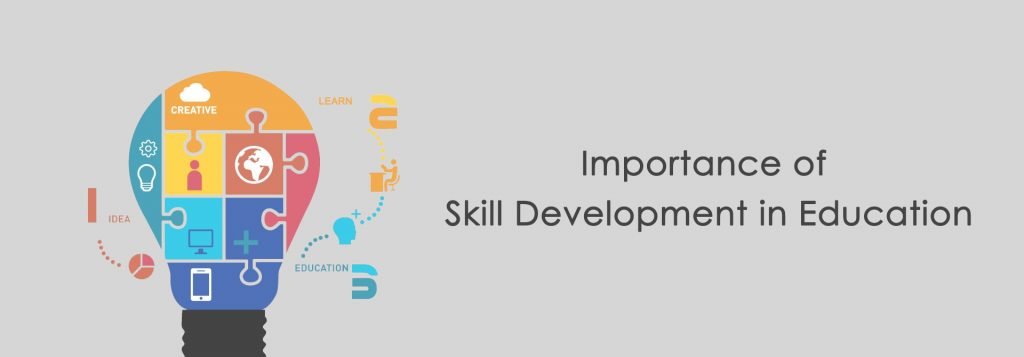
Importance of Skill Development in Education
Select Class 1st 2nd 3rd 4th 5th 6th 7th 8th 9th 10th 11th 12th
Day School Boarding School
Get In Touch With Us!

Can Social Science Matter?
- From Our Archives
Social Science and Contemporary Social Problems
Published in March of 1969, this essay by then SSRC president Henry Riecken grapples with many of the same issues raised by Prewitt and his interlocutors in “ Can Social Science Matter? ” The major upheavals of that historical moment are not discussed in any detail in Riecken’s essay, but they clearly influenced the timing and the content, as Riecken discusses how social science can contribute to addressing public problems, the differences between the social sciences and the natural sciences and engineering in this regard, and the limits to the ways in which social science can contribute given how it is organized and incentivized. Riecken concludes with an extremely prescient analysis of the ethical dimensions of certain kinds of social science work, specifically social experimentation and the collection and use of what we now call “big data.”
The social sciences, like the physical or biological sciences, are intellectual subjects, directed primarily toward understanding, rather than action. It would of course be a curious kind of “understanding” that had no implications for action, and this is perhaps especially true for the social sciences. Nevertheless, there is a difference between enlarging one’s understanding of human behavior and society on the one hand and trying to solve a social problem on the other. The social sciences are distinct from social problem solving, but each can contribute to the other.
During the last few years there has been a significant change in popular attitudes and expectations in the United States regarding social change and social problems. A renewed determination to ameliorate certain long-standing, as well as recently developed, ills of the society has arisen along with a sense of power and confidence in its ability to do so.
In looking for ways in which to implement this desire for self-control, for directed rather than accidental improvement, a good many leaders of society have begun to turn, increasingly expectant, to the social sciences. Some have asked what the social sciences can contribute to the venture. Others have assumed that these sciences have a great deal to contribute to a better society and that they need only to be force-fed (the recommended diet varies from prescriber to prescriber) in order to grow faster and to make their contribution larger.
The social sciences do have a contribution to make to social practice, but not so large a contribution as they will make if helped to develop properly. At this point in history, the magnitude of major social problems exceeds the capacity of social scientists to solve them.
Such expectations have been entertained before. In the latter part of the nineteenth century and the first decade or so of the twentieth, social scientists of the day offered advice to the progressive political and social movements of the times. As David Truman has pointed out, these political scientists and sociologists operated not only from a weak position in the political structure, but also with an almost total lack of theoretical sophistication, quite nonrigorous methods, and few facts about the systems on which they were advising. 1 David B. Truman, “The Social Sciences and Public Policy: Maturity Brings Problems of Relevance and Training,” Science , 160: 508-512, May 8, 1968. They were intellectually premature and too ready to claim relevance. Their efforts fell far short of expectations, both their own and expectations of those who, from outside the disciplines, had called upon them.
Social scientists had another try during the early years of the New Deal when economists especially, but sociologists and political scientists too, were invited into government and other institutions to develop programs, plans, and social devices for dealing with the Great Depression. The novel thinking of agricultural economists and the resultant development of institutions for what was then known as “farm relief” were considerably more successful than the efforts of the social reformers of the early 1900s had been.
One reason for the relatively greater success of the applied economics of the New Deal was that there had been developing in the United States a considerable sophistication in economics as a discipline, together with a good empirical base of data that had been accumulated over the prior decades. In comparison with today’s data base, that of the 1930s was poor and small; but it was a vast improvement over the virtual data vacuum of 1900. Another reason for the relative success was probably the degree of desperation that gripped the country and led to a willingness to try the somewhat radical measures that were proposed by economists; partly because people were willing to try the measures, they were successful. Still another opportunity for the social sciences came during World War II when psychologists and anthropologists especially made significant contributions to the prosecution of the war and the government of occupied territories.
Social scientists are currently being offered a fourth opportunity to display what they have to offer toward the solution of what is now a fairly well-standardized, if incomplete, list of problems: poverty, racial segregation and discrimination, urban decay and the strangulation of transportation, human and mechanical pollution of the environment, and a perceived increase in the incidence of crimes of violence. Will social scientists succeed better this time in living up to the expectations that face them? What can and should be done to make possible greater success?
There are several purely scientific difficulties in applying social science successfully to the solution of social problems. Limitations of space prevent their adequate discussion here. 2 These issues are taken up in the longer article in Social Science Information cited below. Their importance is such that they must at least be mentioned, however, and they require persistent scientific effort in order to improve the capacity of the social science disciplines to cope with social problems. There are three major scientific issues: so-called “Hawthorne effects” or changes in behavior which result from the fact that individuals are subjects in an experimental study; the inadequacies of existing data about social problems and individual behavior and the defects of indirect data; and finally the manipulability of social factors that are variables in social scientific analyses of problems. These are difficult scientific problems, but not impossible of solution. Furthermore, much headway can be made in applying social science without fully solving them.
Over the decades in the social sciences, the tendency has been to develop internal concerns, to define their own problems and not to accept, as their subject matter, the social problems of the contemporary and surrounding society. This tendency is attributable to forces intrinsic to the disciplines themselves, especially to conceptual redefinition of problems and to methodological or technical developments. A social scientist who undertakes to work on a practical problem, not as a wise man or a clever consultant, but as a scientist, quickly finds that the popular, or commonsense, statement of the problem is either incomplete or misleading; that “the” problem is really many problems, only some of which fall within the disciplinary or scientific scope; and that there are severe inadequacies in the methodological or technical equipment that he has for dealing with “the” practical problem. Sometimes the scientist examines the “real world” because some part of it has solved a problem and the scientist wants to know how the solution works. After he understands how it works he can sometimes improve upon the solution, but the basic movement of his thought is always away from the practical and toward abstract knowledge.
The social scientist gets driven back to more fundamental questions that bear less and less resemblance to the practical problem until they appear to be irrelevant; furthermore, some of the more fundamental questions raised in this way take on a life of their own and become genuinely dissociated from practical problems. They form, instead, the central conceptual or methodological core of the science as such. Thus, over a period of time, a social science can grow more abstract and become increasingly concerned with questions that confront it as an intellectual enterprise per se and that require solutions whether or not they bear upon the social problems of the day.
If these intrinsic intellectual forces were the only ones at work, a discipline would gradually lose all relevance. However, exogenous factors also have some influence. For example, some people become social scientists who have a genuine interest in solving social problems and retain it despite the professionalizing experiences of graduate study. Market forces are also effective, especially grants from both private foundations and government agencies to support applied social research.
The opportunity for a career in an applied field of social science is a market factor of importance. The very existence of professional economic consulting firms as private, nonacademic enterprises holds out the possibility of a career outside the academic world, and may tempt a young man who finds practical affairs more challenging than the intellectual world. The development of clinical psychology was greatly aided by the demands of the Veterans Administration directly after World War II for diagnostic and therapeutic help at its hospitals and clinics.
Another factor of importance is prestige. The social sciences are primarily academic enterprises, more so than either the biological or physical sciences, and the academic portion of the discipline is not only overwhelmingly larger than other sectors but also overpoweringly more prestigious. The physical and the biological sciences, on the other hand, have substantial nonacademic sectors that are intellectually and scientifically influential, as well as of great and evident practical importance.
The prestige which most social scientists attach to academic social science may or may not be justified but it is a fact. The low status of applied work is probably undeserved, but it too is a fact, and one that may discourage some first-rate scholars who are status conscious from entering early upon a career in applied social science. The origins of this low status lie partly in the earlier relative failures of social scientists to deal adequately and successfully with social problems. Even where applied social research has developed and has attracted competent people, it still has been applied research rather than what is called “development” (in the Research and Development sense) or “engineering.”
Most applied social research has been concentrated on the analysis of situations explaining or accounting for a given state of affairs; or the measurement of outcomes—and the degree of success of some action in reaching a stated objective. There has been less attention to preparing new means for taking action or recommending how a user should proceed in order to achieve success.
The production of recommendations for action goes beyond research and indeed beyond science, into what is properly termed “development” rather than “research,” or “engineering” rather than “science.” The distinction is more than verbal—it is a whole complex: a state of mind, institutional auspices, cross-disciplinary relations, communication with nonscientists, and employment of nonscientific resources and nonscientific skills.
“Development” or “engineering” calls primarily for an inventive and constructive attitude, more than an analytic and differentiating one. The scientist is usually trying to unscramble a given complex situation to see how its components work. An engineer is usually trying to put together a device or a process to achieve a given purpose. The scientific process is analytic; the engineering process is synthetic. The scientist’s creativity is conceptual, in producing imaginative new principles or connections between concepts. An engineer’s creativity is in tangible inventions of things or processes that have a causative or productive relationship to a desired end.
Except in very limited and spotty areas, social development or social engineering does not exist. Examples of social engineering can be found in economics in the development of fiscal and monetary policies, and in psychology in new forms of psychotherapy (especially behavior therapy), programmed instruction, human relations training, the training of managers, and the social organization of production units in firms.
Organizational influences
The development of an applied social science or a social engineering may proceed faster through professional schools (especially business and medicine) than through disciplinary departments in universities. The academically based research and teaching unit in the social sciences is affected by forces that hinder this sort of development. Some are organizational, some scientific; some derive from the institutional arrangements for the conduct of research in the social sciences. Most research is done in academic settings by part-time or short-term workers, i.e., by professors and graduate students.
The former have teaching and administrative responsibilities that take up part of their time, the latter have a primary short-term interest in completing a dissertation and getting on in the world. The former work part time on a research problem, the latter leave it for other places or other problems after a relatively short time. Thus, many social science research problems are “thesis-sized” because they are selected for that reason.
This tendency is abetted by the current system of project grants which tends to emphasize short-term investigation of discrete problems rather than long-term, exploratory and persistent pursuit of a problem, a phenomenon, or a method. The absence of a tradition of long-term research careers on a full-time basis, the inflexibility of space that makes it hard to expand and contract the size of a long-term project as such changes become necessary, the varying requirements for skilled labor in interviewing and data processing (currently eased by computer applications), all contribute to sporadic interest, easy discouragement, and lack of persistence.
On the other hand, the real basic advances in social science seem more likely to occur in settings—such as disciplinary departments—that are relatively free of the pressures to devise immediate solutions, to work with client systems, and to attend to the range of extra-scientific considerations that are involved in solving social problems. A convincing argument can be made that the most pressing needs of social science are methodological and that the greatest opportunities for strengthening the social sciences lie in improving methods of research and developing more powerful theories. Indeed, a considerable amount of the advance in social science that has taken place in the last few decades has come about through basic research of this sort, conducted in disciplinary departments.
Thus conventional disciplinary departments and institutes that are genuinely embedded in universities can be counted on to provide the social scientific underpinning for solving social problems, but should not be counted on for the actual problem-oriented work itself.
The latter task should be the responsibility of institutions that have less formidable intellectual responsibilities, and are free of the primary educational obligation. Furthermore, applied social research institutions ought to have some closer firsthand contact with social problems and the agencies that can take effective action on the problems.
Requirements for social science contributions to social problems
Where then should the responsibility for social science contributions to the solution of social problems be located? The phrasing of the question suggests part of the answer for, in the first place, a social problem rarely bears a one-to-one correspondence to social science, and almost never bears such a correspondence to any single social science discipline. All social problems are interdisciplinary in the sense that they require, for adequate solution, the efforts of more than one kind of scientist and usually of more than just scientists or engineers. Hence, the first requirement of an applied social research agency is that its professional personnel be drawn from a variety of disciplines (both within and outside the social sciences).
A second requirement, much harder to achieve, is that the assembled members of these disciplines be able to work together productively and effectively. This requirement demands first-rate scholars, not only curious about the problem at hand but also inquisitive about each other’s fields and capable of learning from each other. Willingness to listen and curiosity are more important than anything else, since transfer of training among social scientists is entirely possible, and it may even help in the solution of, say, a psychological problem if an anthropologist without any particular training in psychology gets to thinking about it.
A third requirement is that the team has full opportunity to perform its functions of engineering and development. This requires certain kinds of facilities: buildings and computers—especially adequate “software” to go with the computing machinery and all the programming and other technical help that can be provided. One of the most useful techniques in social engineering is the simulation of the social processes that are believed to underlie the social problem. In many cases these simulations will have to substitute for experimentation because of the size or other intractable features of the problem.
A fourth requirement is long-term funding commensurate with the size of the social problem. It is a commonplace of American politics that social problems must be solved quickly. We are abjured to waste no more time in eliminating segregation, discrimination, poverty, crime, and unemployment. But while sense of crisis may impel movement, a lot of it is waste motion. We are too impetuous and not persistent enough in trying to solve social problems. Problems need sustained study, trials of many different kinds of solution rather than one-shot panaceas arranged overnight by agencies that are funded on an annual basis and publicly criticized for lack of instant success.
Problems in utilization of social science
One of the most interesting points about social science contributions to the solution of social problems is that the process of introducing the changes necessary to solve the problem is in itself a problem in social science.
Before introducing changes into a quasi-stationary situation, the decision maker must consider a number of factors that affect the chances of success. First, he must consider the acceptability of his proposals to all the people involved in the situation; and the harm, damage, or deprivation that some of them may experience. Next, he must assess the effectiveness of the methods he expects to use to attract the attention and arouse willingness to explore, and the capacity he has to teach people new ways of behaving. Finally, he must try to adjust the incentive and inhibitory factors in the situation so as to stabilize the new equilibrium and maintain the change he aims to bring about. Almost all of these problems exist in one form or another in utilization of the products of biological and physical sciences, too. But these sciences have not only an engineering or developmental branch that puts their ideas into usable form, but also a marketing mechanism—a set of activities and relationships that handles these problems or is so constituted that it can afford to ignore some of them.
On the whole, the marketing mechanisms for social inventions and devices do not parallel those for physical and biological technology. There are at least three reasons for this. In the first place, until recently, there have been few social inventions or devices that could not be marketed or disseminated either through existing political mechanisms in the public sector, or through publication, or through the establishment of a professional group such as clinical psychologists. It may be that marketing mechanisms will spring up in response to the appearance of new items to be marketed.
For example, there are profit-making companies which now seem to be interested in developing and selling, as well as installing, new curricular materials and instructional procedures in the schools; and industrial firms have contracted to operate schemes for the alleviation of poverty—usually through retraining of the unskilled or underskilled. This trend has yet to be evaluated, but it could alter profoundly the nature of the process of social change. Secondly, there is difficulty in protecting property rights in intangible social technology. If the product is an idea, an attitude, a routine, it is hard to copyright and generally impossible to patent. The absence of protection of exclusive rights makes the prospect of investing in a marketing organization less attractive to an entrepreneur. Thirdly, much of the technological product of the social sciences has to do with the public rather than with the private sector of the economy, and is valuable for its distributive effect on the total society rather than for its enhancement of the quality of life of one individual at a time. Add to this the fact that a good many social inventions cannot be assigned a unit value, and one can see that the marketing mechanism must be the state in some form, rather than private enterprise.
Public policy issues in the application of social science
Some questions of public policy are raised by research and development activities in the social sciences. For example, what should be the public policy toward deliberate social experimentation, especially toward concealed experiments, in which the subjects are not aware that they are involved in an experiment? There are scientific reasons for concealment but the public policy problem is whether the probable gains from conducting such an experiment outweigh the ethical undesirability of acting in a less than open fashion. There is something repugnant about concealment of purpose, even when the motives for it are disinterested and no one is harmed. There is something upsetting about discovering that what one thought was a real and natural flow of events was instead a carefully contrived sequence of moves deliberately planned to accomplish a preconceived purpose.
The benefits to the general public welfare have to be balanced against these possible disadvantages. If experimental purpose must be concealed in order to obtain valid knowledge that will lead to improved social policies at a relatively low cost, not only in money but in mistakes and discomforts visited upon citizens, then the undesirable features of a concealed experiment may be outweighed by its advantages. The judgment cannot be made a priori for all cases; it must depend in each instance on the estimated costs and the anticipated benefits. Perhaps the more significant public policy question is: Who shall make the judgment?
On a more general level, one may raise questions in terms of a conflict between two values: the advancement of knowledge, and the personal integrity and convenience of the individual citizen. Nowhere does this conflict become more explicit than in questions concerning invasion of individual privacy, especially in regard to the collection of detailed data about individuals and their maintenance in files that are presumably to be used for research purposes.
The issues here turn around safeguards as to how the data will be used, and in how much detail the data will be kept. Briefly summarized, what has been proposed is that certain kinds of data which are now regularly collected by various agencies (central and local authorities and perhaps private agencies, too), but kept in separate files and published only in aggregated forms be made available for research purposes on a disaggregated basis.
More specifically it is proposed that data about individuals such as employment, income, savings, or expenditures be collected and stored in such a way that it would be possible to match the information from these separate series, by individuals. The anonymity of the individual and the confidentiality of the information would presumably be maintained as they are now. The data system would be used for research purposes, not for administrative ones.
Whether the very existence of a national data system would tempt those with legitimate access to make illegitimate use of the data is a much more serious question, going well beyond the data system per se. The question really turns around one’s estimate of the likelihood of “big brotherism”—of a controlling government and a controlled society, and of the role the social sciences might play in bringing about such a situation or maintaining it. As our society grows in density of population, in interdependence, in complexity and technological sophistication, the need for rational planning and for the thoughtful and foresighted management of our affairs grows apace. And so does the need for vigilance in the defense of individual liberty, since there is always, as there always has been, the tempting possibility for those in power to “simplify” their problems by wielding their power in ways that constrict freedom and constrain the less powerful.
There is no reason, however, to see the social sciences as more culpable or more threatening than other kinds of science and technological development. The power of the state is increased by the development of sophisticated weapons for its police, more efficient communication among them, and by devices that enable eavesdropping at a distance and through a wall. There are dangers in pharmacological control of behavior. Individual freedom can be abridged by the architecture of our dwellings and the design of our transportation, as well as by the laws which govern minimum wages, welfare payments, and income tax exemptions.
In fact, the social sciences can help to make us aware of threats to our freedom while giving us greater power to control our own behavior in constructive ways, helping us to be more tolerant of diversity, to learn to live together in greater harmony, less violently and more satisfyingly. If we are to reap these benefits, however, we must work at understanding ourselves and our society, at perfecting a social science that is capable of meeting the challenges of our future.
Henry W. Riecken (1917–2012) was an eminent social scientist who served as president of the Social Science Research Council between 1966 and 1971. He was also the first director of the National Science Foundation’s social science division. He also served on the faculties of Harvard University, University of Minnesota, and University of Pennsylvania.
This essay originally appeared in Items Vol. 23, Issue 1 in the spring of 1969. Visit our archives to view the original as it first appeared in the print editions of Items .

You may also like
We are to blame for the state of social science research, landed property rights and global environmental change, puzzles of global environmental change.
Thank you for visiting nature.com. You are using a browser version with limited support for CSS. To obtain the best experience, we recommend you use a more up to date browser (or turn off compatibility mode in Internet Explorer). In the meantime, to ensure continued support, we are displaying the site without styles and JavaScript.
- View all journals
- Explore content
- About the journal
- Sign up for alerts
- Published: 22 August 2024
Conceptual structure and the growth of scientific knowledge
- Kara Kedrick ORCID: orcid.org/0000-0002-3410-5834 1 ,
- Ekaterina Levitskaya 2 &
- Russell J. Funk ORCID: orcid.org/0000-0001-6670-4981 3
Nature Human Behaviour ( 2024 ) Cite this article
86 Accesses
12 Altmetric
Metrics details
- Computer science
- Science, technology and society
How does scientific knowledge grow? This question has occupied a central place in the philosophy of science, stimulating heated debates but yielding no clear consensus. Many explanations can be understood in terms of whether and how they view the expansion of knowledge as proceeding through the accretion of scientific concepts into larger conceptual structures. Here we examine these views empirically by analysing 2,605,224 papers spanning five decades from both the social sciences (Web of Science) and the physical sciences (American Physical Society). Using natural language processing techniques, we create semantic networks of concepts, wherein noun phrases become linked when used in the same paper abstract. We then detect the core/periphery structures of these networks, wherein core concepts are densely connected sets of highly central nodes and periphery concepts are sparsely connected nodes that are highly connected to the core. For both the social and physical sciences, we observe increasingly rigid conceptual cores accompanied by the proliferation of periphery concepts. Subsequently, we examine the relationship between conceptual structure and the growth of scientific knowledge, finding that scientific works are more innovative in fields with cores that have higher conceptual churn and with larger cores. Furthermore, scientific consensus is associated with reduced conceptual churn and fewer conceptual cores. Overall, our findings suggest that while the organization of scientific concepts is important for the growth of knowledge, the mechanisms vary across time.
This is a preview of subscription content, access via your institution
Access options
Access Nature and 54 other Nature Portfolio journals
Get Nature+, our best-value online-access subscription
24,99 € / 30 days
cancel any time
Subscribe to this journal
Receive 12 digital issues and online access to articles
111,21 € per year
only 9,27 € per issue
Buy this article
- Purchase on SpringerLink
- Instant access to full article PDF
Prices may be subject to local taxes which are calculated during checkout

Similar content being viewed by others
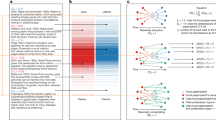
Papers and patents are becoming less disruptive over time
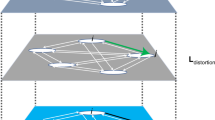
Leading countries in global science increasingly receive more citations than other countries doing similar research
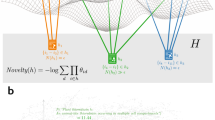
Surprising combinations of research contents and contexts are related to impact and emerge with scientific outsiders from distant disciplines
Data availability.
The WoS data and the APS data are available from the Web of Science and the American Physical Society, respectively, but restrictions apply to the availability of these data, which were used under licence for the current study and so are not publicly available. If you are interested in accessing the WoS data, you can request access to the API through Clarivate, which requires an additional subscription or permission ( https://clarivate.com/products/scientific-and-academic-research/research-discovery-and-workflow-solutions/webofscience-platform/web-of-science-core-collection/ ). For access to the APS data, you can request permission directly from their website ( https://journals.aps.org/datasets/ ).
Code availability
The Python v.3 and Stata v.18 code we used to analyse and visualize the data for the current study are publicly available via Zenodo at https://doi.org/10.5281/zenodo.11533199 (ref. 49 ).
Price, D. J. d. S. Science since Babylon (Yale Univ. Press, 1961).
Price, D. J. d. S. Little Science, Big Science (Columbia Univ. Press, 1963).
Bornmann, L., Devarakonda, S., Tekles, A. & Chacko, G. Are disruption index indicators convergently valid? The comparison of several indicator variants with assessments by peers. Quant. Sci. Stud. 1 , 1242–1259 (2020).
Article Google Scholar
Milojević, S. Quantifying the cognitive extent of science. J. Informetr. 9 , 962–973 (2015).
Tabah, A. N. Literature dynamics: studies on growth, diffusion, and epidemics. Annu. Rev. Inf. Sci. Technol. 34 , 249–286 (1999).
Google Scholar
Kuhn, T. S. The Structure of Scientific Revolutions (Univ. Chicago Press, 1962).
Lakatos, I. & Musgrave, A. Criticism and the Growth of Knowledge: Proceedings of the International Colloquium in the Philosophy of Science, London, 1965 Vol. 4 (Cambridge Univ. Press, 1970).
Laudan, L. Progress and Its Problems: Toward a Theory of Scientific Growth (Univ. California Press, 1978).
Popper, K. R. Conjectures and Refutations: The Growth of Scientific Knowledge (Routledge & Kegan Paul, 2002).
Cole, S. Why sociology doesn’t make progress like the natural sciences. Sociol. Forum 9 , 133–154 (1994).
Cole, S. Disciplinary knowledge revisited: the social construction of sociology. Am. Sociol. 37 , 41–56 (2006).
Gonzalez, W. J. Prediction and Novel Facts in the Methodology of Scientific Research Programs 103–124 (Springer International, 2015).
Chu, J. S. G. & Evans, J. A. Slowed canonical progress in large fields of science. Proc. Natl Acad. Sci. USA 118 , e2021636118 (2021).
Article CAS PubMed PubMed Central Google Scholar
Newman, M. E. J. Scientific collaboration networks. ii. Shortest paths, weighted networks, and centrality. Phys. Rev. E 64 , 016132 (2001).
Article CAS Google Scholar
Latour, B. Science in Action: How to Follow Scientists and Engineers through Society (Harvard Univ. Press, 1987).
Lakatos, I., Worrall, J., Currie, G. & Currie, P. The Methodology of Scientific Research Programmes: Philosophical Papers Vol. 1 (Cambridge Univ. Press, 1978).
Kojaku, S. & Masuda, N. Finding multiple core–periphery pairs in networks. Phys. Rev. E 96 , 052313 (2017).
Article PubMed Google Scholar
Borgatti, S. P. & Everett, M. G. Models of core/periphery structures. Soc. Netw. 21 , 375–395 (2000).
Funk, R. J. & Owen-Smith, J. A dynamic network measure of technological change. Manage. Sci. 63 , 791–817 (2017).
Mulkay, M. J., Gilbert, G. N. & Woolgar, S. Problem areas and research networks in science. Sociology 9 , 187–203 (1975).
Wimsatt, W. C. Reductionism and its heuristics: making methodological reductionism honest. Synthese 151 , 445–475 (2006).
Wu, L., Wang, D. & Evans, J. A. Large teams develop and small teams disrupt science and technology. Nature 566 , 378–382 (2019).
Article CAS PubMed Google Scholar
Shwed, U. & Bearman, P. S. The temporal structure of scientific consensus formation. Am. Sociol. Rev. 75 , 817–840 (2010).
Article PubMed PubMed Central Google Scholar
Mayo, L. C., McCue, S. W. & Moroney, T. J. Gravity-driven fingering simulations for a thin liquid film flowing down the outside of a vertical cylinder. Phys. Rev. E 87 , 053018 (2013).
Jones, B. F. The burden of knowledge and the ‘death of the Renaissance Man’: is innovation getting harder? Rev. Econ. Stud. 76 , 283–317 (2009).
Gordon, R. J. The Rise and Fall of American Growth: The U.S. Standard of Living since the Civil War revised edn (Princeton Univ. Press, 2016).
Bhattacharya, J. & Packalen, M. Stagnation and Scientific Incentives Working Paper No. 26752 (National Bureau of Economic Research, 2020).
Fink, T., Reeves, M., Palma, R. & Farr, R. S. Serendipity and strategy in rapid innovation. Nat. Commun. 8 , 2002 (2017).
Tria, F., Loreto, V., Servedio, V. & Strogatz, S. The dynamics of correlated novelties. Sci. Rep. 4 , 5890 (2014).
Bloom, N., Jones, C. I., Van Reenen, J. & Webb, M. Are ideas getting harder to find? Am. Econ. Rev. 110 , 1104–1144 (2020).
Horgan, J. The End of Science: Facing the Limits of Knowledge in the Twilight of the Scientific Age (Basic Books, 2015).
Jones, B. F. & Weinberg, B. A. Age dynamics in scientific creativity. Proc. Natl Acad. Sci. USA 108 , 18910–18914 (2011).
Duncker, K. On problem solving. Psychol. Monogr . 58 , i–113 (1945).
Jansson, D. G. & Smith, S. M. Design fixation. Des. Stud. 12 , 3–11 (1991).
Maier, N. R. F. Reasoning in humans: II. The solution of a problem and its appearance in consciousness. J. Compar. Psychol. 12 , 181–194 (1931).
Smith, S. M., Ward, T. B. & Schumacher, J. S. Constraining effects of examples in a creative generation task. Mem. Cogn. 21 , 837–845 (1993).
Cole, S. Making Science: Between Nature and Society (Harvard Univ. Press, 1995).
Van Rossum, G. & Drake, F. L. Python 3 Reference Manual. (CreateSpace, 2009).
MariaDB Foundation. MariaDB. https://mariadb.com/ (2023).
Mongeon, P. & Paul-Hus, A. The journal coverage of Web of Science and Scopus: a comparative analysis. Scientometrics 106 , 213–228 (2016).
Tennant, J. P. Web of Science and Scopus are not global databases of knowledge. Eur. Sci. Ed. 46 , e51987 (2020).
Christianson, N. H., Sizemore Blevins, A. & Bassett, D. S. Architecture and evolution of semantic networks in mathematics texts. Proc. R. Soc. A 476 , 20190741 (2020).
Dworkin, J. D., Shinohara, R. T. & Bassett, D. S. The emergent integrated network structure of scientific research. PLoS ONE 14 , e0216146 (2019).
Rule, A., Cointet, J.-P. & Bearman, P. S. Lexical shifts, substantive changes, and continuity in State of the Union discourse, 1790–2014. Proc. Natl Acad. Sci. USA 112 , 10837–10844 (2015).
Honnibal, M., Montani, I., Van Landeghem, S. & Boyd, A. spaCy: industrial-strength natural language processing in Python. Zenodo https://zenodo.org/records/10009823 (2020).
DeWilde, B. textacy documentation (Chartbeat, Inc., 2021).
Hofstra, B. et al. The diversity–innovation paradox in science. Proc. Natl Acad. Sci. USA 117 , 9284–9291 (2020).
Kojaku, S. & Masuda, N. Core–periphery structure requires something else in the network. New J. Phys. 20 , 043012 (2018).
Kedrick, K., Levitskaya, E. & Funk, R. J. Conceptual structure and the growth of scientific knowledge. Zenodo https://doi.org/10.5281/zenodo.11533199 (2024).
Davis, R. L. Quantum turbulence. Phys. Rev. Lett. 64 , 2519–2522 (1990).
Download references
Acknowledgements
We thank the National Science Foundation for financial support of work related to this project (grants no. 1829168 to R.J.F and no. 1932596 to R.J.F). The funders had no role in study design, data collection and analysis, decision to publish or preparation of the manuscript. We also thank D. Hirschman, M. Park and Y. J. Kim for feedback on an earlier version of this work, and T. Gebhart for many helpful conversations and assistance with data and computation. Our work was presented as a poster at the 2nd Annual International Conference on the Science of Science and Innovation, as a poster at the 43rd Annual Meeting of the Cognitive Science Society, as a lightning talk at Networks 2021: A Joint Sunbelt and NetSci Conference, and as a poster at the 3rd North American Social Networks Conference.
Author information
Authors and affiliations.
Institute for Complex Social Dynamics, Carnegie Mellon University, Pittsburgh, PA, USA
Kara Kedrick
The Coleridge Initiative, New York, NY, USA
Ekaterina Levitskaya
Carlson School of Management, University of Minnesota, Minneapolis, MN, USA
Russell J. Funk
You can also search for this author in PubMed Google Scholar
Contributions
The study was conceptualized and designed by K.K., E.L. and R.J.F. The data analysis was conducted by K.K. and R.J.F. The manuscript was initially drafted by K.K., E.L. and R.J.F., with subsequent revisions made by K.K. and R.J.F.
Corresponding author
Correspondence to Russell J. Funk .
Ethics declarations
Competing interests.
The authors declare no competing interests.
Peer review
Peer review information.
Nature Human Behaviour thanks Sadamori Kojaku, Marc Santolini and the other, anonymous, reviewer(s) for their contribution to the peer review of this work.
Additional information
Publisher’s note Springer Nature remains neutral with regard to jurisdictional claims in published maps and institutional affiliations.
Extended data
Extended data fig. 1 concepts extracted from the text of an abstract..
This figure shows an example abstract from the APS data; the highlighted text indicates single-word and multi-word noun phrases identified as concepts using our extraction algorithm. Reproduced with permission from ref. 50 , American Physical Society.
Supplementary information
Supplementary information.
Supplementary Figs. 1–9 and Tables 1–3.
Reporting Summary
Rights and permissions.
Springer Nature or its licensor (e.g. a society or other partner) holds exclusive rights to this article under a publishing agreement with the author(s) or other rightsholder(s); author self-archiving of the accepted manuscript version of this article is solely governed by the terms of such publishing agreement and applicable law.
Reprints and permissions
About this article
Cite this article.
Kedrick, K., Levitskaya, E. & Funk, R.J. Conceptual structure and the growth of scientific knowledge. Nat Hum Behav (2024). https://doi.org/10.1038/s41562-024-01957-x
Download citation
Received : 29 September 2022
Accepted : 16 July 2024
Published : 22 August 2024
DOI : https://doi.org/10.1038/s41562-024-01957-x
Share this article
Anyone you share the following link with will be able to read this content:
Sorry, a shareable link is not currently available for this article.
Provided by the Springer Nature SharedIt content-sharing initiative
Quick links
- Explore articles by subject
- Guide to authors
- Editorial policies
Sign up for the Nature Briefing: AI and Robotics newsletter — what matters in AI and robotics research, free to your inbox weekly.
Social sciences play a pivotal role in fostering cultural awareness, celebrating diversity, and challenging stereotypes. Through the lenses of anthropology and cultural studies, we explore the richness of human traditions, languages, and belief systems, fostering mutual respect and cross-cultural understanding.
Conclusion. Social science, far from being an abstract academic pursuit, is an integral part of our daily lives. It informs our understanding of human behavior, shapes public policies, enhances personal finance decisions, addresses societal issues, and fosters global citizenship. Moreover, it nurtures critical thinking, informs ethical values ...
In conclusion, the importance of social science in our daily life cannot be overstated. It empowers us to understand human behavior, make informed decisions, formulate effective policies, and contribute to a more just and equitable society. Social science enhances our critical thinking skills, broadens our perspectives, and enriches our ...
Nowadays, social science study plays an important role in the development of a country that has knowledgeable society and healthy society. Social science refers to any scientific study about human interaction and action that focus on the behavior and thought which it is known as social. Research in social science is widely where it will bring ...
8 Reasons Why Social Studies Is Important For Students. Students learn skills through social studies that help them succeed in further education as well as life. Here are all the amazing ways learning social studies benefits kids and society together: 1. Better Reading And Learning. Social studies is one area in education where content ...
The contemporary world faces numerous challenges, and sociology's scientific approach is essential for studying and solving social problems. Sociology has enriched human culture by providing a scientific understanding of social phenomena. It encourages rational thinking, objectivity, critical analysis, and empathy.
The social sciences are made up of lots of different disciplines and sub-disciplines, which focus on different aspects of society. The social sciences are a 'broad church', including lots of different disciplinary and sub-disciplinary areas. These include, for example, sociology, anthropology, criminology, archaeology, social policy, human ...
Within the social sciences, economists focus on the 'wealth of nations' - and how this is generated and distributed.[2] Political scientists are concerned with ideas of power, justice, liberty and representation - and how these ideas get translated into policies that are then implemented at national and other levels.
In the light of the above, we can identify four golden rules for effective social scientific essay writing. Rule 1: Answer the question that is asked. Rule 2: Write your answer in your own words. Rule 3: Think about the content of your essay, being sure to demonstrate good social scientific skills.
Supported by the Academy of Social Sciences; Champions the importance of the social sciences in our continued understanding of the world; Contains contributions from leading social scientists at the cutting-edge of their respective fields; Advocates the pursuit of evidence-based policy through systematic scholarly investigation
Social sciences are a group of academic disciplines that examine society and how people interact and develop as a culture. Social science as a field of study is separate from the natural sciences ...
Social science is a study of society and how the people behave in a certain way and how they influence the world. The study of social sciences equips individuals with tools to improve understanding of the issues related to people and society and to explore solutions to our problems. It helps in the evolution and approaches toward problem ...
The Importance of Social Science in The School Curriculum. Social science plays a crucial role in the school curriculum as they equip students with essential knowledge and skills relevant to their academic success and personal and professional growth. Here are some key reasons why social science is important for school students:
The Role of Social Sciences and Humanities Disciplines in Response to Societal Problems. There is some controversy about the role that SSH research can play in tackling societal problems: While some scholars argue that these fields should augment and emphasize their transformative potential (Sörlin, 2018; Sigurðarson, 2020), others attribute a rather passive role to them, suggesting that ...
Social Science helps the students to know the importance of democracy, freedom and rights and how to live in society. It makes the student responsible, active and reflective towards the society. And also makes the students well informed about the culture, religion and society; in short, it makes the student well-informed citizen.
Overall, it is impossible to ignore the myriad ways in which social science helps us understand, create, and engage with the institutions that shape our lives. Put simply, the social sciences are important because they create better institutions and systems that affect people's lives every day. Creating frameworks for understanding the ...
Another factor of importance is prestige. The social sciences are primarily academic enterprises, more so than either the biological or physical sciences, and the academic portion of the discipline is not only overwhelmingly larger than other sectors but also overpoweringly more prestigious. ... This essay originally appeared in Items Vol. 23 ...
THE SOCIAL SCIENCES HALLMARKS OF MODERNITY In this essay, I argue for the importance of the social sciences for understanding the contemporary world. We are increasingly overwhelmed by the easy availability of information, much of whose reliability is uncertain. Previously stable institutions, values, and practices are in
The Importance Of Social Science. According to Bhattacherjee (2012), the social science is the science of people or collections of people, and their individual or collective behaviors. Social sciences can be divided into areas such as psychology, and economics for the science. After all, the statistical surveys and research methodologies in ...
Rule 1: Rule 2: Rule 3: Rule 4: Answer the question that is asked. Write your answer in your own words. Think about the content of your essay, being sure to demonstrate good social scientific skills. Think about the structure of your essay, being sure to demonstrate good writing skills, and observing any word limit. @.
vices' guide on Topic Analy. is.3. Understanding Criteria SheetsIn addition to the set question, you will also have a criteria sheet, by which your essay will. be marked by your lecturer or tutor. The criteria include important informat. n on what is expected of your work.Criteria sheets will differ betw.
Here we examine these views empirically by analysing 2,605,224 papers spanning five decades from both the social sciences (Web of Science) and the physical sciences (American Physical Society).
- business plan
- course work
- research paper
Please use a modern browser to view this website. Some elements might not work as expected when using Internet Explorer.
- Landing Page
- Luxury Yacht Vacation Types
- Corporate Yacht Charter
- Tailor Made Vacations
- Luxury Exploration Vacations
- View All 3706
- Motor Yachts
- Sailing Yachts
- Classic Yachts
- Catamaran Yachts
- Filter By Destination
- More Filters
- Latest Reviews
- Charter Special Offers
- Destination Guides
- Inspiration & Features
- Mediterranean Charter Yachts
- France Charter Yachts
- Italy Charter Yachts
- Croatia Charter Yachts
- Greece Charter Yachts
- Turkey Charter Yachts
- Bahamas Charter Yachts
- Caribbean Charter Yachts
- Australia Charter Yachts
- Thailand Charter Yachts
- Dubai Charter Yachts
- Destination News
- New To Fleet
- Charter Fleet Updates
- Special Offers
- Industry News
- Yacht Shows
- Corporate Charter
- Finding a Yacht Broker
- Charter Preferences
- Questions & Answers
- Add my yacht

- Yacht Charter Fleet
Heesen deliver 80m superyacht GENESIS to her new owner
- Share this on Facebook
- Share this on X
- Share via Email
By Katie Scott 4 September 2023
Dutch shipyard Heesen has successfully delivered the stunning 80m (262ft) superyacht GENESIS to her new owner, setting a new benchmark for the yard as the biggest yacht they have built to date.
Surpassing the previous record holders of Galactica Super Nova at 70m (229.6ft) and charter yacht ILLUSION at 65m (213ft), the new flagship is a custom-built motor yacht with design collaborations from Van Oossanen Naval Architects, Winch Design, and Sinot Yacht Architecture and Design. Embodying the classic, sporty DNA of the Heesen fleet, GENESIS is undeniably a true Heesen superyacht but with a contemporary and almost futuristic twist on previous builds.

Sporting a six-cabin layout, superyacht GENESIS hosts an army of indulgent features and amenities including a fully certified touch-and-go helipad that can also transform into an outdoor cinema, a glass-bottomed swimming pool, abundant exterior deck space for socializing and relaxing in the Mediterranean sun, plus an on-deck Jacuzzi and WiFi connectivity.

Enabling the owner and their guests seamless access to the sea, motor yacht GENESIS has a generous beach club environment with a wet bar, in addition to plenty of storage for adrenaline-fuelled water toys.
Currently, it is not expected that M/Y GENESIS will be made available for charter. However, if you’re interested in chartering a yacht of a similar caliber, you can view and compare all Heesen superyachts for charter .
For more details on booking a luxury yacht charter , speak to your preferred yacht charter broker today.
Heesen yachts for charter

50m Heesen 2021

51m Heesen 2014 / 2023

51m Heesen 2018

65m Heesen 2013 / 2019

55m Heesen 2011 / 2022

55m Heesen 2012 / 2018
- READ MORE ABOUT:
RELATED STORIES

Previous Post
Bilgin Yachts unveils first look images of Project Ame interiors
Immerse yourself in an indulgent Caribbean yacht charter with M/Y GALAXY

EDITOR'S PICK

Latest News

18 September 2024

17 September 2024

16 September 2024
- See All News
Yacht Reviews

- See All Reviews

Charter Yacht of the week
Join our newsletter
Useful yacht charter news, latest yachts and expert advice, sent out every fortnight.
Please enter a valid e-mail
Thanks for subscribing
Featured Luxury Yachts for Charter
This is a small selection of the global luxury yacht charter fleet, with 3706 motor yachts, sail yachts, explorer yachts and catamarans to choose from including superyachts and megayachts, the world is your oyster. Why search for your ideal yacht charter vacation anywhere else?

446ft | Lurssen
from $3,328,000 p/week ♦︎

378ft | Lurssen
from $2,874,000 p/week ♦︎

279ft | Golden Yachts
from $1,001,000 p/week ♦︎

289ft | Golden Yachts
from $1,222,000 p/week ♦︎

274ft | Feadship
from $1,113,000 p/week ♦︎

305ft | Feadship
from $1,556,000 p/week ♦︎

Maltese Falcon
289ft | Perini Navi
from $490,000 p/week

400ft | Lurssen
from $3,000,000 p/week
As Featured In
The YachtCharterFleet Difference
YachtCharterFleet makes it easy to find the yacht charter vacation that is right for you. We combine thousands of yacht listings with local destination information, sample itineraries and experiences to deliver the world's most comprehensive yacht charter website.
San Francisco
- Like us on Facebook
- Follow us on Twitter
- Follow us on Instagram
- Find us on LinkedIn
- Add My Yacht
- Affiliates & Partners
Popular Destinations & Events
- St Tropez Yacht Charter
- Monaco Yacht Charter
- St Barts Yacht Charter
- Greece Yacht Charter
- Mykonos Yacht Charter
- Caribbean Yacht Charter
Featured Charter Yachts
- Maltese Falcon Yacht Charter
- Wheels Yacht Charter
- Victorious Yacht Charter
- Andrea Yacht Charter
- Titania Yacht Charter
- Ahpo Yacht Charter
Receive our latest offers, trends and stories direct to your inbox.
Please enter a valid e-mail.
Thanks for subscribing.
Search for Yachts, Destinations, Events, News... everything related to Luxury Yachts for Charter.
Yachts in your shortlist

- Impressions

(built as Queen M)
Delivered in 2004, the 73-metre yacht CLIO was designed for long voyages around the world and self-sufficient living for several months at a time. With a stately beam of 14 metres, she offers generous spaces and supreme comfort. Her exterior was drawn by Espen Øino while Donald Starkey designed the interior.

Do you wish to talk about yacht design?
We would love to hear from you

- International
«Die Geissens» tricksen – wem ihre Yacht wirklich gehört

Das Wichtigste in Kürze
- Sind «Die Geissens» gar nicht so reich, wie sie tun?
- Die Luxus-Yacht der Familie soll gar nicht ihnen allein gehören.
Im TV und auf Social Media protzen die «Geissens» gerne und oft mit ihrem glamourösen Lebensstil. Ob feines Essen, teure Reisen oder eine eigene Yacht – die Selfmade-Millionäre haben alles, was das Herz begehrt.
Nun sorgt aber ein Bericht vom «Business Insider» für Wirbel. Demnach soll die Familie um Robert Geiss (59) Schulden in Millionenhöhe haben . Verschiedene Firmen der «Geissens» sollen in den Jahren 2019 und 2020 keinen Gewinn und sogar Verluste gemacht haben.
Wie die «Bild» berichtet, ist bei der TV-Familie auch sonst nicht alles Gold, was glänzt. Die 38-Meter-Yacht «Indigo Star» soll gar nicht Robert Geiss selber gehören, sondern der «Ghost Shipping Company S.A». Dahinter stehen Personen mit Firmensitz im Steuerparadies, der Isle of Man.
Wie hoch Roberts Anteile am Unternehmen sind? Unklar. Die Yacht kann zudem für 15'000 Euro pro Tag von Privatpersonen gemietet werden – also bestimmt sehr lukrativ ...
Mögen Sie Luxus?
Mehr zum thema:.

Deine Reaktion?
Weiterlesen.

«Geissens» empört Sender RTL II streicht Wendler-Doku nach Protest

Shania & Davina So füllen die «Geissens»-Girls ihre Konten

Hohe Schulden So steht es wirklich um die Finanzen von Robert Geiss

Promotion Tauche mit «Ohlala» in die verführerische Show-Welt ein

In Berlin (D) Polizeieinsatz bei Dreharbeiten von Kai Pflaume

Auf Abwegen Strafmassverkündung gegen Präsidentensohn Hunter Biden später

«Operation gelungen» Carmen Geiss meldet sich aus dem Spitalbett

Sexuelle Belästigung Heftige Vorwürfe gegen französischen Star-Kicker

Sieg über Auxerre Captain Denis Zakaria erneut Torschütze für Monaco

Rückversicherung Hannover Rück sieht Ende des Preisanstiegs

The global authority in superyachting
- NEWSLETTERS
- Yachts Home
- The Superyacht Directory
- Yacht Reports
- Brokerage News
- The largest yachts in the world
- The Register
- Yacht Advice
- Yacht Design
- 12m to 24m yachts
- Monaco Yacht Show
- Builder Directory
- Designer Directory
- Interior Design Directory
- Naval Architect Directory
- Yachts for sale home
- Motor yachts
- Sailing yachts
- Explorer yachts
- Classic yachts
- Sale Broker Directory
- Charter Home
- Yachts for Charter
- Charter Destinations
- Charter Broker Directory
- Destinations Home
- Mediterranean
- South Pacific
- Rest of the World
- Boat Life Home
- Owners' Experiences
- Conservation and Philanthropy
- Interiors Suppliers
- Owners' Club
- Captains' Club
- BOAT Showcase
- Boat Presents
- Events Home
- World Superyacht Awards
- Superyacht Design Festival
- Design and Innovation Awards
- Young Designer of the Year Award
- Artistry and Craft Awards
- Explorer Yachts Summit
- Ocean Talks
- The Ocean Awards
- BOAT Connect
- Between the bays
- Golf Invitational
- BOATPro Home
- Superyacht Insight
- Global Order Book
- Premium Content
- Product Features
- Testimonials
- Pricing Plan
- Tenders & Equipment

In pictures: 73m Lürssen Coral Ocean completes major €35m refit
The 73 metre Lürssen superyacht Coral Ocean has been pictured for the first time following a major €35 million refit at the Astilleros de Mallorca shipyard.
She was delivered as Coral Island by Lürssen in 1994 and was one of the yard's biggest projects at the time. Jon Bannenberg, often considered the godfather of modern yacht design, was responsible for her exterior profile. The yacht cruised privately for most of her life until she changed hands at the 2019 Monaco Yacht Show. She was purchased as Coral Ocean by Australian entrepreneur Ian Malouf who embarked on a "no expense spared" refit.
Coral Ocean made her post-refit debut at the 2022 Monaco Grand Prix and is now available for Mediterranean charters with the Ahoy Club.
"We spent just one week on Coral Ocean straight after purchasing her at the 2019 Monaco Yacht Show, which was the fastest sale in superyacht history, and this gave us enough time to decide we were going to completely transform her," said Malouf. "The pandemic has served us a good period of time to rebuild the yacht with no shortcuts. What could have been a challenging task managing the rebuild via video from Australia was made almost seamless by our fantastic team on the ground in Palma and awesome technology."
The sundeck was a central part of the yacht's refit work and was rebuilt entirely to create an open and flexible space. The removal of the old communication domes allowed for the deck to be extended and increase the volume of Coral Ocean by approximately 120GT. The forward portion of the sundeck features a redesigned spa pool with a glass bottom, courtesy of the Four Seasons, surrounded by glass balustrades for protection from the elements without compromising the view.
Under the shade of a hard top is a sit-up bar, casual dining area and lounge that can be enclosed by floor-to-ceiling retractable glass windows, or left fully open for a single indoor-outdoor space. Sun pads are found forward of the Jacuzzi dressed in Dedar fabric with an umbrella that offers shade as required, while an 85-inch television offers the perfect set-up for movie nights. To top it off, there is a convertible indoor sunbed positioned beneath an electric sunroof.
The redesign of the interior builds on a Bannenberg & Rowell outfitting following a refit in 2015. Each space is fresh and bright with white reflective surfaces with accents of marine blues and greens. Coral Ocean can accommodate up to 12 guests in total across six staterooms, as before, but each cabin has been elevated and redesigned.
The master suite underwent the greatest transformation and now functions as a private apartment on the owner's deck. The space has doubled in size and now welcomes more light thanks to its two skylights – one above the super-king-sized berth and one at the entryway. The forward windows were also transformed by extending the glass to offer 180-degree views. The suite is complete with his and hers en suite bathrooms, an infrared sauna, a hair salon and a private lounge area with an adjoining treatment room.
Another cabin of note is the VIP suite which gives the master suite a run for its money. It has its own lounge upon entry that can double as a cinema room or office space. The remaining guest accommodation can be found on the lower deck and is comprised of four cabins.
Dining and entertaining spaces on board were fine-tuned during the refit, in particular the dining space on the aft deck. Sliding glass and heated ceiling panels provide protection from the wind and offer an indoor-outdoor dining experience. At the centre is a Paola Lenti table that seats 12, with two retractable lounge tables that allow for a party of 32 to dine all together, complemented by two bars, a pizza oven and a tepanyaki grill. Should the weather take a turn, a formal interior dining room seats up to 14 guests with a glass-fronted wine cellar to one side and sea views to the other.
Another notable area is the main saloon which features its original five-metre opening shell door that creates a balcony over the sea and a newly created sky lounge with curved sofas and a bar. Guests looking to keep active on board will enjoy the indoor-outdoor gym overlooking the ocean or take a dip in the 15-metre Funair sea-pool extension off the swim platform. Alternatively, those looking to relax can enjoy a spare area on the lower deck and a steam room fitted with mosaic tiles that form a jellyfish mural.
The Malouf family is no stranger to large-scale refits after transforming their 52.5 metre Baglietto motor yacht Mischief in 2016. Coral Ocean was the latest European upgrade for Malouf, who had simultaneously sent Mischief to the Southern Hemisphere from her base in Sydney, Australia. Malouf’s current fleet includes boats such as Rascal , Chaos , Double Trouble and Cheeky .
Speaking on the results of Coral Ocean 's, Malouf added: “ Coral Ocean has truly been transformed; she represents luxury in every way. The ability to accommodate up to twelve guests across six beautiful staterooms remains unchanged. However, all guestrooms and amenities have now been elevated to be of equal quality leaving every guest on board feeling like the owner. This is a unique proposition within the charter industry.”
Coral Ocean will now join the Ahoy Club, an online booking platform coined the AirBnB of chartering with a 4,000-strong fleet of vessels.
Sign up to BOAT Briefing email
Latest news, brokerage headlines and yacht exclusives, every weekday
By signing up for BOAT newsletters, you agree to our Terms of Use and our Privacy Policy .
More about this yacht
More stories, most popular, from our partners, sponsored listings.
- Promi & Show
Luxus-Yacht „Indigo Star“ – darum gehört das Schiff gar nicht den Geissens
Stand: 18.09.2024, 04:58 Uhr
Von: Sarah Isele
Die bekannte Luxus-Yacht der Geissens „Indigo Star“ ist oft bei ihrer Sendung im TV zu sehen. Doch nun stellt sich heraus, dass das Boot gar nicht der Familie selbst gehört.
Wer regelmäßig RTLZWEI schaut, wird diese Familie garantiert kennen. Die Geissens sind schrecklich glamourös – und auch schrecklich reich. Ihren Reichtum stellen sie gerne bei „Die Geissens – Eine schrecklich glamouröse Familie“ zur Schau und nehmen die Zuschauer mit auf ihre Reisen durch die Welt. Die Familie besteht aus Vater Robert, Mutter Carmen und den beiden Töchtern Davina und Shania. Auch die Yacht der Familie ist in vielen Folgen zu sehen und gilt schon als das „Wohnzimmer“ der Familie. Doch das Prunk-Schiff gehört ihnen gar nicht.
Luxus-Yacht gehört nicht den Geissens: Der Reichtum der Familie
Wer die Geissens kennt, weiß auch ganz genau, dass die Familie gerne mal mit ihrem Prunk prahlt. Dabei sollte man auch wissen, dass Vater Robert ein echter Self-Made-Millionär ist, da er bereits in den 80er Jahren zusammen mit seinem Bruder sein eigenes Mode-Label eröffnet hat, welches er neun Jahre später wieder verkaufte. Aber auch Carmen und die Töchter Davina und Shania bringen Kohle nach Hause – so sind die Geissens reich geworden .
Aucht gibt Papa Robert Geiss in einem Podcast des OMR preis: „Die 100 Millionen habe ich voll. Das ist die Rente, das ist die Basis, damit ich auch mit 70 noch ruhig leben kann.“ Tatsächlich ist, laut dem Wirtschaftsmagazin Business Insider , über die Zeit bei den Geissens ein Firmenimperium entstanden. Laut dem Magazin stecken die Geissens aber auch in Schulden in Millionenhöhe und auch die Yacht „Indigo Star“ scheint nicht der Familie selbst zu gehören. Ist alles also mehr Schein als Sein?
Luxus-Yacht gehört nicht den Geissens: Business Insider enthüllt Schuldenlage
Ein Bericht von Business Insider hat enthüllt, dass mehrere Firmen, an denen die Geissens beteiligt ist, in den Jahren 2019 und 2020 keinen Gewinn oder sogar Verluste gemacht haben, wodurch Schulden in Millionenhöhe entstanden. Dabei seien die Familie Geiss und ihr Privatvermögen aber nicht von einer Pleite bedroht. Robert Geiss gilt als cleverer Geschäftsmann, der in verschiedene Firmen investiert. Darunter auch in die CapBridge Ventures GmbH, die sich als Fehlinvestition herausstellte.
Die Frage, ob die Geissens doch nicht so reich sind, wie sie sich in ihrer RTLZWEI -Sendung geben, stellt sich nun. Insbesondere da nun enthüllt wurde, dass die Luxus-Yacht „Indigo Star“, die auch immer mal ein Hauptdarsteller der Show ist, gar nicht der Familie selbst gehört. Doch wem gehört das Prunk-Schiff?
Interessiert Dich bestimmt auch

Luxus-Yacht gehört nicht den Geissens: Schiff ist im Besitz der Ghost Shipping Company S.A.
Das 38 Meter-Boot kann bis zu 10 Gäste beherbergen und auch von Privatpersonen (Tagespreis rund 15.000 Euro) gebucht werden. Auf der Yacht ist ein fetter Werbe-Aufdruck von „Roberto Geissini“, der Modemarke von Rooobert. Auf der Homepage heißt es zum Fashion-Label: „Roberto Geissini ist ein exklusives Fashion-Label vom Besitzer der Indigo Star I: Robert Geiss.“
Wobei das Wort „Besitzer“ hier offenbar stark interpretierbar ist. Denn nach BILD -Informationen ist die Luxus-Yacht im Besitz der Ghost Shipping Company S.A. Der Firmensitz des Unternehmens liegt auf der Isle of Man, ein Steuerparadies zwischen Irland und dem Vereinigten Königreich. Robert Geiss besitzt Anteile an der Firma, doch wie hoch diese Anteile sind, ist unklar. (rah)
Auch interessant
Superyachts of 73m (240 ft) In Length
- Inspiration
Adapt your search results here:
Coral island.

73m CUSTOM SUPERYACHT | From US$ 525,000/wk

2010 Admiral 73 motoryacht

NAIA | From EUR€ 595,000/wk

QUANTUM OF SOLACE | From EUR€ 574,000/wk

- Heesen movies

Heesen and Winch Design launch the new XV67 at the Monaco Yacht Show 2022
Four years ago, we launched Xventure, Heesen’s first explorer concept design, which coupled our technical expertise with the creative flair of Winch Design. The result was a 57-metre motor yacht with dramatic good looks and rugged capability. Following the latest design and technology developments, we have now revisited the concept and refreshed it with new solutions, new layouts, and new appeal to create the XV67.
This concept design is a springboard for clients’ creativity to tailor the yacht to suit their needs, lifestyle, and the type of adventure they seek. The XV67 creates a new audience who are looking for experiential travel in a way that combines luxury lifestyle and a sense of adventure.
The platform embodies Heesen’s performance innovations in a proper superyacht package, not a re-purposed commercial ship. The option of hybrid propulsion is now available on all Heesen yachts, and the XV67 is no exception.
Engineered to travel off the beaten track in total safety and five-star comfort, the robust steel hull remains, but at 67 metres, she is 10 metres longer than her predecessor.
The clean-cut and avant-garde exterior lines make a bold statement: this is a yacht designed to roam the Galapagos islands or even the Arctic Ocean but still look elegant and utterly at home in St Tropez or Portofino. That’s why we call it a cross-over. The new XV67 remains true to our original design intent: to create an exceptionally capable and beautiful bluewater voyager that will inspire owners to venture into new terrain. And turn heads wherever they go.
We have moved the tenders to the open aft deck and freed up the garage space for larger guest cabins. Creating more interior volume for guest use meant we could also introduce a three-storey master stateroom, including a private deck.
It also means that bigger tenders or even a personal submarine can be stored on deck.
Thanks to Heesen’s forward planning, the basic engineering of this concept has come to fruition and will help clients save time in creating their future yacht.
For more information, please view the XV67 fleet page.
Design features
- Ultra efficient Fast Displacement Hull Form
- Muscular profile
- Vertical bow with bowsprit
- With or without helideck
Outdoor features
- Large crows nest, to be used as a private area for the owner
- Large sundeck with a pool, teppanyaki bar, additional bar, and firepit
- Fully certified helipad for an Airbus 145 (big for a yacht this size)
- Outdoor cinema when the helipad is not in use
Indoor features
- Three-storey Owner’s suite
- Large wheelhouse ideal for planning expeditions
- Fitness centre on the bridge deck
- Sky lounge with large windows and convivial setting for optimised socialising
- Dive & toy store lazarette with opening shell platforms
- Wellness area with SPA and gymnasium
Related News
Heesen yachts at the monaco yacht show: showcasing....

Heesen Yachts Appoints Hisham Abushakra as their Agent...

WE’LL KEEP YOU UP TO DATE
T. +31 6 11 49 96 00
- Privacy Overview
- Strictly Necessary Cookies
- Analytical Cookies
- Cookie Policy
This website uses cookies so that we can provide you with the best user experience possible. Cookie information is stored in your browser and performs functions such as recognising you when you return to our website and helping our team to understand which sections of the website you find most interesting and useful.
Strictly Necessary Cookie should be enabled at all times so that we can save your preferences for cookie settings.
If you disable this cookie, we will not be able to save your preferences. This means that every time you visit this website you will need to enable or disable cookies again.
This website uses Google Analytics to collect anonymous information such as the number of visitors to the site, and the most popular pages.
Keeping this cookie enabled helps us to improve our website.
Please enable Strictly Necessary Cookies first so that we can save your preferences!
More information about our Cookie Policy

Crash of an Ilyushin II-12P in Krasnoyarsk: 7 killed


- Visit Our Blog about Russia to know more about Russian sights, history
- Check out our Russian cities and regions guides
- Follow us on Twitter and Facebook to better understand Russia
- Info about getting Russian visa , the main airports , how to rent an apartment
- Our Expert answers your questions about Russia, some tips about sending flowers

Russian regions
- Altay republic
- Irkutsk oblast
- Kemerovo oblast
- Khakassia republic
- Krasnoyarsk krai
- Novosibirsk oblast
- Omsk oblast
- Tomsk oblast
- Tuva republic
- Map of Russia
- All cities and regions
- Blog about Russia
- News from Russia
- How to get a visa
- Flights to Russia
- Russian hotels
- Renting apartments
- Russian currency
- FIFA World Cup 2018
- Submit an article
- Flowers to Russia
- Ask our Expert
Krasnoyarsk Krai, Russia
The capital city of Krasnoyarsk krai: Krasnoyarsk .
Krasnoyarsk Krai - Overview
Krasnoyarsk Krai is a federal subject of Russia located in Central and Eastern Siberia, part of the Siberian Federal District. Krasnoyarsk is the capital city of the region.
The population of Krasnoyarsk Krai is about 2,849,000 (2022), the area - 2,366,797 sq. km.
Krasnoyarsk krai flag
Krasnoyarsk krai coat of arms.

Krasnoyarsk krai map, Russia
Krasnoyarsk krai latest news and posts from our blog:.
9 April, 2024 / Severnaya Zemlya - the Last Major Geographical Discovery on Earth .
4 November, 2022 / Putorana Plateau - the land of lakes and waterfalls .
13 April, 2022 / Norilsk - the view from above .
13 October, 2019 / Putorana Plateau - the Mountains with Flat Tops .
25 August, 2017 / Russian banknotes and the sights depicted on them .
More posts..
History of Krasnoyarsk Krai
The first state in the territory of southern Siberia appeared in the 4th-3rd centuries BC. Ancient Chinese chronicles called it Dinlin. Around 201 BC, Dinlin state was defeated by the Hunnu (the ancestors of the Huns) - an ancient Turkic nomadic people who inhabited the steppes to the north of China from 220 BC until the 2nd century AD. To protect the country against their raids Qin Shi Huang built the Great Wall of China.
After the defeat of Dinlin, the Turkic tribe of the Kyrgyz settled in Khakass-Minusinsk depression. In 840, Kyrgyz state destroyed Uighur Khanate and extended its power in Tuva and Mongolia. At the beginning of the 13th century, the Kyrgyz were conquered by the Mongols.
Since that time, the Kyrgyz ceased to play an independent role in the Asian international politics. But in the Minusinsk Hollow, the surrounding area of Krasnoyarsk and other northern territories, the Kyrgyz were the most powerful force and resisted the Russian Cossacks who were engaged in the conquest of Siberia. In the end they could not prevent the incorporation of these territories into Russia.
More historical facts…
Until 1629, the territory of present Krasnoyarsk krai was part of a vast region with its center in the town of Tobolsk. In the 1760s-1780s, Siberia began to be used as the main place of exile. In 1822, Yenisei gubernia (province) was established after the separation of Siberia into Western and Eastern. In 1863, 44,994 exiles lived in the Yenisei province representing 1/7 of the total population of the province. According to the 1897 census, 570,200 people lived in the province.
On December 7, 1934, Krasnoyarsk Krai was formed. The borders of the region were almost the same as of Yenisei gubernia of the Russian Empire. In 1991, Khakassia Autonomous Oblast being originally part of the region became a separate subject of Russia - the Republic of Khakassia.
On January 1, 2007, Krasnoyarsk Krai, Taimyr (Dolgano-Nenetsky) Autonomous Okrug and Evenky Autonomous Okrug were united in a single region called Krasnoyarsk Krai, the autonomous okrugs became Taimyr (Dolgano-Nenetsky) and Evenky districts.
Nature of Krasnoyarsk Krai

Forest in the Krasnoyarsk region
Author: Dmitry Schegolev

Mountain stream in Krasnoyarskiy Krai
Author: Nikolay Alexandrov

Krasnoyarsk Krai scenery
Author: Sergeev Vitaliy
Krasnoyarsk Krai - Features
Krasnoyarsk Krai occupies 13.86% of the territory of Russia. It is the second largest region of the country after the Republic of Sakha (Yakutia) that occupies 18% of the territory. It is located in the basin of the Yenisei River. In the north, the region is washed by two seas of the Arctic Ocean - the Kara Sea and the Laptev Sea.
The length of Krasnoyarsk Krai from the north to the mountains of Southern Siberia is about 3,000 km. Cape Chelyuskin, located on the territory of the region, is the extreme northern point of the mainland of Russia and Asia.
On the coat of arms of Krasnoyarsk Krai you can see a lion with a sickle and spade reflecting the main occupation of the locals in the past - agriculture and mining (gold in the first place).
The climate varies from sharply continental to temperate continental. It is characterized by strong temperature fluctuations during the year.
On the territory of the region there are three climatic zones: arctic, sub-arctic and temperate. Winters are long, summers are short. The average temperature in January is minus 36 degrees Celsius in the north and minus 18 degrees Celsius in the south, in July - plus 13-20 degrees Celsius respectively.
The main rivers are the Yenisei, Angara, Nizhnyaya Tunguska, Khatanga, Pyasina, Podkamennaya Tunguska. The Yenisei, flowing from south to north, is one of the largest rivers in the world.
There are about 323,000 lakes that are more than 300 meters in length. About 85% of them are located in the Arctic Circle. Lake Taimyr is the largest lakes in the region (4,560 sq. km.). Other major lakes: Bolshoye Khantayskoye, Pyasino, Keta, Lama.
The largest cities of Krasnoyarsk Krai are Krasnoyarsk (1,103,000), Norilsk (184,100) Achinsk (104,300), Kansk (87,600), Zheleznogorsk (80,300), Minusinsk (66,200), Zelenogorsk (61,100), Lesosibirsk (58,400), Nazarovo (48,900).
Krasnoyarsk Krai - Natural Resources
This region has more than 95% of Russian reserves of nickel and platinum group metals, more than 20% of gold, significant reserves of cobalt, nepheline ore, magnesite, Iceland spar, fine quartz sand, refractory clay, graphite, 63 industrial metals, and other minerals, as well as about 70% of Russian coal, which makes 20% of the world’s coal.
Intensive coal mining is conducted in Kansko-Achinsky basin, Tungussky basin. More than two dozen oil and gas fields have been found. Gorevskoye deposit of lead (42% of all Russian lead), one of the largest deposits in the world, is located here. About 21% of apatite raw in Russia is located in Maymecha-Kotuyskaya apatite area.
In 2009, industrial exploitation of Vankor oil and gas field began. Oil reserves in the field exceed 260 million tons, natural gas - about 90 billion cubic meters.
The area of the forest fund of the Krasnoyarsk region is 168 million hectares. Forests cover 71% of the territory. The total timber reserves are estimated at 14.4 billion cubic meters, 18% of Russian reserves of timber.
Such animals as sable, squirrel, arctic fox, fox, ermine, and reindeer are found in large numbers. The population of wild reindeer is estimated at 600 thousand heads.
Krasnoyarsk Krai - Economy
Due to significant reserves of mineral resources, power resources and heavy industry, the Krasnoyarsk region plays an important role in the Russian economy.
Significant power resources helped to create such large plants as Krasnoyarsk Aluminum Plant, Krasnoyarsk Metallurgical Plant, Achinsk Aluminum Plant. The regional plants produce about 27% of Russian aluminum. Norilsk Nickel, the Russian mining and metallurgical company, produces over 70% of Russian copper, 80% of nickel, 70% of cobalt, and over 90% of platinum group metals.
Krasnoyarsk Krai possesses the largest in Russia potential for hydropower development. Sayano-Shushenskaya, Krasnoyarsk, Boguchany hydroelectric power plants are among the largest in the world.
Machine-building plants in the region produce civil and military goods. Woodworking, pulp and paper industries are also developed as well as chemical industry.
The climate of Minusinsk Hollow is considered the best in Siberia - vegetables and fruits of the best quality are grown here. Over 50% of agricultural output is produced in the central and southwestern parts of the province.
Krasnoyarsk Krai is a large transport hub of Siberia. The railways include the Trans-Siberian Railway with its branches, South Siberian Railway, Norilsk Railway.
The largest highways are M53 Baikal (Novosibirsk - Irkutsk) and M54 Yenisei (Krasnoyarsk - Kyzyl - Mongolia). Yemelyanovo International Airport located near Krasnoyarsk is the largest international airport of the region.
Rural life in Krasnoyarsk Krai

Village in Krasnoyarsk Krai
Author: Hans K.R.

Winter in Krasnoyarsk Krai
Author: Aleksey Yaruta

Summer in Krasnoyarsk Krai
Author: Shushkevich Nina
Attractions of Krasnoyarsk Krai
In the Krasnoyarsk region there are more than 4,500 historical and cultural monuments, objects of archaeological heritage. Shalobolinskaya rock paintings, Paleolithic sites on Afontova mountain in Krasnoyarsk, mounds in Minusinsk Hollow, remnants of fortifications are evidence of the life of ancient people on the territory of the region.
The town of Yeniseysk is a unique monument of town-planning art of the 18th - early 20th centuries. In 2019, Yeniseysk will celebrate the 400th anniversary. The town is included in the preliminary list of World Cultural and Natural Heritage. Architectural monuments are also concentrated in Krasnoyarsk, Achinsk, Kansk, Minusinsk, Shushenskoye, the villages of Taseevo and Ermakovskoye.
Krasnoyarsk Krai has several unique museum complexes: “Shushenskoye” - a historical and ethnographic museum-reserve, which retains part of an old Siberian village; Krasnoyarsk Regional Museum - one of the oldest museums in Siberia and the Far East; Minusinsk Museum named after Martyanov - the oldest museum in Siberia; Museum of Permafrost in Igarka - the only museum in the world with a unique dungeon deep in the permafrost soil.
The region is rich in recreational resources that allow to develop almost all types of tourism: safaris on reindeer and dog sledding, ecotourism, horse riding, cross-country skiing and hiking, spa treatment. The most famous spa complexes are “Sosnoviy Bor” on Lake Tagarskoye, “Shushenskiy” on the shore of the mountain river Oja, “Lake Uchum”, “Krasnoyarsk Zagoriye” in the foothills of the Western Sayan.
Krasnoyarsk Krai also offers great opportunities for hunting and fishing, cultural, educational and pilgrimage tourism, business and event tourism (All-Russian festival of national culture “Siberian maslenitsa”, Kansk Video Festival, the festival “Yenisei ukha (fish soup)”, Yenisei August Fair, Day of the Minusinsk tomato, National Festival “Vysotsky and Siberia “, the International festival of ethnic music and crafts” MIR Siberia “).
Reserves and Natural Parks
- Bolshoy Arctic Nature Reserve - the largest nature reserve in Eurasia,
- State Nature Biosphere Reserve “Sayano-Shushenskiy” located in the south of the region on the left bank of the Yenisei River, in the area of influence of the Sayano-Shushenskoye reservoir,
- Putoransky State Nature Reserve located within the plateau Putoran, in the north-western part of the Central Siberian Plateau, to the south of the Taimyr Peninsula,
- Stolby Nature Reserve, from the north-east this reserve borders on Krasnoyarsk,
- Taimyr Reserve - one of the largest reserves in Russia located in the north of Krasnoyarsk krai, on the Taimyr Peninsula,
- Tunguska Reserve located in the central part of the Central Siberian Plateau in the territory of Evenk district,
- Central Siberian Reserve located on the western edge of the central part of the Central Siberian Plateau, in the valley of the middle reaches of the Yenisei River,
- National Park “Shushensky Bor”,
- Natural Park “Ergaki”.
Krasnoyarsk krai of Russia photos
Krasnoyarsk krai - the land of lakes and rivers.

River in Krasnoyarsk Krai
Author: Oleg Potantsev

Krasnoyarsk Krai landscape
Author: Sergey Shitov

Krasnoyarsk Krai views

Helicopter - a great way to explore Krasnoyarsk Krai
Author: Alexander Tokarev

Church in the Krasnoyarsk region
Author: Zheleznov Nikita
The comments of our visitors
- Currently 2.84/5
Rating: 2.8 /5 (174 votes cast)
Navigation menu

IMAGES
VIDEO
COMMENTS
Die Geissens frönen mal wieder dem Luxus, dieses Mal an Bord einer 73-Meter-Yacht im Hafen von Monaco. | TAG24. Startseite wählen; News aus deiner Region. Berlin. ... "Wir haben heute 'ne 73-Meter-Yacht fast für uns ganz alleine", verkündete Robert in seinem Insta-Video. "Bei den anderen ist richtig was los", bemerkte der Unternehmer mit ...
Damit haben ihre Fans wohl nicht gerechnet: Die sagenumwobene und gerne präsentierte Luxus-Yacht „Indigo Star" gehört den Geissens gar nicht!
The Indigo Star Yacht holds an estimated value of $5 million. The vessel incurs annual running costs of around $0.5 million, showcasing its continued dedication to luxury and high-end service. The price of a yacht such as the Indigo Star can vary based on a multitude of factors, including its size, age, level of luxury, and the materials and ...
Was Kostet die Yacht der Geissens zur Miete? Auf der Webseite „indigostar.de" kann man die Yacht, während der Hauptsaison für 85.000 € zzgl. TVA + APA für eine Woche Buchen. Für Charter Anfragen können sie auf der Internetseite eine Anfrage senden. Indigo Star Video
Impressions (ex Queen M) Delivered in 2004, the 73-metre yacht CLIO was designed for long voyages around the world and self-sufficient living for several months at a time. With a
LUXUS IRRSINN IN MONACO DIE GEISSENS GÖNNEN SICH 73 METER YACHT
With an estimated net worth of US$ 100 million, Robert Geiss enjoys a lifestyle filled with luxury. From owning a Donzi 38 ZFX yacht to an impressive collection of luxury cars from Bentley, Rolls Royce, Porsche, and Range Rover, his life is truly glamorous. Additionally, he shares his life journey and success tips in his book, Von Nix Kommt Nix.
2011 / 2022. South Yacht For Charter. 55m Heesen. 2012 / 2018. Genesis. Heesen. Dutch shipyard Heesen has successfully delivered the stunning 80m (262ft) superyacht GENESIS to her new owner, setting a new benchmark for the yard as the biggest yacht they have built to date.
At 80.07 metres, 1,700 Gross Tons and with a top speed of 29 knots, Genesis, previously Project Cosmos is the world's largest and fastest all-aluminium motoryacht with conventional propeller propulsion system. Winch Design created a streamlined yacht with innovative design traits but still retaining the Heesen DNA: muscular sportiness and ...
Absolutely off the scale! The biggest and best superyacht ever to feature on AQUAHOLIC.Sponsored by: https://www.boatsandyachtswarranty.com In association wi...
CLIO. Delivered in 2004, the 73-metre yacht CLIO was designed for long voyages around the world and self-sufficient living for several months at a time. With a stately beam of 14 metres, she offers generous spaces and supreme comfort. Her exterior was drawn by Espen Øino while Donald Starkey designed the interior. Year. Length. Speed.
Verschiedene Firmen der «Geissens» sollen in den Jahren 2019 und 2020 keinen Gewinn und sogar Verluste gemacht haben. Wie die «Bild» berichtet, ist bei der TV-Familie auch sonst nicht alles Gold, was glänzt. Die 38-Meter-Yacht «Indigo Star» soll gar nicht Robert Geiss selber gehören, sondern der «Ghost Shipping Company S.A».
The 73 metre Lürssen superyacht Coral Ocean has been pictured for the first time following a major €35 million refit at the Astilleros de Mallorca shipyard.. She was delivered as Coral Island by Lürssen in 1994 and was one of the yard's biggest projects at the time. Jon Bannenberg, often considered the godfather of modern yacht design, was responsible for her exterior profile.
Luxus-Yacht gehört nicht den Geissens: Schiff ist im Besitz der Ghost Shipping Company S.A. Das 38 Meter-Boot kann bis zu 10 Gäste beherbergen und auch von Privatpersonen (Tagespreis rund 15.000 ...
73m (240 ft) Yachts Listed Below. Select a boat with a length of 73m ... 2010 Admiral 73 motoryacht. DRAGONFLY Hanseatic Marine. LAUREL Delta Marine. NAIA | From EUR€ 595,000/wk Freire . SAPPHIRE a Nobiskrug Superyacht. Flying Fox a Nobiskrug Superyacht. NAUTILUS Perini Navi. PLAN B ADM Kiel.
Du wolltest schon immer wissen, wie es in unserer Yacht aussieht?Jetzt hast Du die Möglichkeit, tiefe Einblicke in unser schwimmendes Hotel zu werfen. Wir wü...
Impressions (ex Queen M) Delivered in 2004, the 73-metre yacht CLIO was designed for long voyages around the world and self-sufficient living for several months at a time. With a
Four years ago, we launched Xventure, Heesen's first explorer concept design, which coupled our technical expertise with the creative flair of Winch Design. The result was a 57-metre motor yacht with dramatic good looks and rugged capability. Following the latest design and technology developments, we have now revisited the concept and refreshed it with new solutions, new […]
Luna Rossa swept the Americans 4-0 at the same stage in the 2021 America's Cup held in Auckland, New Zealand. The Americans faced adversity this time around when experienced helmsman Paul Goodison was unable to race in the series after he fell on the boat and cracked some ribs. Lucas Calabrese took his place and performed admirably, according to co-helm Tom Slingsby, despite his limited ...
This is a list of 12-metre yachts. Yr. Launched Launched Name Designer Builder; AUS 01: KA-1: 1962: Gretel: Alan Payne: Lars Holvorsen Sons. Pty. Ltd. [1] AUS 02: KA-2: 1966: ... [73] USA 40: US-40: Liberty: USA 42: US-42: 1984: America II: M. William Langan-Sparkman & Stephens: Williams & Manchester Shipyard [74] USA 44: US-44: 1985:
The highest point of the krai is Grandiozny Peak in the Eastern Sayan Mountains at an elevation of 2,922 meters (9,587 ft). In the south there is a Ergaki Nature Park which is a protected area of Krasnoyarsk Krai. It contains the Western Sayan Mountains. [12] The park was established in 2005 and it covers an area of 342,873 ha (847,260 acres). [13]
On final approach, the speed was too high and the crew encountered problems to lower the undercarriage so the captain elected to make a go around. Few minutes later, during a second attempt to land, while at a height of some 50 meters, the aircraft stalled and crashed few hundred yards short of the runway threshold.
Krasnoyarsk Krai - Natural Resources. This region has more than 95% of Russian reserves of nickel and platinum group metals, more than 20% of gold, significant reserves of cobalt, nepheline ore, magnesite, Iceland spar, fine quartz sand, refractory clay, graphite, 63 industrial metals, and other minerals, as well as about 70% of Russian coal, which makes 20% of the world's coal.
Krasnoyarsk Krai is located in the remote geographical center of Russia along the great Siberian river, the Yenisey (the world's fifth largest by length and volume), and its tributaries. West of the Yenisey, Krasnoyarsk Krai begins the unending flat sea of taiga and tundra that ends with the Ural Mountains, while the majority of the Krai (to the east of the Yenisey) is covered by the beautiful ...